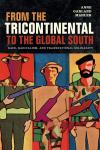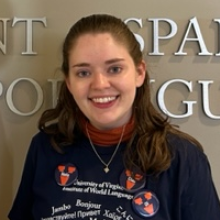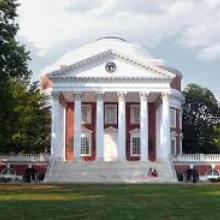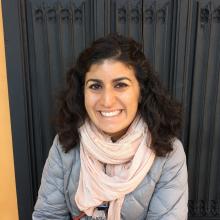
Susan Shoshan Abraham
Education
Ph.D. Spanish, University of Virginia (in progress)
M.A. Romance Languages and Literatures (Spanish), University of Michigan (2016)
B.A. Hispanic Studies & Environmental Studies, Illinois Wesleyan University (2008)
Research Interests
- Early Modern Iberian literature
- Morisco textual production
- Poetic and didactic narratives
- Mediterranean Studies
- North African Studies
- Islamic Theology
Research Project
My research focuses on representations and discussions of truth, falsehood, and authority in early modern (namely seventeenth-century) Morisco textual production. The central question I explore is what this preoccupation with truth and authority reveals about the symbolic function of Morisco manuals of faith and the ways their creators thought, taught, and imagined their history in the midst of their exile. My work tackles these epistemological questions through a framework and methodology that combines medieval Islamic and Christian rhetoric, as well as current theoretical debates in literary, religious, and Mediterranean studies.
H. Manuel Acevedo-Reyes
https://macevedo-reyes.youcanbook.me/
Education
2026 PhD in Spanish, University of Virginia. (in progress)
Graduate Certificate in Women, Gender and Sexuality
Graduate Certificate in Environmental Humanities
Graduate Certificate in American Studies
2022 MA in Spanish, University of Virginia.
2020 MA in Hispanic Literature and Culture, Indiana University.
2019 MA in Curriculum, Assessment and Instruction, Stockton University.
2016 BAs in Spanish and Teacher Education, Stockton University.
2014 AA in Secondary Education, Atlantic Cape Community College.
Areas of Research and Teaching
Caribbean Literature and Culture Latinx Literature and Culture Pornography Studies
Queer and Trans in the Americas Latin American Literature Feminist Theory
Environmental Humanities Racialized Sexualities Film Theory
Publications
BOOK REVIEWS
2021 Review of Translocas: The Politics of Puerto Rican Drag and Trans Performance by Lawrence La Fountain-Stokes, University of Michigan Press, 2020. In Anthurium: A Caribbean Studies Journal, V. 17, I. 1, 2021.
TRANSLATIONS
2021 Translated “La vida después de la muerte de Giuseppe Campuzano” by Malú Machuca Rose. In TSQ*Now, 2021.
2021 Translated “Introducción del Editor General” by Francisco Galarte. In TSQ*Now, 2021
Conference Presentations
2023 “Cuir Ecological Futures in La mucama de Omicunlé.” Environmental Humanities Symposium. University of Virginia, March 30th.
2023 “Literature and the Environment in La mucama de Omicunlé.” Diálogos XX. Indiana University, February 25th.
Invited Talks
2021 “Implementing Peer Review to Correct Common Grammar Errors in a Second-Language Context.” Institute of World Languages Roundtable. Organizer: Emily Scida. University of Virginia, November 11th.
2021 “Queer Puerto Rican Sexualities.” Queer Theory and Cultural Production in the Américas. Organizer: Cole Rizki. University of Virginia, October 7th.
2019 “Action Research: Defining Your Topic.” Methods of Teaching College Spanish. Organizer: Laura Gurzynski-Weiss. Co-Presenter: Madison Wray. Indiana University, September 30th.
2018 “Implementing Classroom Management Plans to Increase Engagement in Urban World Language Classroom.” Graduate Research Symposium. Stockton University, April 25th.
Teaching Experience
UNIVERSITY OF VIRGINIA
Department of Spanish, Italian, and Portuguese
Texts and Interpretation (Fall 2023).
Introduction to Hispanic Cultures (Summer Language Institute: 2022 and 2023).
Grammar and Composition I (2022-2023).
Intermediate Spanish I (2021-2022).
INDIANA UNIVERSITY
Department of Spanish and Portuguese
Second-Year Spanish II (Spring 2020).
Second-Year Spanish I (Fall 2019).
Intensive First-Year Spanish (2018-2019).
Spanish Language Immersion Camp (Summer 2019).
SPEAK! LANGUAGE CENTER
Spanish for Medical Professionals (Spring 2023 and Summer 2023).
Spanish for Educators (Spring 2022 and Summer 2022).
K-12 TEACHING
World Language Teacher (K-8), Bridgeton Public Schools (2017-2018).
Spanish Teaching Practicum (K-5, 6-8), Pleasantville Public Schools (S2016-F2016).
Spanish Teaching Practicum (9-12), Atlantic City Public Schools (Fall 2015).
Honors, Grants, and Fellowships
UNIVERSITY OF VIRGINIA
2023 Graduate Instructor Seminar in the Teaching of Writing.
2023 Graduate Global Research.
2023 Arts, Humanities, and Social Sciences Summer Research Award.
2023 The Charles Gordon Reid Summer Travel Fellowship.
2022 Summer Research Fellowship.
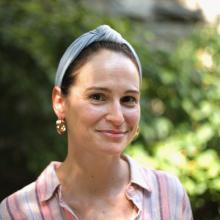
Lorena Albert Ferrando
Lorena Albert Ferrando’s research lies in the intersection of philology, linguistics, and historiography in Spain and in the Americas. She is particularly interested in language ideologies and in the history of Spanish language teaching in the United States and in Latin America.
Her dissertation “El hispanismo recíproco: campo académico, construcción nacional y relaciones internacionales entre España y América (1898-1918)” analyses the consolidation of the academic field both in Spain and in America as a bidirectional process and via the analysis of three cultural practices connected to language. Lorena Albert Ferrando received her Ph.D. from the interdisciplinary Spanish: Linguistics, Literature and Communication program at Spain’s University of Valladolid (2023). She also holds a master’s in teacher training in compulsory secondary and upper secondary school education, vocational training and languages from the University of Zaragoza (2017), a master’s in teaching Spanish as a second language from the International University Menéndez Pelayo-Cervantes Institute (2012) and an M.Phil. in Hispanic and Luso-Brazilian languages and literatures from The Graduate Center, CUNY (2005).
For over 20 years, she has taught Spanish language and culture at U.S. and European institutions, including the University of Florida, Princeton University, New York University, International University Menéndez Pelayo, and the University of St Andrews. Albert Ferrando also has taught Spanish as a second language to immigrants and refugees in Spain.
Her work has been published in Nueva Revista de Filología Hispánica (2023) and Hispania (2019).
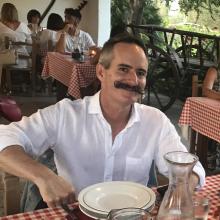
Samuel Amago
Research Summary
I teach courses on modern and contemporary Spanish literary history, cinema, comics, and culture. From 2019-2022, I served as Chair of the Department of Spanish, Italian and Portuguese at UVA. I am a former Chair of the Department of Romance Studies and Bowman and Gordon Gray Distinguished Term Professor of Spanish at the University of North Carolina at Chapel Hill. From 2003 to 2010 I taught at the University of Notre Dame, where I served as Associate Professor of Spanish. In an administrative capacity, I was a fellow in the University of Virginia's Leadership in Academic Matters Program (2021) and the Chairs Leadership Program at UNC-Chapel Hill (2018).
My current scholarship centers on waste and space, memory and modernity in post-dictatorship Spanish cultural production, including photography, documentary, narrative, comics, film and television.
Click here to read a short entry on basura / trash / waste, which is part of the collective Constellation of the Commons.
Click here to listen to a podcast on trash, aesthetics, and Spanish film of the post-Franco era.
Click here to follow me on Twitter.
Publications
Books
Basura: Cultures of Waste in Contemporary Spain. University of Virginia Press, 2021. Winner of the 32nd Katherine Singer Kovacs Prize for an outstanding book published in English or Spanish in the field of Latin American and Spanish literatures and cultures.
Spanish Cinema in the Global Context: Film on Film. New York: Routledge, 2013.
True Lies: Narrative Self-Consciousness in the Contemporary Spanish Novel. Lewisburg: Bucknell University Press, 2006.
Consequential Art: Comics Culture in Contemporary Spain. Co-edited with Matthew Marr. U of Toronto Press, 2019.
Vademécum del cine Iberoamericano: Métodos y Teorías. Co-edited with Eugenia Afinoguénova and Kathryn Everly. Hispanófila 177 (2016)
Unearthing Franco’s Legacy: Mass Graves and the Recovery of Historical Memory in Spain. Co-edited with Carlos Jerez-Farrán. U of Notre Dame Press, 2010.

Andrew Anderson
Research Summary
Andrew A. Anderson is Professor of Spanish in the Department of Spanish, Italian and Portuguese. He holds a B.A., M.A. and D.Phil. from Oxford University. Before coming to Virginia, he taught at Oxford University and the University of Michigan. Specializing in later nineteenth-century and twentieth-century Peninsular literature, his research is principally concerned with Spanish poetry and theatre from the 1890s through to the 1930s, as well as literature and film of the Spanish Civil War.
Professor Anderson has published fourteen books and critical editions of Spanish literature, over seventy articles and book chapters, twenty-five bibliographies and fifty book reviews, and he has lectured extensively in the U.S., Canada, Mexico, England, Scotland, France, and Spain. In 1995 he was awarded the Excellence in Research Award, and in 2000 the Michigan Humanities Award, both by the University of Michigan; in 1996-2000 he held an Honorary Research Fellowship at the Centre for the Study of the Hispanic Avant-Garde (University of Aberdeen); and he has received grants for his research from the British Academy, the American Philosophical Society and the Spanish Ministry of Culture.
Professor Anderson’s recent publications span such topics as nineteenth- and twentieth-century Spanish narrative, García Lorca’s poetry, Futurism, theatre production in the 1920s, Salvador Dalí, etc. He published the first critical edition of the original manuscript of Lorca’s Poeta en Nueva York in 2013. His book concerned with the origins and foundation of the Spanish historical avant-garde movement Ultraísmo was published in 2017, while his most recent monograph documents and analyses the reception of Cubism, Futurism, and Dada in Spain in the 1910s and 20s. A complete list of his publications is available here List of publications
Education
D.Phil., Oxford University
M.A., Oxford University
B.A., Oxford University
Publications
Recent Books
La recepción de las vanguardias extranjeras en España: cubismo, futurismo, dadá. Estudio y ensayo de bibliografía (Sevilla: Renacimiento, 2018).
El momento ultraísta. Orígenes, fundación y lanzamiento de un movimiento de vanguardia (Madrid/Frankfurt: Iberoamericana/Vervuert, 2017).
Federico García Lorca en Nueva York y La Habana. Cartas y recuerdos, jointly authored with Christopher Maurer (Barcelona: Galaxia Gutenberg, 2013).
Federico García Lorca, Poeta en Nueva York, edición del original (Barcelona: Galaxia Gutenberg, 2013).
Ernesto Giménez Caballero: The Vanguard Years (1921-1931) (Newark, DE: Juan de la Cuesta, 2011).
El veintisiete en tela de juicio. Examen de la historiografía generacional y replanteamiento de la vanguardia histórica española (Madrid: Gredos, 2005).
Recent Articles
“Undecidability in Lorca’s Amor de don Perlimplín con Belisa en su jardín,” Hispanic Studies Review, 3 (2018), 1-13.
“La breve moda de la poesía visual en las revistas del Ultra,” in Laboratorios de lo nuevo. Revistas literarias y culturales de México, España y el Río de la Plata en la década de 1920, ed. Rose Corral, Anthony Stanton, & James Valender (Mexico City: El Colegio de México, 2018), pp. 57-87.
“La trayectoria de Poeta en Nueva York a través de sus traductores estadounidenses: Humphries, Belitt, Simon/White y después,” in El impacto de la metrópolis. La experiencia americana en Lorca, Dalí y Buñuel, ed. José M. del Pino (Frankfurt/Madrid: Vervuert/Iberoamericana, 2018), pp. 93-115.
“La colaboración teatral Ricardo Baeza–Mimí Aguglia (1926),” Anales de la Literatura Española Contemporánea, 42 (2017), 817-840.
"Lorca’s ‘Cielo vivo,’ the Other Lake Eden Poem,” Symposium, 71 (2017), 28-47.
“Approaching Lorca’s Viaje a la luna: Structural Patterns, Symbolic Concatenation, and El público,” Hispanic Review, 85 (2017), 1-21.
“Diván del Tamarit,” Poéticas. Revista de Estudios Literarios, 2, no. 2 (2016), 5-25.
“Picture in Picture: Interpolation and Framing, Past and Present in David Trueba’s Soldados de Salamina,” Hispanic Research Journal, 17 (2016), 152-167.
“Necessary Sacrifices: From Romanticism to Naturalism in Galdós’s Marianela,” Bulletin of Spanish Studies, 92 (2015), 907-929.
“Paysage d’Âme and Objective Correlative: Tradition and Innovation in Cernuda, Alberti, and García Lorca,” Modern Language Review, 110 (2015), 166-183.
“The Idiosyncratic Narrator in Javier Cercas’s Soldados de Salamina,” Neophilologus, 98 (2014), 599-615.
“Futurism in Spain: Research Trends and Recent Contributions,” International Yearbook of Futurism Studies, 3, Special Issue on Iberian Futurisms (2013), 21-42.
“‘Yo me froto las narices con las truchas del mar Rojo’: la poesía ultraísta de César González-Ruano,” Salina, 24 (2010) [pub. 2012], 45-56.
“Narrative Structure and Epistemological Uncertainty in Carmen Laforet’s Nada,” Bulletin of Spanish Studies, 88 (2011), 541-561.
“Concha’s Raven Locks: Narration, Motive and Character in Valle-Inclán’s Sonata de otoño,” Bulletin of Hispanic Studies, 88 (2011), 437-454.
“Sex, Flippancy, Autobiography: Existential Palliatives in Valle-Inclán’s Sonatas,” Hispanic Review, 78 (2010), 387-409.
“The Travel Guide as Avant-Garde Soapbox: Ernesto Giménez Caballero’s Trabalenguas sobre España,” Hispanic Research Journal, 11 (2010), 241-258.
“Andrea’s Baggage: Reading (in) Laforet’s Nada,” Romance Quarterly, 57 (2010), 16-27.
“América y la construcción crítica de la ‘Generación del ’27,’” in Actas del Congreso Internacional “El 27 en América,” ed. Joaquín Roses (Córdoba: Diputación de Córdoba–Delegación de Cultura, 2010), pp. 73-100.
Grants & Awards
Research Award, Spanish Ministry of Culture
Research Grant, American Philosophical Society
Research Grant, British Academy
Honorary Research Fellowship at the Centre for the Study of the Hispanic Avant-Garde (University of Aberdeen) (1996-2000)
Michigan Humanities Award, University of Michigan (2000)
Excellence in Research Award, University of Michigan (1995)
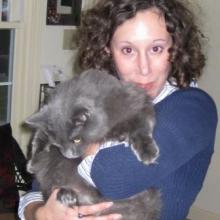
Sarah Annunziato
Education
Ph.D.: The Johns Hopkins University, Italian, Department of German and Romance Languages and Literatures (2007)
B.A.: Smith College, Italian and Government, Cum Laude, Department of Italian Languages and Literatures and Department of Government (2000)
Research Interests
- Italian Children’s Literature, Media, and the History of Childhood in Italy
- Film Adaptation and Italian Cinema and Television
- Italian American Studies
- Italian-Language Pedagogy
Teaching
University of Virginia
Graduate:
- Dante’s Inferno on Film
- Italian Crime Fiction
- Giovanni Verga: Dal Verismo al Neorealismo
- I Promessi Sposi Oggi
- Tempi di Guerra: Representations of World War II in Italian Culture
- Filmmaking by the Book: Literary Adaptation and the Italian Cinematic Tradition
Undergraduate:
- Elementary Italian I
- Intermediate Italian I & II
- Neorealism Around the World: Italy and Global Film
- Growing Up Italian-Style: Children’s Literature
- Italian Political Thinkers
- Italian Mystery Novels
- Gothic Florence
- Italian-American Cinema
- Law and Order in Italy
- The Art of Writing Fiction (creative writing in Italian)
- Mafiosi vs. Goodfellas (comparative cinema)
- Frenemies? Italy and the U.S., Cross-Cultural Perspectives
- Italian History and Culture Through Film
College of William & Mary
- Elementary Italian I and II
- Intermediate Italian I and II
- Foreign Language Teaching Practicum (Team Taught)
- Italian Language Through Film
- Upper Intermediate Conversation and Composition
Graduate Advising
MA Theses:
Jacob J. Shirley, The Lost Boys of Italia: Scioltezza and Peter Pan Syndrome in Calvino’s Males, 2014-2015.
Alicia Mi Persson, Kim Ki-duk: Reflections of Reality and Fantasy, 2012-2013.
Service
University of Virginia
Faculty Coordinator and Language Program Director, 1000-2000 level ITAL courses, 2016-present.
Editor: La Vendemmia, The Newsletter of the Italian Studies Program at The University of Virginia.
Organizer of Italian Studies Cineforum.
Language Judge, Dolcissimo: Speak the Sweet Life.
Moons and Bonfires: An Archive of Italian-American History. ITTR 3559: Italian American Cinema. Web.
College of William & Mary
Faculty Advisor, La casa italiana, Department of Modern Languages and Literatures, 2006-2011.
Teaching Assistant Supervision, Department of Modern Languages and Literatures, 2007-2011.
Publications
Articles
"Lions and Tigers and Piracy! Colonialism in Two Versions of Emilio Salgari's Sandokan." Tradition and the Individual Text: Essays in Memory of Pier Massimo Forni. Modern Language Notes. 34 Supplement (2019): S286-302.
“Discomfort Food: Food, Anxiety, and Panic in Italian American Mafia Films and Television Shows.” VIA: Voices in Italian Americana. 28:1 (2017): 15-29.
“Guest-Starring Dante Alighieri: References to Inferno on American Television.” Americana: The Journal of American Popular Culture, 1900-Present. 15.1 (Spring 2016).
“Targeting the Parents Through the Children in the Golden Age of Italian TV Advertising: The Case of Carosello.” Co-authored with Francesco Fiumara. Journal of Italian Cinema and Media Studies. 3.1-2. (March 2015): 11-26.
“A Child’s Eye View of Where the Wild Things Are: Lessons from Spike Jonze’s Film Adaptation of Maurice Sendak’s Picture Book.” Journal of Children and Media. 8.3. (June 2014): 253-266.
“The Amanda Knox Case: The Representation of Italy in American Media Coverage.” The Historical Journal of Film, Radio and Television. 31.1. (March 2011): 61-77.
“Diavoli della Casa? Storie di Isterismo in Cinque Romanzi Italiani.” Rivista di Studi Italiani. 28.2. (December 2010): 66-72.
Book Chapters
“A Woman.” Italian Literature and Its Times. World Literature and Its Times. Vol. 7. Ed. Joyce Moss. Detroit: Thomson Gale, 2005. 483-491.
“We Won’t Pay.” Italian Literature and Its Times. World Literature and Its Times. Vol. 7. Ed. Joyce Moss. Detroit: Thomson Gale, 2005. 473-481.
Book Reviews
Tre in treno per Europa (e un pollo). Directed by Emanuela Piovano. The Journal of Italian Cinema and Media Studies. 8.1 (2019): 126-127.
Media Technology: What Makes it ‘Addictive?’ Dir. Anthony Cristiano. Reviewed in The Journal of Italian Cinema and Media Studies. 4.3 (2016): 463-465.
The Transatlantic Gaze: Italian Cinema American Film. Mary Ann McDonald Carolan. Reviewed in The Journal of Transatlantic Studies. 13.3 (2016): 309-310.
Approaches to Teaching Collodi’s Pinocchio and Its Adaptations. Ed. Michael Sherberg. Reviewed in Annali d’italianistica. 5 (2007): 492.
Presentations
"New Writing Assignments for Language, Film, and Composition Courses," (Co-presenters Dr. Rachel Geer, Dr Alicia Lopez-Opere, and Ms. Zaida Villanueva), Roundtable Series on Language Teaching and Learning, The Institute of World Languages at The University of Virginia, Charlottesville, VA, November 15, 2019.
"All Aboard La freccia azzurra: An Exploration of Class Differences in Gianni Rodari's Holiday Classic." 2019 Children's Literature Association Conference, Indianapolis, IN, June 2019.
“Is Fantaghirò Another Disney Princess,” Through Their Gazes: Screening Women and Feminism, Charlottesville, VA, March 16, 2018.
“The Good Witch of the South: Tomie dePaola’s Strega Nona and the Tradition of Female Healers in Italian American Communities,” Italian American Studies Association Annual Conference, Washington DC, November 2017.
“America as a Symbol of the Future in the Novels of Emilio Salgari,” Children’s Literature Association 2017, Tampa FL, June 2017.
“The Talented Mr. Ripley: A Scenic and Murderous Tour of Italy,” American Association for Italian Studies Annual Conference, Baton Rouge, LA, April 2016.
“Reazione a Catena: Improving Italian Fluency Through Television,” Kentucky Foreign Language Conference, Lexington, KY, April 2014.
“Sex, Lies, and Stereotypes: Images of Italy in American Media Coverage of the Amanda Knox Case,” Lecture, Southeastern Louisiana University, Hammond, LA, March 12, 2014.
“Dante in Primetime: References to Dante’s Inferno on American Television,” Dante Here and Now, High and Low, Institute of the Humanities and Global Cultures at the University of Virginia, Charlottesville, VA, January 2014.
“‘Alla Fine dei Corsi, Tutti al Mare:’ Teaching with Carosello,” American Council on the Teaching of Foreign Languages Annual Convention and World Languages Expo, Philadelphia, PA, November 2012.
“Awakening the Language Instinct: Supporting Students with Language Learning Disabilities,”
American Council on the Teaching of Foreign Languages Annual Convention and World Languages Expo, Boston, MA, November 2010.
“Magical Puppets and Friendly Dragons: Important Moments in Italian Children’s Literature,” Lecture, Seton Hall University, South Orange, NJ, October 27, 2009.
“Favole al Telefonino: How Claudio Rinaldi’s L’arcobaleno delle favole Reflects Major 20 th - Century Innovations in Children’s Education in Italy,” 81 st Annual South Atlantic Modern Language Association Convention, Atlanta, GA, November 2009.
“Bringing Italy Home: Life in an Italian-Speaking Dormitory,” 80 th Annual South Atlantic Modern Language Association Convention, Louisville, KY, November 2008.
“Autobiography and Adaptation in Disney’s The Adventures of Pinocchio,” AATI Annual Conference, Washington DC, October 2005.
Grants & Awards
2017-2018: Faculty Course Enhancement and Development Grant (co-recipient: Dr. Francesca Calamita), The Institute for World Languages at The University of Virginia.
2017: Grant Team Member, A Gendered Wor(l)d, led by Dr. Francesca Calamita. The Institute for World Languages at The University of Virginia.
2016-2017: Grant Team Member, Dolcissimo: Speak the Sweet Life, led by Dr. Francesca Calamita. The Institute for World Languages at The University of Virginia.
2000-2001: Singleton Fellowship, Johns Hopkins University.
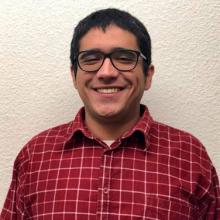
Patricio Arriagada Soto
Education
Ph.D. Spanish, University of Virginia (in progress).
M.A. Spanish, University of Wyoming.
B.A. Spanish Language and Literature, Pontificia Universidad Católica de Valparaíso.
Research Interests
I am interested in researching Chilean poetry of the 20th century, contemporary Chilean sociocultural and historical narratives, and aesthetic criticisms of contemporary thought and culture. Furthermore, I am very interested in discourse analysis, especially in the area of textual linguistics. I have collaborated in research related to automatic text processing, especially creating taxonomies that facilitate the recognition and classification of named entities.
Research Assistant in Computational Linguistics
- Tecling Project, Viña del Mar, Chile. 2014-2019
- Implemented testing for Personas, Organizaciones, y Lugar (POL) web app available in http://tecling.com/index.php?l=software
Master of Arts Thesis Work:
- "Multisemiotic Artifacts, Rupturism, and Counterculture: Cultural Archive from Parrian Antipoetry to Vaporwave." University of Wyoming, May of 2021.
Bachelor of Arts Thesis Works:
- "Retrocapitalism: Multisemiotic proposal for a literary-aesthetic analysis of Chilean post-capitalist society through the corpus "Odio a Puente Alto" (José Ángel Cuevas), Mano de obra & Sumar (Diamela Eltit)." Pontificia Universidad Católica de Valparaíso, December of 2018.
- "Analysis and classification of proper nouns in geopolitical articles extracted from Le Monde Diplomatique's magazine: an approach from the text grammar." Pontificia Universidad Católica de Valparaíso, December of 2015.
Publications
Co-Published: Nazar, R.; Arriagada, P. (2017). “POL: un nuevo sistema para la detección y clasificación de nombres propios.” Procesamiento del Lenguaje Natural, n. 58, pp. 13-20.
Review: Arriagada Soto, Patricio. “Review of ‘Tras las huellas de Pablo Neruda: Un homenaje a Hernán Loyola,’ by Greg Dawes, editor.” Hispania, vol. 6, Fall 2021, Submitted.
Review: Arriagada Soto, Patricio. "Review of 'Vidas. Deep in Mexico and Spain,' by Edward Stanton, author." Hispania, vol. 7, Spring 2021, Submitted.
Conference Presentations
Rocky Mountain Modern Language Association | University of Texas, El Paso | October 2019
Presentation: "Monitoring of New Drug Names Based on the Detection of Contextual Elements in Spanish"
Institute of Literature and Science of Language | PUCV, Viña del Mar | December 2018
Poster Presentation: “Clasificación Automática de Tipos de Entidad Mediante Relaciones de Hiperonimia y Elementos Cotextuales”
Automatized Processing of Texts and Corpora Workshop | PUCV, Viña del Mar | November 2016
Poster Presentation: “Clasificación automática de Nombres Propios Utilizando Pistas Cotextuales”
Teaching
I Taught Spanish classes at the University of Wyoming for Spanish minors and majors. Courses included 1010, 1020, 2030, and 2040 students' first and second years at UW.
Honors & Awards
Scholarship Recipient | Dean's Graduate Scholars by the College of Arts and Sciences at the University of Wyoming. September 2019
Honorary Member | Sigma Delta Pi (National Hispanic Honorary Society). October 2019 – Present
UW Chapter
Alumni member | Fundación para el Progreso, a subsidiary of Atlas Network
Professional Affiliations
Rocky Mountain Modern Language Association (RMMLA)
American Association of Teachers of Spanish and Portuguese (AATSP)
Memory Studies Association (MSA)

Germain Badang
I was born in Cameroon and have lived in several countries for the last 28 years. My journeys have enriched my understanding of cross-cultural experiences and have prepared me to deal with the challenges induced by our globalized world with critical and constructive regard. I have had the opportunity to study and live in Cameroon, Spain, Italy, France, Mexico, and the USA. I got my bachelor's degree in Spanish literature at Université de Yaoundé-Cameroon. I have several Masters in Spanish philology, Spanish phonology and sociolinguistics, and Second Language Acquisition, obtained from Universidad de Salamanca and The Ohio State University. I received a Ph.D. in Social Studies and Global Education from OSU. I am passionate about teaching and helping every student succeed. I like traveling, doing amateur theater, and cooking.
–My research interest includes Teachers' decision-making, knowledge, power, teachers' global competency, post-colonialism, and social/global discourse, and most recently, the challenges of distance learning in a language class.

Jennifer Barlow
Education
Ph.D. Spanish University of Virginia
Dissertation: “Iberian Daughters of Sappho: Female Friendship in Early Modern Spain”
M.A. Spanish University of Virginia
Thesis: “Checkmate: The Gifting Game and Gender Performance Anxiety in Lope de Vega’s La Dorotea”
B.A. Spanish University of Virginia
With highest distinction, Study abroad: Valenci
Teaching Experience
Lecturer University of Virginia Fall 2021 - present
Lecturer Longwood University Fall 2016 – Spring 2021
Visiting Assistant Professor Wake Forest University Fall 2015 – Spring 2016
Publications
Articles
Barlow, Jennifer E. “Love and War: Male Friendship and the Performance of Masculinity in the Poetry of Garcilaso de la Vega (1501-1536).” Bulletin of Hispanic Studies 95.4 (2018): 383-98.
Barlow, Jennifer E. “Checkmate: The Gifting Game and Gender Performance Anxiety in Lope de Vega’s La Dorotea.” Hispanic Review 81.3 (2013): 245-62.
Book chapters
Barlow, Jennifer E. “Staging Friendship and the Female Body Politic in Early Modern Spanish Theater" in Male and Female Friendship: Writing and Staging Friendship in 17th and 18th Century Spanish literature", eds. Claudia Gronemann and Agnieszka Komorowska. Leiden: Brill, 2020. (Forthcoming)
Book Reviews
Martí, Sacramento. Misoginia y percepción de la mujer en clásicos de la literatura española. Newark, DE; Juan de la Cuesta. 2015. Bulletin of Spanish Studies. 95.6 (2018): 723-24.
Eds. Baranda Leturio, Nieves; Marín Pina, and M.ª Carmen. Letras en la celda: cultura escrita de los conventos femeninos en la España moderna. Madrid: Iberoamericana de Libros y Ediciones, 2014. Sixteenth Century Journal 47.3 (2016): 749-51.
Editorial duties
Guest editor, Miríada Hispánica. Special Number: “Número monográfico en homenaje a la profesora Alison Weber” 16 (2018); includes “La pluma dorada: Estudios en homenaje a Alison Weber,” 11-13.
Translation
Gómez Moreno, Ángel. “The Challenges of Historiography. The Theatre in Medieval Spain.” Trans. Jennifer E. Barlow. A History of Theater in Spain. Ed. Maria M. Delgado and David T. Gies. Cambridge: Cambridge UP, 2012. 18-35.
Selected Conference Presentations
November 2019 “‘Les es dulce servir y sufrir a los prójimos’: Friendship and the Christian Stoic Body in Baltasar Álvarez’s Escritos espirituales.” Sixteenth Century Studies Conference, St. Louis.
November 2018 “Disembodied Friendship: Death, Apparitions, and the Holy Female Body in the Discalced Carmelite Convent.” Sixteenth Century Studies Conference, Albuquerque.
June 2018 “Staging the Body Politic: Male Friendship and Honor in Calderón's A secreto agravio, secreta venganza.” Asociación de Profesionales Hispanos en Estados Unidos, Charlottesville.
October 2017 “Teresa of Avila, Friendship, and the Holy Female Body.” Sixteenth Century Studies Conference, Milwaukee.
Panels organized and chaired
October 2012-17 Panel organizer and chair for Sixteenth-Century Studies Conference.
March 2012 Panel chair for Renaissance Society of America Conference, Washington D.C.
Awards and Fellowships
2017 Blackwell Scholar, Longwood University
2014 University of Virginia Three Minute Thesis Finalist
2014 Nora Zeale Hurston Essay Contest, Honorable Mention
2014-2015 Society of Fellows Dissertation Fellowship
2014 Society of Fellows Summer Travel Fellowship
2013-2014 Virginia Society of Fellows, Junior Fellow
2013, 2010 Robert J. Huskey Travel Fellowship
2012 Society for the Study of Early Modern Women Graduate Travel Award
2011 Del Greco Graduate Student Essay Prize
2009-2013 University of Virginia Presidential Fellow
2009 Phi Beta Kappa
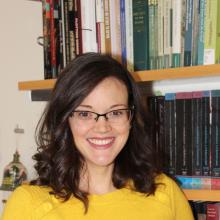
Allison Bigelow
Research Summary
Education
Publications
- Winner of the 2022 Philip J. Pauly Prize in the History of Science of the Americas (History of Science Society)
- Winner of the 2021 James A. Rawley Prize in Atlantic History (American Historical Association)
- Winner of the 2021 Modern Language Association Prize for a First Book
- Honorable Mention, 2021 Howard F. Cline Memorial Award in Ethnohistory (Conference on Latin American History)
-
Choice Outstanding Academic Title (2022, American Library Association)
-
Winner of the award for best article by a senior scholar (Latin American Studies Association-Colonial Section)
With Thomas Miller Klubock, "Latin American Studies and the Humanities: One Year Later." Latin American Research Review 54.4 (2019): 970-1022. Essays by Hugh Cagle, Jason Oliver Chang, and Eileen J. Findlay.
With Thomas Miller Klubock, "Latin American Studies and the Humanities: Past, Present, Future.” Latin American Research Review 53.3 (2018): 573-626. Essays by Karin Rosemblatt, Jafte Dilean Robles Lomeli and Joanne Rappaport, and Arturo Arias.
“Graduate Education and Professional Development in the MLA Forums.” Profession (Winter 2020). 2,400 words.
"Teaching Colonial Translations Through Archives: From Ink and Quill to XML (Or Not)." Journal of Interactive Technology and Pedagogy. Special Issue: Teaching and Researching with Archives, edited by Danica Savonik, Jojo Karlin, and Stephen Klein 14 (2019).
Allison Bigelow, Vivienne Westbrook, Daniel Carey, Carlo M. Bajetta, Mark Nicholls, Gordon Braden, Catherine Bates, Judith Owens, Claire Jowitt, Thomas Herron, Nicholas Popper, Eric Klingelhofer, Willy Maley, “Ralegh at 400,” Spenser Review 48.3 (Fall 2018).
Selected Digital Projects & Student Collaborations
Multepal Project. (Spring 2017-present). Current focus: collaborating with K'iche', Q'eqchi', Tz'utujil, and Yukatek Maya scholars who work independently and at the Universidad de Oriente (Yucatán, México) and Universidad Rafael Landívar (Antigua, Guatemala). Repository of work available here.
* Supported by: National Science Foundation-National Endowment for the Humanities Documenting Language Infrastructure-Documenting Endangered Languages ($249,101, 2022-2024); 3C Seed Grant from the Vice President for Research ($60,000, 2021-2022); Center for Global Inquiry and Innovation ($15,000, 2020-2021); Mellon Indigenous Arts Initiative ($1,500, Fall 2020); Mapping Indigenous Worlds Lab ($3,000; Summer 2020); Office of Undergraduate Research (student researcher, 2018-present); Mellon Indigenous Arts Initiative (course buyout, 2018-2019); Americas Center/Centro de las Américas ($2,000, 2017-2019).
"Bilingual and Intercultural Education in Guatemala." Independent Study (SPAN 4993, Summer 2021) to translate Aj Xol Héctor Rolando's B'ich Q'eqchi' (Canto Q'eqchi') from Spanish to English. With Mason Courter and Candies Taramona.
“Recreating the Archive.” Faculty Global Research with Undergraduate Students (Center for Global Inquiry and Innovation; with Rebecca Graham, CLAS 2017).
Podcast: “The Science of Colonial Silver: Rethinking the History of Mining and Metallurgy in the Early Americas.” History Hub: Kingdom, Empire, and Plus Ultra (University College Dublin), 8 August 2016.
Guest editor, Early Americas Digital Archive. Eleven digital critical editions of colonial-era texts translated, transcribed, and annotated by undergraduate and graduate students at UVa and William & Mary.
Wikipedia editor, “Literatura indígena” (SPAN 4500, Spring 2016). Students could choose to write seminar papers (individually) or Wikipedia pages (in groups) about indigenous literatures and cultures. Projects include: deities from Mesoamerica and the Andes; musical traditions of the Suyá people of Brasil; spiritual practices of the Achuar people of Ecuador; Nahua writer Hernando de Alvarado Tezozómoc; León Portilla’s Visión de los vencidos; modern retellings of Guaman Poma.
Selected Grants & Awards (2018-2023)
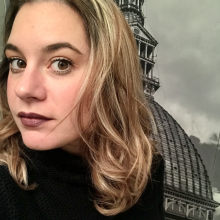
Nicole Bonino
Education
Ph.D. University of Virginia (USA), Spanish (focus on Latin American Studies), 2020
M.A. University of Virginia (USA), Spanish, 2016
M.A. University of Turin (Italy), Comparative Literatures and Cultures, 2013
B.A. University of Turin (Italy), Comparative Literatures and Cultures, 2011
Harvard University (USA), Certificate in Afro-Latin American Studies
Research Interests
Migratory Mobilities and Diaspora Studies
Latin American and Italian Studies
Visual Arts and Literature
Eco-Migration and Environmental Humanities
Research Appointments
Columbia University (USA), Research Fellow, Institute of Latin American Studies
University of Manchester (UK), Research Fellow, Center for Latin American Studies
Teaching
University of Virginia (USA), 2014 – present
Spanish 3300 (“Hispanic Migration in Literature and Visual Arts”)
Italian 3559 (“Italy in Migration: Media, Literature, and Visual Arts”)
Spanish 3300 (Introduction to Literature)
Spanish 3010 (Academic Writing and Composition)
Spanish 2020 (Advanced Spanish Grammar and Culture)
Italian 2020 (Advanced Italian Grammar and Culture with focus on language and diversity)
Spanish 2010 (Intermediate Spanish Grammar and Culture, J-Term 2019)
Italian 2010 (Intermediate Italian Grammar and Culture)
Italian 1020 (Elementary-Intermediate Italian Grammar and Culture)
Italian 1010 (Elementary Italian Grammar and Culture)
University of Virginia in Valencia, Study Abroad Program (Spain), 2017, 2018
Spanish 3030 (“Hispanic Culture in Cinema and Visual Arts”)
Spanish 2020 (Advanced Spanish Grammar and Culture)
Spanish 2010 (Intermediate Spanish Grammar and Culture)
Publications
Bonino, Nicole. “The Socio-Environmental Implications of Informality in Antonio Berni’s Xilo-Collage ‘Inundación en el barrio de Juanito’” (Forthcoming in Bulletin of Contemporary Hispanic Studies, Spring 2024)
Bonino, Nicole. “Trazando caminos: Retratística afroargentina como archivo de memoria e instrumento de visibilización.” Perspectivas Afro. Revista de investigaciones en estudios afrolatinoamericanos y afrocaribeños, 3.1 (2023): 135-152
Bonino, Nicole and Hiromi Kaneda. “Reclaiming Identity: The Cinematic Activist Journey of Afro- Argentinian Director Wisny Dorce and His Film Production Company ‘Black Existencia Films’: Interview with Wisny Dorce.” Framework. The Journal of Cinema and Media, 64.1 (2023): 180-191
Bonino, Nicole. “Más allá del conflicto: matices ecocríticos en ‘A la deriva’ por Horacio Quiroga.” Chasqui. Revista de literatura latinoamericana, 51.1 (2022): 135-152
Bonino, Nicole. “Hibridismo literario y naturalismo criollo: el caso de Antonio Argerich.” El Cid, 31 (2021): 7-13 (winner of the Del Greco Essay Prize)
Bonino, Nicole. “Villa Miseria también es América: Resistance and Resilience in Argentinian Slums During the Covid-19 Pandemic.” Spanish and Portuguese Review, 6 (2020): 9-21
Bonino, Nicole. “Génova-Buenos Aires: paisaje oceánico y migración en Sull’Oceano (1889) de Edmondo De Amicis.” Exégesis, 3 (2020): 93-107
Bonino, Nicole. “Colombia no tiene quien la cure: el discurso médico en El coronel no tiene quien le escriba (1958-61) de Gabriel García Márquez.” Hispanófila. Ensayos de literatura, 184 (2018): 69-83
Bonino, Nicole. “Migración y ecocrítica: paisajes urbanos en la literatura ítalo-argentina.” In La cosa nostra: estudios lingüístico-literarios sobre la inmigración italiana en Argentina, edited by Augusto Lorenzino. Buenos Aires: Editorial Dunken (2019): 11-29 (Invited Article)
Bonino, Nicole, and Stella Mattioli. “Keeping up with Social Changes in Second Language Acquisition.” Drive-Thru Pedagogy, Studio for Teaching and Learning Innovation, College of William and Mary, March 2022 (Public writing)
Bonino, Nicole. “Covid-19 and the City: Visual Art, Social Media, and Performance in a Locked-down Buenos Aires.” Global COVIDiaries, University of Virginia, May 2020 (Public writing)
Bonino, Nicole. “Coastal Futures Conservatory Open Lab: Bridging Science, Art, and Community.” Environmental Humanities at UVA, University of Virginia, September 2019 (Public writing)
Full CV available at: https://virginia.academia.edu/NicoleBonino/CurriculumVitae
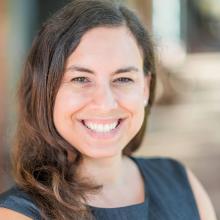
Joanne Britland
Education
Ph.D., Spanish Literature, University of Virginia (May 2019)
M.A., Spanish, Bowling Green State University (One year of M.A. study in Alcalá de Henares, Spain)
B.A., Spanish, James Madison University
B.A., Communication Studies (Concentration in Public Relations), James Madison University
Research Interests
- Twentieth- and twenty-first century peninsular literature and film
- Crisis literature and cultural production
- Spanish Civil War
- Twentieth- and twenty-first century Latin-American studies
- Brazilian studies
- Technology and foreign language pedagogy
Dissertation
“Sufrir, salir, sobrevivir: Cultural Responses to the 2008 Social and Financial Crisis in Spain”
This dissertation examines the impact of the 2008 social and financial crisis in Spain, exploring the responses to it through a comprehensive study of cultural production including novels, films, television series, and graphic novels. It analyzes the artistic treatment offered by these works and demonstrates how they depict the outcomes of responses to the crash, serving as a form of protest and, in many instances, warning, urging change, and providing a coping mechanism for those affected.
Publications
“La crisis, la risa y catarsis: The 2008 Financial Crash and Comedic Representations of Spanish Emigration.” Hispanic Studies Review, Spring 2019. (forthcoming)
"Developing Self-Directed Learners through an ePortfolio Peer Consultant Program." International Journal of ePortfolio, Spring 2019.
Teaching
University of Virginia
- SPAN 3300, Texts and Interpretation (2017-2018)
- SPAN 3010, Spanish Grammar and Composition (2016-2017)
- SPAN 2020, Advanced Intermediate Spanish (2015-2016)
- SPAN 2010, Intermediate Spanish (2014-2016)
- UVa Hispanic Studies in Valencia, Intermediate & Advanced Intermediate Spanish (Summer 2018 & Summer 2016)
- PORT 1110 & PORT 2120, Beginner and Intermediate Portuguese (substitute instructor)
Bowling Green State University
- SPAN 102, Elementary Spanish II (2009-2010)
- SPAN 101, Elementary Spanish I BGSU (2009-2010)
- BGSU in Alcalá de Henares, Spain, SPAN 101 & SPAN 102 (Summer 2009 & Summer 2010)
International Teaching Experience
- AP Spanish IV & V, Spanish Language & Literature, PACA, São Paulo, Brazil (2011-2013)
- Portuguese Level 1, PACA, São Paulo, Brazil (2011-2013)
- English as a Foreign Language (EFL), Colegio Magerit, Madrid, Spain (2010-2011)
Presentations
Literature, Film, and Cultural Studies
“‘La literatura de la crisis’ (Crisis Literature): Transformations in the Publishing Industry as a Response to the 2008 Financial Crash in Spain.” 2019 MLA Annual Convention, Chicago, IL, January 2019.
“Cultural Production and the 2008 Crisis: A Comedic Representation of Spanish Emigration.” Digital Imaginaries of the South: Stories of Belonging and Uprooting in Hispanic Cinemas, Casa de América and Universidad Carlos III, Madrid, Spain, October 2017.
“Self-exploration through the Examination of ‘the Other’ in the Works of Clarice Lispector: Can the Subaltern Speak in Brazil?” Mountain Interstate Foreign Language Conference (MIFLC), James Madison University, Harrisonburg, VA, October 2016.
“John Yungjohann: Traveler, Fortune Seeker, and Adventurer in Nineteenth-Century Amazonia.” Kentucky Foreign Language Conference (KFLC), The University of Kentucky, Lexington, KY, April 2016.
Pedagogy and Learning Technology
“Digital Literacy and Learner Autonomy Squared: Peer Mentoring and the Foreign Language E-portfolio.” American Council on the Teaching of Foreign Languages (ACTFL) National Convention, Nashville, TN, November 2017.
“Students Mentoring Students: The ePortfolio Peer Consultant Model.” The Association for Authentic, Experiential and Evidence-Based Learning (AAEEBL) Southeast Regional Conference, University of Virginia, Charlottesville, VA, November 2017.
“E-portfolios in World Language Teaching, Learning, and Assessment.” The Association for Authentic, Experiential and Evidence-Based Learning (AAEEBL) Southeast Regional Conference, Virginia Tech, Blacksburg, VA, November 2016.
“Which Grouping Activity Best Promotes Participation in the Foreign Language Classroom?” Action Research in the Foreign Language Classroom: Roundtable on Foreign Language Teaching and Learning, University of Virginia, Charlottesville, VA, December 2014.
Invited Talks
Presenter and Discussion Moderator of El Olivo (2016) by Iciar Bollaín. Spanish, Italian, and Portuguese Film Fest: Contemporary Women’s Visions from Spain, Italy, and Latin America. Charlottesville City Hall Council Chambers, Charlottesville, VA, September 2018.
“The 2008 Financial Collapse and Contemporary Spanish Cultural Production.” The Sigma Delta Pi Graduate Research Symposium. Kentucky Foreign Language Conference (KFLC), The University of Kentucky. Lexington, KY, April 2018.
Guest Lecturer
“Literature of Crisis”. M.A. Course, Representations of Marginality. The University of Groningen, Groningen, Netherlands, May 2017.
“The Aftermath of the Crisis of 2008 in Spain: A Deeper Look through David Trueba’s Blitz.” CRIC (Cultural Narratives of Crisis and Renewal) Lab Seminar. “Politics of (in)visibility.” Groningen, Netherlands, June 2017.
Panels Organized/Moderated
Roundtable Moderator, “Lessons from Cultural Exploration Abroad: Bringing the Conversation Home” Institute of World Languages (IWL) 2017 Symposium, The University of Virginia, Charlottesville, VA, October 2017.
Conferences Organized
“Meaning Making with e-Portfolios.” The Association for Authentic, Experiential and Evidence-Based Learning (AAEEBL) Southeast Regional Conference, University of Virginia, Charlottesville, VA, November 2017.
Institute of World Languages (IWL) 2016 Symposium, The University of Virginia, Charlottesville, VA, October 2016.
Grants & Awards
Buckner W. Clay Fellow (2018-2019)
Center for Global Inquiry and Innovation Grant, University of Virginia (Spring 2018, Fall 2017)
Charles Gordon Reid, Jr. Fellowship, Groningen, Netherlands & Valencia, Spain (2017)
Invited Research Stay, Department of European Literature and Culture, University of Groningen (Summer 2017)
Sigma Delta Pi National Graduate Research Grant (2017)
Virginia Foundation for the Humanities (VFH) South Atlantic Studies Fellow (2017)
Outstanding Graduate Teaching Assistant Award, For Teaching Excellence in UVa’s Department of Spanish, Italian, and Portuguese (2015)
Del Greco Library Grant, Salamanca, Spain (2015)
Leadership
Electronic Portfolios in Foreign Language Teaching and Learning Project, Project Manager (2015-2018)
Coordinator of the ePortfolio Peer Consultants (ePPC) peer-mentoring program (2015-2017)
Sigma Delta Pi, Graduate Student Representative (2016-2017)
Institute of World Languages (IWL), Graduate Student Representative (2014-2016)
Memberships
MLA (Modern Language Association)
ACTFL (American Council on the Teaching of Foreign Languages)
CES (Council for European Studies)
Sigma Delta Pi (National Collegiate Hispanic Honor Society)
UVa Spanish Theater Group, Department of Spanish, Italian, and Portuguese

Francesca Calamita
Research Summary & Bio
Dr Francesca Calamita is Associate Professor, General Faculty, and Director of the Undegraduate Programs in Italian Studies as well as Director of UVa in Siena and UVa in Florence. She is an affiliate faculty member of the Department of Women, Gender and Sexuality and currently she also serves as College Fellow in the Engagements.
Accademically raised in Europe, the UK and New Zealand, she works in the area of women, gender and sexuality in Italian, European and global contexts, and she is internationally recognised for her publications on the fictional depiction of eating disorders and other complex relationships with body and food in Italian literature and culture. Her interdisciplinary research, transnational and anchored in feminist theory, bridges women’s writing, cultural studies and gender studies. Her research interests also include the intersections between second language acquisition, sociolinguistics and gender studies.
She is the author of the monographs Linguaggi dell’esperienza femminile: disturbi alimentari, donne e scrittura dall’Unità al Miracolo Economico (2015), featured in the prestigious literary journal Nuovi Argomenti and at the 2016 edition of Feminism: Fiera dell'editoria delle donne, and Visibili e influenti (2023) as well as a number of peer-reviewed articles and book chapters with prominent publishers. She is co-editor of a volume on anorexia and bulimia in European literature, funded by a Buckner W. Clay Dean of Arts and Sciences grant and she also published a further co-edited collection on gender, women and food. Before joining UVa, Dr Calamita was a Visiting Fellow at the University of London’s Centre for the Study of Contemporary Women’s Writing where she completed her post-doctoral research project and where she currently continues to serve as a steering committee member by invitation. Previously Dr Calamita was a Teaching Fellow at Victoria University of Wellington in New Zealand where she earned her PhD in 2013 and taught European Studies and Italian Studies.
Dr Calamita has published also extensively at the intersections of Italian language and feminist pedagogy; she is the co-author of DiversITALY, one of the first textbooks to teach and learn Italian with gender equality and inclusive language which stems from her initiative A Gendered Wor(l)d: Grammar, Sexism and Cultural Changes in Italian Language and Society, a multimodal learning experience which allows students to engage critically with Italian media and to become sensitive to the gendered politics of the language.
In the past she served in a variety of roles at the Institute of World Languages at UVa and she is currently chair of the Siena Oversight Committee, co-chair of the ISI Consortium in Florence, Academic Senator on the Grievance Committee and member of the Academic Strategy Committee for the Academic Program Review in the Office of the Executive Vice Provost and Provost.
She is the recipient of numerous internal and external, single and collaborative research and pedagogical grants and has been an invited speaker in US universities as well as around the world.
Passionate about women's rights activism, she is currently pursuing an MA in Global Politics in her spare time. She is delighted to see students actively working towards gender equality, learning new languages, travelling the world, opening their minds, and choosing Italy as their destination for study abroad.
Education
Ph.D., Victoria University of Wellington (2013)
M.A., Università degli Studi di Bergamo (2008)
B.A., Università degli Studi di Perugia (2005)
Research Interests
- Italian women’s writing
- Gender Studies
- Cultural Studies
- Representations of food and the body in diverse genres -- fiction, pop culture, advertisements, and film
- Politics and gender
- Medical Humanities
- Italian Language and Gender
- Italian Language taught with Diversity and Inclusion
Teaching
- ITTR/WGS3559 “TV and Web Series in Italy and the Globe: Gender, Sex and Society”
- ITTR/WGS3559 “My Body, My Choice: Women’s Rights in Modern Italy”
- ITTR3685/WGS3559 "Italy on Screen: Sex, Gender and Racial Identities in the Glocal Context"
- ITTR/WGS3680 “Eve’s Sinful Bite:Foodscapes in Women’s Writing, Culture & Society”
- ITTR3559 "Global Women's Writing: Stories of Empowerment from Italy and the World" (counts as elective for WGS)
- GSGS2559 "Global Challenges, Local Responses"
- EGMT1530 "Food for Global Feminist Thought"
- COLA1500 "Twenty-first Century Women"
- ITAL3020 "Advanced Italian II: Achieve Fluency through Experiential Learning"
- ITAL2030 "Italian for Intercultural Mediators"
- ITAL2020 “Intermediate Italian Language II” (focus on gender and language)
- ITAL2010 “Intermediate Italian Language I”
- ITAL1020 “Elementary Italian II”
- ITAL1010 “Elementary Italian I”
- ITAL4993 “Independent Study” – Elena Ferrante's Neapolitan Quartet (Biyuan Gu)
- ITAL4993 "Independent Study" – Michela Marzano's Novels (Avery Morrison)
- ITAL4993 "Independent Study" – From Page to Screen: Elena Ferrante's My Brilliant Friend (Christine McDermott)
- ITAL4993 "Independent Study" – Elena Ferrante and Natalia Ginzburg (Adelaide Brooks)
- ITAL 4989 Distinguished Major Thesis Director – Postcolonial Women's Writing: Igiaba Scego (Mary Collins)
Selected Publications
Monographs
Linguaggi dell’esperienza femminile: disturbi alimentari, donne e scrittura dall’Unità al Miracolo Economico (Il Poligrafo: Padua, October 2015)
Visibili e influenti: le donne italiane ci sono (Biblion: Milan, 2023)
Edited volumes
Starvation, Food Obsession and Identity: Eating Disorders in Contemporary Women’s Writing, co-edited with Petra Bagley and Kathryn Robson (“Studies in Contemporary Women’s Writing”, Peter Lang: Oxford, 2017)
Eve’s Sinful Bite: Food and Women in Italian Literature, Culture and Society, co-edited with Claudia Bernardi and Daniele DeFeo (Bloomsbury Academic: London, November 2020) https://www.bloomsbury.com/us/food-and-women-in-italian-literature-culture-and-society-9781350137806/)
Edited Special Issue of Journal
With Mabel Richart Marset (Valencia), MonTI (12), “Revista académica de Traducción e Interpretación de las universidades públicas valencianas”, Translation and Media Accessibility: from Theory to Practice [Traducción y Accesibilidad en los medios de comunicación: de la teoría a la práctica] (May 2020) http://rua.ua.es/dspace/handle/10045/106615
With Mabel Richart Marset (Valencia),Quaderns de Filologia : Estudis Literaris, La literatura contemporánea mundial como espejo-denuncia de los trastornos de la conducta alimentaria, Vol. 27 (2022) (uv.es)
With Stefano Baldassarri and Nina Peci (ISI- Florence), Beyond, special issue on Inclusion, Diversity and Education, November 2022 Inclusion, Diversity, and Education (beyondjournal.online)
Textbook
With Chiara De Santi (Farmingdale College), DiversITALY: Elementary Italian with Gender Equality, Inclusion and Diversity - volume 1 (Kendall Hunt: Dubuque, 2022)
With Chiara De Santi (Farmingdale College), DiversITALY: Elementary Italian with Gender Equality, Inclusion and Diversity - volume 2 (Kendall Hunt: Dubuque, 2023)
Selected Articles
With Roberta Trapé (Melbourne), "Women’sVisibility Matters in Italian Language and Beyond: Intercultural Citizenship throughGender-Inclusive Toponymy on Both Sides of the Atlantic", JOMELA, Mediterranean and European Linguistic Anthropology, 2023, Vol. 5(1):4-21
"Affidamento and (Pop)-Feminism: Advocating for Women’s Rights in The Handmaid's Tale and Luna Nera", Romance Studies (special issue on "Female Filiations", issue 40, n. 3-4, edited by Eliana Maestri - Exeter, UK and Christina Horvath - Bath, UK), December 2022
“Post-pandemic Messages of Gender Equality, Inclusion and Diversity in Italian Language Courses and Beyond: Yes, You Can (too)!”, Beyond (ISI-Florence and Umbra Institute-Perugia), n. 4, October 2021, pp. 8-20.
‘“Fainting is one way of disappearing. Anorexia is another’: Disorderly Eating in Louise De Salvo’s Vertigo”, Journal of Romance Studies,Vol 20,No 2 (Summer 2020), pp. 249–271
With Mabel Richart Marset, “The Great Challenge of Translation and Audiovisual Accessibility in the Media [El gran reto de la traducción y la accesibilidad audiovisual en los medios de comunicación]”, MonTI (12) (May 2020), Translation and Media Accessibility: from Theory to Practice [Traducción y Accesibilidad en los medios de comunicación: de la teoría a la práctica] edited by Richart Marset and Calamita, pp. 7-52.
With Roberta Trapé (Melbourne) “Expanding Learning Spaces: Virtual Places of Learning in a Transnational Telecollaborative project between the U.S.A. and Italy”, Italian Studies in Southern Africa/Studi d'italianistica dell'Africa australe, Vol 32, No 2 (2019), pp. 275-304.
“Sexism and Gender Stereotypes in Italian Language Courses: No, Grazie!”, TILCA: Teaching Italian Language and Culture Annual, special issue edited by Louise Hipwell and Donatella Melucci. (2018), pp. 126-138.
“Tastefulness: Fashion, Food, Lust and Domesticity in Matilde Serao’s ‘La virtù di Checchina [Checchina’s Virtue]’ (1884),” altrelettere, DOI: 10.5903/al_uzh-28 February 2015.
“Voracious Dolls and Competent Chefs: Negotiating Femininity and Masculinity in Italian Food Advertisements of the 1990s-2010s,” Gender/Sexuality/Italy, 1, May 2014, pp. 1-13.
“Storytelling and Female Eating Habits at the turn of the Twentieth Century: Italo Calvino’s ‘Zio Lupo’ and Neera’s ‘Uno Scandalo,’” AUMLA, Special Issue, Refereed Proceedings of the 2011 AULLA Conference: Storytelling in Literature, Language and Culture, April 2012, pp. 67-75.
“Unspoken Feelings: Comparing the Feminism of Sibilla Aleramo’s Una donna and the Social Battle of the Present-day Anorexic,”Skepsi, vol. 4, 1 (2011), pp. 1-11.
Selected Book Chapters
With Robertà Trapè, “Virtual Exchanges and Gender-inclusive Language: An Intercultural Citizenship Project to Foster Equality” Blended Learning and the Global South, edited by Giovanna Carloni, Christopher Fotheringham, Anita Virga, Brian Zuccalà (Edizioni Ca’ Foscari- University of Venice: Venice), pp. 115-130.
“Beyond Size and Weight: Gianna Schelotto’s “La ragazza che mangiava la luna [The Girl who Ate the Moon]” (1992) in Eve’s Sinful Bite: Food and Women in Italian Literature, Culture and Society, edited by Claudia Bernardi, Francesca Calamita and Daniele DeFeo (Bloomsbury Academic: London, November 2020)
“Identica a loro?”: (In)digesting Food and Identity in Igiaba Scego’s Short Story “Salsicce” (2003) eds, Niki Kiviat and Serena J. Rivera, Complications of Eating: Investigating (In)digestion in Literature and Film (Routledge: New York, May 2020), pp. 186-200
“On the Verge of Emotional Hunger: Anorexia, Bulimia and Interpersonal Relationships in Contemporary Italian Women’s Writing”, eds. Petra Bagley, Francesca Calamita and Kathryn Robson, Starvation, Food Obsession and Identity: Eating Disorders in Contemporary Women’s Writing (“Studies in Contemporary Women’s Writing”, Peter Lang: Oxford, 2017), pp. 67-89.
“Resistance through Starvation: Refusal of Food, Empowerment and Eating Disorders in Natalia Ginzburg’s short story ‘La madre’ (1948)”, Women in the Public Sphere in Modern and Contemporary Italy, eds. Marina Spunta, Simona Storchi and Maria Morelli (Troubador: Leicester, 2017), pp. 41-52.
“Bird-Like-Eating Attitudes, Fat-Shaming and Ideal Body Shape in Italian Women’s Writing of the 1930s-1940s,” Bridges Across Cultures Conference Proceedings in collaboration with Voces del Caribe, eds Angela Tumini, Tim Wagner and Amparo Alpanes, pp. 60-67. (September 2016)
“Discussing Women’s Social Role through Paradoxical Behaviours: Starvation and Self-empowerment in Neera’s Teresa (1886) and L’indomani (1889),”Gendering Commitment: Re-thinking Social and Ethical Engagement in Modern Italian Culture, ed. Alex Standen (Cambridge Scholar: Newcastle, 2015), pp. 9-26.
Digital Work
Interview on gender equality in Italy with the TV channel TeleRomagna. Link: https://teleromagna.it/it/programmi/faccia-a-faccia/2021/02/23/parliamo-di-parita-di-genere , March 2021
Interview on gender issues in "My Name is Francesca", a virtual exhibition at the time of COVID-19 with Francesca Lolli, Francesca Leoni and Francesca Fini, curated by Francesca Interlenghi https://www.facebook.com/mynameisfrancesca/videos/1435107333364623/, April 2020.
“Natalia Ginzburg e la rappresentazione dell’esperienza femminile”, Nuovi Argomenti, June 2016.
"Michela Marzano. Biography, Bibliography and Criticism" http://modernlanguages.sas.ac.uk/research-centres/centre-study-contemporary-womens-writing/languages/italian/michela-marzano, Centre for the Study of Contemporary Women's Writing, May 2017.
Selected Recent Presentations
“Debating Global Women’s Rights in The Handmaid’s Tale and Luna Nera”, Centre for the Study of Contemporary Women’s Writing, IMLR, University of London, UK 16 June 2022.
"The Politics of Words: Second Language Acquisition to Achieve Gender Equality in line with UN 2030 Agenda", University of Bath, UK, 28 April 2022 (invited)
“Le parole contano: Rethinking Second Language Acquisition to Achieve Gender Equality and Foster Diversity and Inclusion”, University of San Diego, San Diego, 25 March, 2022 (invited)
“Cambiare il mondo studiando una lingua: parità di genere, inclusione e diversità in italiano e oltre", Georgetown University, Washington, DC, 19 October 2021 (invited)
“(In)digesting the Self: Migration, Patriarchy, Post-colonialism and Food in Igiaba Scego’s “Salsicce” (2003)”, Victoria University of Wellington, New Zealand, July 9 2019 (invited)
Selected Grants & Awards
Page Barbour Workshop Award (with Giulio Celotto and Giulia Paoletti, 2023)
Center for Global Inquiry + Innovation Grant, UVa (with Giulio Celotto and Giulia Paoletti, 2022)
AHSS Teaching Support, UVa (2021)
UVa Library Course Enhancement Grant. (2021)
Institute of World Languages, UVa. Faculty Research Grant (2021)
Buckner W. Clay Endowment Grant. Institute of the Humanities and Global Cultures, UVa. (with Giulio Celotto and Giulia Paoletti, 2020)
Buckner W. Clay Dean of Arts and Sciences, UVa. AHSS Research Grant ( 2015; and with Giulio Celotto and Giulia Paoletti, 2020)
UVa's Center for Teaching Excellence, Thrive Grant (2019; 2022 with Gianluca Guadagni)
College of Arts and Science, UVa. LTi Grant (2018 and 2021)
Institute of World Languages, UVa and Jefferson Trust, Language Forward Initiative (grant team member, 2018)
College of Arts and Science, UVa. Diversity and Inclusion Grant (with Shilpa Davé -2018; with Giulio Celotto and Giulia Paoletti - 2020)
Institute of World Languages, UVa, Course Enhancement and Developement Grant ( 2019 and 2017)
Institute of World Languages, UVa, Language Program Grant (2019, 2018,2017, 2016, 2015)
AHRC (Arts and Humanities Research Council, UK) and the University Nottingham, Travel and Research Grant (2016 and 2017)
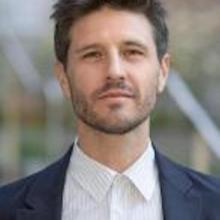
Eli Carter
ABOUT ME
I am an Associate Professor of Brazilian film and television in the Department of Spanish, Italian, and Portuguese, and I hold an affiliate appointment in the Department of Media Studies. I also serve as the Director of the Portuguese Program, and I am the current Director of the Latin American Studies Program and the Co-Director of the Americas Center / Centro de las Américas.
Broadly speaking, I am a scholar of Global Television and New Media, with a specific emphasis on the Global South and Brazil. My work explores questions having to do with aesthetics, production and distribution, legislation and politics, and inequality, race, and representation. Representative of the interdisciplinary nature of my research agenda, I have published several articles that span the fields of Media Studies and Latin American Studies. In addition to these, I have published two books. The first of which, Reimagining Contemporary Brazilian Television Fiction (University of Pittsburgh Press, 2018), examines Brazilian television through the singular mode of production and aesthetics in film and television director Luiz Fernando Carvalho's body of work. As a long-time employee of TV Globo, Brazil’s hegemonic over-the-air broadcast network, I argue that Carvalho’s ethical-aesthetic project emerges in direct contrast to his employer’s extremely popular and influential telenovelas. I demonstrate how over his nearly four-decade tenure at TV Globo, Carvalho constructed a hybrid televisual aesthetic aimed at activating the spectators’ senses by borrowing from, experimenting with, and reinterpreting a diverse array of national and global cultural and artistic movements. The result is not only some of the most complex television fiction in the world, but also a body of work that functions as a counterpoint to, and a reflection of Brazilian television fiction’s past and present, as well as its ongoing transition into the future.
My second book, The New Brazilian Mediascape: Television Production in the Digital Streaming Age (University of Florida Press, 2020), examines incipient technologies, recent audiovisual legislation, and the ways in which different political administrations have balanced neo-liberal economic policies with protectionist cultural policies from 1985 to present day. More specifically, The New Brazilian Mediascape highlights the developing relationships between established and emergent creative figures, executives, production companies, networks, and VOD providers since the 2011 passage of the Pay-TV Law, which created a previously non-existent space for distribution and production by establishing quotas for airing locally produced content on pay-television channels. Focusing on specific works, I analyze the ways in which the movement from the telenovela to fictional formats like the television and web series has important consequences for how Brazil reimagines and incorporates its own diversity within the context of an increasingly connected global mediascape.
I am currently working on two separate book projects. Streaming the Americas,--the first of these--aims to provide the reader with a comprehensive understanding of streaming services and their impact on the mediascapes and social imaginaries of North, Central, and South America. Employing a hemispheric approach, Streaming the Americas contemplates and probes the recent rise of local and global Internet portals, VOD, and SVOD services and the varied practices and incipient norms associated with these. Streaming the Americas is organized around three broader sections—legislation and production, aesthetics and representation, and reception. The intranational, transnational, and multidisciplinary approaches that make up the different sections will provide the reader with a unique, comparative, and wide-ranging understanding of streaming and its impact in the American hemisphere. The second book project is titled 75 anos de televisão Brasileira / 75 Years of Brazilian Television. In September of 2025, Brazilian television will complete 75 years since its inception in 1950. To commemorate the moment, Esther Hamburger (ECA, Universidade de São Paulo) and I have begun work on an edited collection of original scholarship from researchers across the globe. Exploring history, aesthetics and formats, legislation and politics, production and distribution, and representation and reception, 75 Years of Brazilian Television aims to become a definitive reference for scholars of and readers interested in Global Television Studies and Brazilian culture.
PUBLICATIONS
BOOKS
Streaming the Americas. In Progress
75 anos da televisão Brasileira. Co-edited with Esther Hamburger (Universidade de São Paulo). In Progress
The New Brazilian Mediascape: Television Production in the Digital Streaming Age. Univ. Florida Press, 2020.
Reimagining Brazilian Television: Luiz Fernando Carvalho’s Contemporary Vision. Pittsburgh: Univ. of Pittsburgh Press, 2018.
SELECTED ARTICLES
"Precarity in the Televisual Global South: Atlanta and Sintonia.” In Progress.
"Shifting the Center: The Impact of the Pay-TV Law on the Brazilian Audiovisual Field.” Media, Culture and Society. (June 2018): 261-277. https://doi.org/10.1177/0163443718781974.
*Lead Article
“Representing Blackness in Brazil’s Changing Television Landscape: The Cases of Mister Brau and O Grande Gonzalez.” Latin American Research Review 53.2 (June 2018): 344-357.
*Recipient of the 2019 Latin American Research Review (LARR)-Pitt Best Article Award
“Silence behind the Talk of Crime: Representations of Violence in a Sample of Contemporary Brazilian Film and Television.” A Contracorriente. 15.1 (Fall 2017): 79-102. 10,450 words
*Honorable Mention 2018 Best Article, Latin American Studies (LASA) Section Awards—Brazil
"Entering through the Porta dos Fundos: The Changing Landscape of Brazilian Television Fiction.” Television & New Media 18.5 (2017): 410-426.
"Rereading Dom Casmurro—Aesthetic Hybridity in Capitu.” Machado de Assis em Linha (Universidade de São Paulo) 7.13 (2014): 19-43.
"Afinal, o que Querem as Mulheres?: Luiz Fernando Carvalho's Metafictional Critique of Brazilian Television Fiction." Journal of Latin American Cultural Studies 23.4 (2014): 363-379.
EDUCATION
Ph.D. University of California, Los Angeles, Hispanic Languages and Literatures
M.A. University of California, Los Angeles, Portuguese
B.A. University of California, Davis, Communication, With Honors
Pontifícia Universidade Católica do Rio de Janeiro
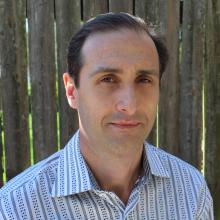
Enrico Cesaretti
Research Summary
Enrico Cesaretti is a Professor of Italian at UVA, and a Mellon Humanities Fellow for 2016-17. He holds a Laurea in Modern Languages and Literatures (English and German) from the University of Pisa (Italy), a M.A. from the University of Virginia and a Ph.D. from Yale University. His articles appeared in Italian Studies, Italica, Annali d’Italianistica, Modern Language Notes, Comparative Literature, Romance Studies, Ecozon@ and Symposium, among others. His most recent research has been focused on the fields of the Environmental Humanities and ecocriticism.
He is the author of four books: Castelli di carta: retorica della dimora tra Scapigliatura e Surrealismo (Longo, 2001), Fictions of Appetite: Alimentary Discourses in Italian Modernist Literature (Peter Lang, 2013), Landscapes, Natures, Ecologies. Italy and the Environmental Humanities (co-edited with Serenella Iovino and Elena Past, University of Virginia Press, Series “Under the Sign of Nature”, 2018), and Elemental Narratives. Reading Environmental Entanglements in Modern Italy (Penn State University Press, 2020). This latest book explores the narrative eloquence and agency of some of the materials (i.e. concrete, steel, marble, petroleum, asbestos) that have contributed to make (and, simultaneously, “un-make”) modern Italy.
He is currently working on an article that approaches Italian science fiction through ecocriticism and doing research on "Naturismo futurista."
Education
Ph.D., Yale University
M.A., University of Virginia
Laurea in Modern Languages and Literatures, University of Pisa
Publications
Books
Elemental Narratives. Reading Ecological Entanglements in Modern Italy. University Park: Penn State University Press (AnthropoScene: The SLSA Book Series) (Forthcoming November 2020). http://www.psupress.org/books/titles/978-0-271-08773-3.html.
Italy and the Environmental Humanities. Landscapes, Natures, Ecologies. Eds. Serenella Iovino, Enrico Cesaretti, Elena Past. Charlottesville: University of Virginia Press, Series "Under the Signs of Nature", 2018. http://www.upress.virginia.edu/title/5050
Fictions of Appetite. Alimentary Discourses in Italian Modernist Literature. Series: “Italian Modernities.” Eds. Pierpaolo Antonello and Robert Gordon. Bern - Oxford: Peter Lang, 2013. https://www.peterlang.com/view/title/35622
Castelli di carta: retorica della dimora tra Scapigliatura e Surrealismo. Ravenna: Longo Editore, 2001.
Articles
“Spectral Tales and Real Disasters: (Re-)visiting the Trauma(s) of Modernization in Daniele Atzeni’s I morti di Alos” in Italian Experiences of Trauma Through Film and Media. Eds. Alberto Baracco e Rosario Pollicino, Cambridge Scholar Publishing (forthcoming).
“Nutty Logic: Listening to the Hazelnuts in Pavese and Fenoglio” in ISLE Interdisciplinary Studies in Literature and Environment. Online publication: 02/12/2021. https://doi.org/10.1093/isle/isaa203
“Eco Futurism? Some Thoughts on Nature, Matter, and Body in F. T. Marinetti”, in Modernism and the Avant-garde Body in Spain and Italy. Eds. Maria Rosa Truglio & Nicolás Fernandez-Medina. Routledge Studies in Comparative Literature Series, 2016. pp. 232-47.
“Domestic Fronts: Bringing the Great War Home in Pirandello’s Novelle per un anno” in Annali d’Italianistica 33 (2015): 223-39. (Special issue on “The Great War and the Modernist Imagination in Italy”)
“Struggling with Beauty: a Reading of Vanni Santoni’s Se fossi fuoco arderei Firenze.” Symposium: A Quarterly Journal in Modern Literatures 69.1 (2015): 14-24.
“A Life of Metal: an Ecocritical Reading of Silvia Avallone’s Acciaio.” Ecozon@. European Journal of Literature, Culture and Environment 5.2 (2014): 107-22.
“‘Una finestra sul buio’: note sull’immaginario della ferita in Tommaso Landolfi.” AVANGUARDIA Rivista di letteratura contemporanea 47 (2011): 33-46.
“Materiali sessuali: osservazioni sulla narrativa erotico-sociale di F.T. Marinetti.” L’anello che non tiene: Journal of Modern Italian Literature 22 (Spring-Fall 2010): 24-38.
“Milk and Blood: Nursing Capitalism in Luigi Pirandello’s La balia.” Italian Studies 65.1 (February 2010): 33-45.
“Recipes for the Future: Traces of Past Utopias in The Futurist Cookbook.” The European Legacy 14.7 (2009): 841-56.
“Outplaying Kronos’ Hunger: Massimo Bontempelli’s Gente nel tempo.” Forum Italicum 43.2 (Fall 2009): 385-404.
“Dangerous appetites: Sex and the Inorganic in F.T. Marinetti’s Erotic Short-Fiction.” Annali d’Italianistica 27 (2009): 139-55.
“Indigestible Fictions: Hunger, Infanticide and Gender in Paola Masino’s ‘Fame’ and Massimo Bontempelli’s La fame.” Spunti e Ricerche 23 (2008): 5-20.
“Nutrition as Dissolution: Paola Masino’s Nascita e morte della massaia.” Quaderni d’Italianistica 28.2 (2007): 1-20.
“‘Oh, la disobbedienza…!’. Meditazioni su una novella giovanile di Grazia Deledda.” Italica 84.4 (Winter 2007): 723-34.
“Dyspepsia as Dystopia? Marinetti’s Le Roi Bombance.” The Romanic Review 97.3-4 (May-November 2006): 351-67.
“Palazzeschi’s :Riflessi or Writing as Erasure.” The Modern Language Review 99.4 (October 2004): 924-37.
“Consuming Texts: Creation and Self-effacement in Palazzeschi and Kafka.” Comparative Literature 56.4 (Fall 2004): 300-16.
“Back to the Future: Temporal Ambivalences in F.T. Marinetti’s writings.” Italian Modernism: Italian Culture between Decadence and Avant-Garde. Ed. M. Moroni and L. Somigli. Toronto: University of Toronto Press, 2004. 243-66. 29.
“The Language of Passion: Silence and Melodrama in Niccoló Tommaseo’s Fede e bellezza.” Modern Language Notes 119.1 (January 2004): 52-66.
“Uno scrittore di una realtà che (s)fugge: Marco Lodoli.” In Search of Italia. Saggi sulla cultura dell’Italia contemporanea. Ed. Antonio Vitti and Roberta Morosini. Pesaro: Metauro Edizioni, 2003. 29-48.
“‘Il giocattolo futurista’: Futurism and fumetti.” Romance Studies 21.3 (November 2003): 191-202.
“A New Home for Italians? A Literal and Metaphorical Interpretation of National Identity within the Context of Scapigliatura.” Forum for Modern Language Studies 38.2 (2002): 140-54.
“La parola e l’immagine: alcune riflessioni su G. Leopardi e C.D. Friedrich.” Testo 40 (Luglio - Dicembre 2000): 77-92.
“Il fantastico in sagrestia: un’ipotesi di lettura delle Memorie del Presbiterio di Emilio Praga.” Rassegna Europea di Letteratura Italiana 14 (1999): 37-48.
“I loci della dissacrazione: nel ‘monastero’ della Desinenza in A di Carlo Dossi.” Rivista di Studi italiani, 16.1 (June 1998): 227-40.
“The Representation of the Arts in Visconti’s The Leopard.” L’anello che non tiene: Journal of Modern Italian Literature 9.1-2 (Spring-Fall 1997): 27-38.
“Preoccupazione devozionale nella Rappresentazione di San Giovanni e Paolo di L. De’ Medici.” The Italianist (December 1995): 66-82.
Conference Proceedings
“A Life of Metal: an Ecocritical Reading of Silvia Avallone’s Acciaio” in the volume Identity and Conflict in Tuscany. Eds. Silvia Ross & Claire Honess. Florence: Firenze University Press, 2015, pp. 85-99. (This is a reprint, with minor changes, of my article in Ecozon@).
“Metallo vivente. Una lettura ecocritica di Acciaio di Silvia Avallone” in the volume ContaminAzioni ecologiche: Cibi, Nature, Culture. Milano: LED, 2015, 133-147. (Translated reprint of above-mentioned article).
“Massimo Bontempelli e il mito classico: il caso di Gente nel tempo.” L’Analisi linguistica e letteraria 2 (2009): 293-306.
Selected Grants & Awards
Mellon Humanities Fellow, Institute of Humanities & Global Cultures (2016-2017)
Summer Research Stipend (Arts, Humanities & Social Sciences), UVa Vice Provost for Research (2017)

Erica Cobb
Degrees
-
Ph.D., Spanish, University of North Carolina at Chapel Hill
-
M.A., Spanish, The Ohio University
-
B.A., Spanish, Fine Arts, The Ohio University
I have lived, worked and/or studied in England, Belgium, France, Italy, Spain, Mexico and the United States. I love being surrounded by history, walking in the footsteps of historical authors, and sharing that joy with my students, inspiring them to do the same through study abroad. I specialise in poetry, theatre and art of the Spanish Golden Age and am most interested in themes of identity (how we define ourselves and how we present ourselves to the world) and responsibility (both in terms of what we owe to each other and to the environment in which we live). I teach all levels of language and literature, but most especially enjoy teaching poetry.
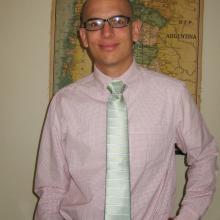
Daniel E. Colón
EDUCATION
PhD, University of Notre Dame (2010) Spanish American and Luso-Brazilian Literary and Cultural Studies Dissertation title: “Vigencia de la vida y obra de Pablo Neruda: Un análisis del discurso autobiográfico y la sensibilidad social en su obra temprana”
BA, Tufts University (2000), cum laude Majors: International Relations and Spanish. Minor: Latin American Studies
FELLOWSHIPS, GRANTS AND AWARDS (Selected)
Fund for Teachers Grant, Summer 2018. Santiago, Chile. External professional development grant to develop and implement curriculum on Latin American Indigenous Cultures.
Fulbright Postdoctoral Fellowship, Core Fulbright US Scholar Program, 2015 – 2016. Instituto de Letras, Federal University of Bahia (UFBA), Salvador, Bahia, Brazil. Field research for book project: “Folklore and the Narrative Tradition in Latin American and Luso-African Literature.”
Edward M. and Ann Uhry Abrams Fellowship, University of Notre Dame Graduate School, 2009-2010. Dissertation completion fellowship: “Vigencia de la vida y obra de Pablo Neruda.”
Graduate Student Professional Development Grant, Institute for Scholarship in the Liberal Arts (ISLA), Notre Dame, Winter Intersession 2008-09. For dissertation related research and travel.
Luso-American Development Foundation, Research Seed Grant, Summer 2008. “Imagining and Remembering the Dictator: Representations of Salazar During and After the Estado Novo.”
Fulbright US Student Fellowship Program, Dissertation Fellowship. University of Chile and Pablo Neruda Foundation, Santiago, Chile, 2006 – 2007. Dissertation field research.
Ford Foundation Predoctoral Fellowship for Minorities, Ford Foundation and The National Academies, 2004. Honorable Mention.
Tinker Pre-Dissertation Travel Award, Tinker Foundation, Winter Intersession 2003 – 2004. For dissertation related research and travel.
Minority Fellowship, University of Notre Dame Graduate School, 2003 – 2005.
PUBLICATIONS
“La figura del intelectual estudiantil en el contexto contemporáneo: la FECh, Claridad y el compromiso creciente de Neruda en los años veinte.” A contracorriente 12.3 (Spring 2015): 105-37.
“Crear y ser creado: poesía y autobiografía en Pablo Neruda.” Revista Iberoamericana. 79.244-245 (jul-dic 2013): 665-83.
“The Role of Folklore in Pepetela’s Historiography of Angola.” Luso-Brazilian Review. 49.1 (Summer 2012): 27-45.
Holanda, Sérgio Buarque de. Roots of Brazil. Trans. G. Harvey Summ. Ed. Daniel E. Colón. Foreword by Pedro Meira Monteiro. Notre Dame, IN: University of Notre Dame Press, 2012. [Reviewed by Robert Patrick Newcomb in Ellipsis: The Journal of the American Portuguese Studies Association 12 (2014): https://jls.apsa.us/index.php/jls/article/view/234]
“Orlando Mason y las raíces del pensamiento social de Pablo Neruda.” Revista Chilena de Literatura 79: Número especial dedicado a Pablo Neruda (Septiembre 2011): 23-45.
“Analysis of the Narrative Structure and Style of O Manual dos Inquisidores: An Allegory of the Salazar Dictatorship in Portugal.” Hispanófila 163 (September 2011): 63-78.
“Recado ‘confidencial’ sobre Pablo Neruda.” In Confidencias de grandes amistades: Cartas de Gabriela Mistral a Eduardo Barrios y otros textos mistralianos. Ed. José Anadón. México, D.F.: Seminario de Cultura Mexicana, 2011. 145-62.
PRESENTATIONS (Selected)
“The Postmodern Narrator in Ignácio de Loyola Brandão’s Zero.” American Association of Teachers of Spanish and Portuguese (AATSP). San Diego, CA. July 10, 2019.
“Folklore and Narrating Brazil’s Cacao Boom.” Latin American Studies Association (LASA). Washington, DC. May 31, 2013.
“Samba and Son: The Formation of National Identity in Brazil and Cuba.” Atlantic World Literacies: Before and After Contact. An International, Interdisciplinary Conference of the Atlantic World Research Network. UNC Greensboro. Oct 7-9, 2010.
“The Writer’s Life: Manuscripts, Correspondence and Publication of Latin American Writers.” Contribution on Pablo Neruda letters dated September 3, 1956 to June 6, 1966. Exhibition in The Department of Rare Books and Special Collections of the University of Notre Dame Library. Notre Dame, IN. Feb 12, 2007 to May 21, 2007.
“The Role of Folklore in Pepetela’s Historiography of Angola.” Presented at Entralogos 2006: Turns, Returns, Detours: (Hi)story and (Re)presentation. Cornell University, Ithaca, NY. Feb 10-11 2006.
“Miguel Torga and the Salazar Dictatorship: One Portugal, Two Visions.” Presented at the 6th Annual TROPOS Graduate Student Conference. Michigan State University, East Lansing, MI. Nov 5, 2005.
“La poesía política de Pablo Neruda en su centenario.” Presented at the 2nd Annual Graduate Student Conference on Luso-Brazilian and Hispanic Literature, Linguistics and Culture. Indiana University, Bloomington, IN. Feb 19-20, 2005.

Pamela DeVries Rini
Pamela DeVries Rini holds a B.A. in Secondary Education from Calvin College with a Spanish major and an English minor, an M.A. in Spanish from the University of Michigan, as well as an M.Ed. in Counselor Education from the University of Virginia. While an undergraduate, Ms. Rini studied at Universidad Iberoamericana in Mexico City, and later, after graduating from college, she participated in a study abroad program in Guadalajara, Mexico through the University of San Diego; in addition, she is a frequent visitor to both Mexico and Puerto Rico.
She has worked in the field of Education since 1983 with students of all ages, primarily as an instructor of Spanish, but also as a school counselor. At the university level, Ms. Rini has taught elementary and intermediate level language classes at the University of Michigan, Longwood University, Hampden-Sydney College, and the University of Virginia. After obtaining her degree in Counselor Education at UVa’s Curry School in 2001, Ms. Rini worked for 6 years at Louisa County Middle School as a school counselor. Following that, she developed a Spanish program for elementary and middle school students at the Peabody School in Charlottesville; later during the summer of 2011, she owned and operated Campamento Buenos Amigos, a summer camp for children who want to learn Spanish or improve their Spanish. Most recently she was invited to teach a beginning level language course at the International Center for adult students in the UVa community from many different countries.
Since moving to Charlottesville in 1987, Ms. Rini has volunteered with community organizations such as SARA (The Sexual Assault Resource Agency), where she worked on the crisis hotline, PACEM (People and Congregations Engaged in Ministry—an organization that helps homeless men living in Charlottesville), and most recently, Virginia Organizing—a grassroots organization seeking social justice.
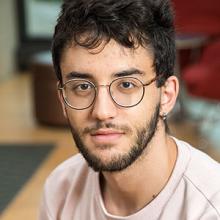
Daniel Doncel Martin
Education
Ph.D., Spanish, University of Virginia (expected 2025)
M.Ed, Carthage College (2020)
B.A., English Studies, Universidad de Salamanca (2018)
Research Interests
- Latin American Literature and Culture
- Spanish Literature and Culture
- United States Literature and Culture
- Critical Theory
- Marxism
- Detective Fiction
- Weird Fiction
- Pedagogy
Teaching
Carthage College
Beginners Spanish, SPN 1010 (Fall 2018, Fall 2019)
Beginners Spanish, SPN 1020 (Spring 2019, Spring 2020)
Spanish Conversation, SPN 3030 (Fall 2019, Spring 2020)
Presentations
"La hija del replicante: la detección como búsqueda y construcción de la identidad en Blade Runner 2049” Congreso de novela y cine negro XV, Universidad de Salamanca, Salamanca, Spain, May 2018.
Grants & Awards
Erasmus Programme, National University of Ireland, Galway (2016-2017)
Gabriela Dongo Arévalo
Gabriela Dongo Arévalo is originally from Peru. She has worked in different educational levels, from primary school to university level, teaching Spanish for native speakers and Spanish for Second Language learners in Peru, England, Spain, and the United States. Gabriela has experience in hybrid, in person, and online courses. Her experience covers teaching, curriculum development, teachers training, management, recruiting, hiring, advising, and development of nonacademic programs for children, teens, and adults. Gabriela was co founder and Academic Director of El Sol-Escuela de Español in Lima, Peru.
Education
Ph.D. Studies - Arizona State University Latin American Literature and Cultural Studies
M.A. - Ohio University, Athens Spanish
M.A. - Universidad Antonio de Nebrija (Madrid, Spain)
E/LE Teaching Spanish as a Second Language
B.S. - Pontificia Universidad Católica del Perú (Lima, Peru) Education, Latin American Literature and Language
Teaching
Arizona State University – Tempe (AZ)
Ohio University – Athens (OH)
Wisconsin University – La Crosse (WI)
Holy Cross College (MA)
BEET Language Centre ((Bournemouth, U.K.)
Pontificia Universidad Católica del Perú (Lima, Perú)
Universidad de Ciencias Aplicadas (Lima, Perú)
Universidad ESAN (Lima, Perú)
Escuela de español El Sol (Lima, Perú)
Research Interests
Second Language Acquisition
Heritage Language Pedagogy
Environmental Studies
XX and XXI Latin American Literature
Cultural Studies
Publications
Dongo-Arévalo, Gabriela (2020). “Ecopedagogía y la enseñanza de Don Quijote¨. Revista Laberinto, Volumen13 https://www.academia.edu/45027470/Laberinto_Journal_Volume_13_2020_ACMRS
Dongo-Arévalo, Gabriela (2017). “¿Quién enseña a quién?” La Palabra – Revista de Literatura y Cultura Hispanense, número 9 http://revistalapalabra.org/?page_id=3960
Aguirre Mauricio; Grace Eléspuru; Cecilia Flores; Erika Flores; Liz Gomero. Redactar en la universidad - Conceptos y técnicas fundamentales. Lima: UPC, Fondo Editorial, 2010. Contributor
Aguirre Mauricio & Paul Llaque. Redacción Académica - Fundamentos y Estrategias. Lima: UPC, Fondo Editorial, 2005. Contributor
Creative Writing
No lo esperaba / Unexpected (Poetry) 2018 Vernacular: New Connections in Language, Literature, & Culture.Vol.3, Art.8, 2018 http://trace.tennessee.edu/vernacular/
Once Voces / Eleven Voices – Antology 2013 Postales / Post cards (Poetry) Ohio University, Athens – Class 2013
Selected Awards
Two times nominated for the Social Justice Spotlight (2020) From GPSA (Graduate & Professional Student Association) Committee on Justice, Equity, Diversity, and Inclusion (JEDI), Arizona State University
Outstanding Mentor Award (2020) From GPSA (Graduate & Professional Student Association), Arizona State University
Teaching Excellence Award (2018) From GPSA (Graduate & Professional Student Association), Arizona State University
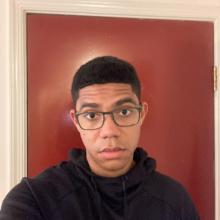
Eliud Encarnación Segura
Education
B.A. Spanish (Letras), magna cum laude, Universidad Autónoma de Santo Domingo (2020)
Research Interests
● Early Modern and Colonial Literary-Cultural Hispanic Studies
● Spanish Golden Age.
● Body, Science, and Colonial Spaces
● Aesthetics and the Iberian Atlantic
● Pedro Henríquez Ureña.
● Contemporary Dominican Literature
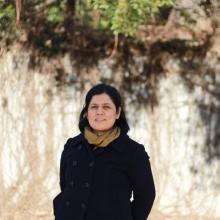
María Esparza Rodríguez
Links
Personal Website
https://maria-esparza-rodriguez.com
Education
PhD, Spanish, University of Virginia
MA, Languages, Literatures and Cultures (Spanish), University of Delaware
BA, Psychology and Spanish, University of Delaware
Publications
“El comportamiento del protagonista y la creación de la identidad nacional mexicana en La muerte de Artemio Cruz” in Camarena Castellanos, Ricardo, ed. Octavio Paz: laberintos del poeta y ensayista. 15 perspectivas críticas. Toronto: Antares Publishing, 2016.
Translations
My Beautiful Nicaragua. Dir. Joyce Chopra and Edelsin Linette Mendez. Films Bykids. PBS, Public Broadcasting Service, 5 Feb. 2019, www.pbs.org/video/my-beautiful-nicaragua-o6lvm6/.
Conference Presentations
“21st Century Mexico City through Guadalupe Nettel’s El huésped.” Carolina Conference for Romance Studies, University of North Carolina at Chapel Hill, March 26-27, 2021.
“Terror contemporáneo: vulnerabilidad y dinámicas de poder en Fuerzas especiales de Diamela Eltit.” MIFLC, James Madison University, VA. October 2016.
“Defensa y promoción.” Collaboration with Michelet McLean, Matthew Richey, Astrid Lorena Ochoa, Karina Baptista and Gonzalo Hernández-Baptista. SALALM LXI, “Nuestro norte es el sur”: Mapping Resistance and Resilience in Latin American, Caribbean, and Iberian Studies. University of Virginia, May 9 – 13, 2016.
“Bologna-Duke Summer School on Global Studies and Critical Theory.” Seminar participant in classes, readings, and discussion sessions. University of Bologna, Italy. June 22-July 3, 2015.
“Effective Error Correction in Written Assessments in the Foreign Language Classroom: Spanish 2010.” Action Research in the Foreign Language Classroom: Graduate Conference on Foreign Language Teaching and Learning, University of Virginia, USA, November 21, 2014.
“El comportamiento del protagonista y la creación de la identidad nacional mexicana en La muerte de Artemio Cruz.” Octavio Paz: Labyrinths of the Poet 2014: International Colloquium, Ottawa, Canada, March 28-29, 2014.
Invited Talks
“Muñecas, feminismos, y terror en las obras artísticas de intelectuales latinoamericanas.” Framingham State University, April 8, 2020.
“Space and Body in Contemporary Mexican Literature and Culture.” University of Minnesota, Twin Cities, Minnesota, February 2020.
“Private Life and Public Spaces in the Works of Rosario Castellanos and the Film Los adioses [The Eternal Feminine].” SIP Film Festival: Contemporary Women’s Visions from Spain, Italy, and Latin America. University of Virginia, VA. September 27-30, 2018.
Teaching
University of Virginia, Assistant Professor of Spanish, General Faculty, 2021-present
SPAN4040 Translation from Spanish to English
SPAN2020 Advanced Intermediate Spanish
University of Virginia, Instructor of Record, 2014-2021
SPAN 3300 Texts and Interpretation, Summer 2021
SPAN 3040 Business Spanish, Fall 2015; Spring 2016
SPAN 3020 Writing and Composition II, Fall 2019, Spring 2020
Topic: Writing for Social Justice and Change
SPAN 3010 Writing and Composition I, Fall 2016; Spring 2017
SPAN 2020 Advanced Intermediate Spanish, Fall 2017
SPAN 2010 Intermediate Spanish Fall 2014; Spring 2015; Summer 2015; Summer 2017; Summer 2018; Summer 2019
University of Delaware, Graduate Teaching Assistant, 2012-2014
Advanced Spanish, Spring 2014
Intermediate Spanish, Fall 2012; Fall 2013
Intensive Advanced Spanish, Instructor of Record, Winter 2013
Writing Center Assistant Fall 2012; Spring 2014
Grants and Fellowships
ACLS Emerging Voices Fellowship Research Grant, 2021
Bama Works Grant, Charlottesville Area Community Foundation, 2021
The Equity Center Fellowship, University of Virginia, 2021– 2022
Dean’s Dissertation Completion Fellowship, University of Virginia, 2019 – 2020
Center for Global Inquiry and Innovation Grant, 2019
Arts, Humanities and Social Sciences Fellowship, 2017
Office of the Dean Fellowship, University of Virginia, 2015
University of Delaware Graduate Fellowship, 2012 – 2014
ASPIRA Award of Excellence, 2006

Yafrainy Familia
Education
Ph.D., Spanish, University of Virginia (in progress)
M.A., Spanish, University of Virginia, 2022
Graduate Certificate in Women, Gender and Sexuality Studies
M.A., Creative Writing, Pompeu Fabra University, 2016
B.S., Psychology, Carlos Albizu University, 2015
A.S., Social Sciences, Essex County College, 2013
Research Interests
- 20th-21st Century Caribbean and Latinx Arts and Literatures
- Feminist Cartographies and Cultural Geography
- Visual Culture and Performance Studies
- Women, Gender and Sexuality Studies
- Diaspora, Race and Ethnicity Studies
Peer-Reviewed Articles
"Curating Transnational Feminist Solidarities in Born in Flames: Feminist Futures." Meridians: feminism, race, transnationalism, vol 24, no. 2 (forthcoming, Fall 2025).
Presentations
Panels Organized
- Chair and Organizer, “Transnational Feminisms in the Contemporary Américas,” Modern Language Association Annual Meeting, San Francisco, California. January 2023
Papers Presented
- “Stillness as Feminist Praxis: Quotidian Fugitivity in the Work of Myrna Báez and Mónica Hernández,” The Association for the Study of the Arts of the Present (ASAP/14), Seattle, Washington State. October 2023.
- “The Artist as Mapmaker: Feminist Cartographies in Contemporary Caribbean Art,” Association of Caribbean Women Writers and Scholars Conference, San José and Limón, Costa Rica. June 2023.
- “Curating Transnational Feminist Solidarities in Born in Flames: Feminist Futures,” Modern Language Association Annual Meeting, San Francisco, California. January 2023.
- “Alternative Cartographies: Remapping Landscape, Women and History in the Work of Edwidge Danticat,” Northeast Modern Language Association Annual Meeting. Baltimore, Maryland. March 2022.
- “The Power of Images: Learning Culture with Visual Texts in the Contemporary L2 Classroom,” Institute of World Languages Roundtable Series. University of Virginia, Charlottesville, Virginia. November 2021.
Teaching
SPAN 3020 – Advanced Grammar and Composition II: Fall 2023
SPAN 3010 – Advanced Grammar and Composition I: Fall 2022, Spring 2023
SPAN 2010 – Intermediate Spanish: Fall 2021, Spring 2022
Professional Development
Participant – PhD+ Writing Op-Eds Workshop Series. University of Virginia, June-August 2023.
Participant – PhD+ Graduate Instructor Seminar on the Teaching of Writing. University of Virginia, August 1-4, 2022.
Service
GSAS Student Council Representative – Academic year 2022-2023
SIP Graduate Diversity, Equity, and Inclusion Committee – Academic Years 2021-2023
“Why Graduate Education Matters” – UVA Graduate School of Arts and Sciences fundraising initiative, spearheaded by Dean China Scherz, Fall 2022
Grants, Fellowships and Awards
- Department of Women, Gender and Sexuality Studies Graduate Student Research Grant, University of Virginia. Summer 2023.
- Graduate Global Research Grant, Center for Global Inquiry and Innovation, University of Virginia. Summer 2023.
- Charles Gordon Reid Summer Travel Fellowship, Department of Spanish, Italian and Portuguese, University of Virginia. Summer 2023.
- Del Greco Annual Essay Prize for “Alternative Cartographies: Remapping Landscape, Women and History in the Work of Edwidge Danticat,” Department of Spanish, Italian and Portuguese, University of Virginia. May 2021.
- Interdisciplinary Doctoral Fellowship in Caribbean Literatures, Arts and Cultures, University of Virginia. Fall 2020-present.
- Dean’s Diversity Doctoral Fellowship, Graduate School of Arts and Sciences, University of Virginia. Fall 2020-present.
- Graduate School of Arts and Sciences Research Grant, University of Virginia, Fall 2020.
- Master’s Final Project Distinction of Excellence, Pompeu Fabra University, 2016.
- Distinguished Student Medal, Carlos Albizu University, 2015.
- Dominican Heritage Student Grant, Carlos Albizu University, 2014.

Lilian P.W. Feitosa
Lilian P. W. Feitosa finished her Ph.D. in Comparative Literature at University of Massachusetts Amherst in 2008. Her M.A. is also from UMass Amherst. She grew up in Brazil where she received her B.A. and teaching licensures in English and Portuguese from the Universidade de São Paulo before moving to the U.S. to study in 1996.
Her doctoral research surveyed all Brazilian writers translated into English, focusing on the women writers and, in particular, on Clarice Lispector, Carolina Maria de Jesus and Ana Maria Machado. Her research interests are wide ranging, from the study of gender in literary histories to Brazilian music and nation, from the representation of women and gender in picture books to children's literature in general.
She has published two articles about diasporic Afro-Brazilian children's books in the African children's literature journal Sankofa and she taught Portuguese and Brazilian culture at James Madison University from 2010-2012.
David Florez-Murillo
David Flórez-Murillo is originally from Colombia. David earned his B.A. in English Language at Universidad Tecnológica de Pereira, where he got training in the teaching of English as a foreign language and methods of qualitative research. For his B.A. research project, David conducted a study in the implementation of cultural contents for the EFL curriculum in college. After 7 years of lecturing at different universities in Colombia, David moved to the USA where he pursued his M.A. in Formal Linguistics at West Virginia University. As part of his graduate work, David conducted some research in various aspects of Hispanic Linguistics such as the contrast of intonational patterns in affiliated varieties of Spanish in Colombia, social perceptions triggered by prosodic cues, and the neutralization of the segment /n/ to [m] in Colombia, which is a rare and not very documented phenomenon in the Hispanic world. David also taught Spanish at West Virginia University for 2 years, prior to becoming part of the faculty body at UVA. Lately, David has chaired the organizing committee for the Spanish, Italian, and Portuguese Film Festival which takes place during the Spring term, and he also serves as the Course Coordinator for the Spanish Advanced Intermediate level (SPAN 2020)
Education
M.A. in Linguistics. West Virginia University, USA (2017)
B.A. in English Language. Universidad Tecnológica de Pereira, Colombia (2012)
Research Interests
- Hispanic Linguistics
- Phonology
- Dialectology
- Prosody
- First Language Acquisition
- Second Language Acquisition
- Culture in the Foreign Language Curriculum
- Contemplative pedagogy in higher education
Teaching
- University of Virginia (USA)
- SPAN-1060 (Accelerated Elementary Spanish)
- SPAN-2010 (Intermediate Spanish)
- SPAN-2020 (Advanced Intermediate Spanish)
- West Virginia University (USA)
- SPAN-101 (Elementary Spanish I)
- SPAN-204 (Intermediate Spanish II)
- SENA – Servicio Nacional de Aprendizaje (Colombia)
- English for Specific Purposes in these programs:
- Nursing
- Accounting
- Business
- Children Pedagogy
- English for Specific Purposes in these programs:
- Universidad Eafit (Colombia)
- English as a Foreign Language: Basic through Advanced Courses
- Academic Writing
- Universidad Tecnológica de Pereira (Colombia)
- English as a Foreign Language: Basic through Advanced Courses
- Universidad Libre (Colombia)
- English for Specific Purposes in these programs:
- Nursing
- Accounting
- Economics
- Microbiology
- Civil Engineering
- English for Specific Purposes in these programs:
Selected Presentations
“Incorporating Contemplative Practices in College Language Courses: A Common Approach with Different Pathways” presented at the Contemplative Practices in Higher Education 2020 Conference. Roanoke, VA. March 2020
“Social Perception Variation in two accent variables in Colombia: Paisa Accent in Medellin and Pereira” presented at The Ohio State University Congress on Hispanic and Lusophone Linguistics. Columbus, OH. March 2017
“Social Perception Variation in two accent variables in Colombia: Paisa Accent in Medellin and Pereira” presented at the Romance Languages and Literatures 6th Annual Conference, Intersections: Collage of Urban Networks, University at Buffalo. Buffalo, NY. April 2017

Melissa Frost
Zoom link Passcode: Border
Degrees
- Ph.D., Spanish. Dept. of Spanish, Italian and Portuguese, University of Virginia (2017)
- M.A., Spanish. Dept. of Spanish, Italian and Portuguese, University of Virginia (2012)
- B.A., Spanish and International Studies, University of Oregon (2010)
My ongoing research focuses on the history of traditional hallucinogenic plant consumption in Mexico during the colonial period. I trace reoccurring themes across pre-Columbian codices, colonial texts, and present-day ethnographic studies to reconstruct consumption habits, ritual contexts, and syncretisms amongst the diverse community of New Spain. I also consider how policies in the United States and Mexico affect the autonomy of present-day indigenous communities. My favorite part of my research involves visiting archives. In addition to my focus on colonial history, I am interested in discussing the evolving situation at the United States-Mexico border with my students. I have taught translation, literature, and language courses through the Department of Spanish, Italian & Portuguese since 2010.
I thoroughly enjoy advising students on their short and long-term career goals. I am particularly fond of encouraging students to embrace the study of languages and incorporate study abroad opportunities into their UVa experience. As a first-generation college graduate, I also find immense satisfaction in helping students connect with the abundant resources on Grounds that are dedicated to their success. Please call 434-924-3351 to arrange a time to meet with me!
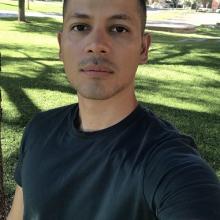
Jesús Galindo Benítez
Education
Ph.D. Spanish Literature, University of Virginia expected (2024)
M.A. in Hispanic Studies, University of Nevada, Las Vegas (2019)
- Graduate Research Certification (2018)
B.A. in Spanish, University of Nevada, Las Vegas (2015)
- Minor in Italian Studies (2015)
A.A. in International Languages, College of Southern Nevada (2012)
Research Interests
- Latin American Literature of the 20th and 21st century
- Literature of the Spanish Golden Age
- Iberian Literature of the 19th and 20th century
- Gender and Sexuality
- Queer Studies
- Minorities and underrepresented voices
- Mexican Culture
- Latin American and Spanish Cinema
- Marginalization
- Globalization
- Diaspora
Teaching
University of Nevada, Las Vegas
- Elementary Spanish I (SPAN 113) fall 2016, fall 2017, spring 2018, fall 2018
- Elementary Spanish II 2017 (SPAN 114) fall 2017, spring 2018
- Intermediate Spanish I 2018 (SPAN 213) Fall 2018
Presentations
“El homosexual y el revolucionario en El beso de la mujer araña”.Gender and Genre: Diversity in Latin American and Iberian Languages and Cultures. University of Colorado Boulder. March 16-17, 2018.
"Travestismo, machismo y la doble moral en El lugar sin límites". 4th Annual Interdisciplinary Conference in the Humanities: "World Cinema" California State University, Sacramento. Saturday October 27th, 2018.
Publications
“Recursos de Pascual Duarte: escritura, destino y presagio”. El Cid Magazine 2019
Grants & Awards
Millennium Scholarship recipient Fall 2004
Memberships
- Cervantes Society of America 2018-present
- The National Society of Leadership and Success 2015
- International Dean’s List Society 2015
- French Club of College of Southern Nevada 2013
- Organization of Vistas of Hispanic Studies (organizing committee member) 2018
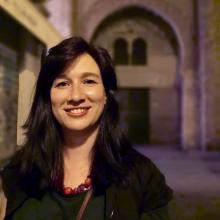
Nieves García Prados
Nieves García Prados was born in Granada (Spain). PhD in Education since 2016, with Cum Laude and International Mention. Specialized in Literary Translation and the teaching of Spanish, she obtained a degree in Journalism by the University of Málaga in 2004, a M.A. with National Radio of Spain by the Complutense University in Madrid in 2005, and another M.A. in Social Communication. She is the authorized translator into Spanish of Mary Oliver (Pulitzer Prize and Best Seller for the New York Times), Charles Simic (Pulitzer Prize and USA Laureate Poet), Natasha Trethewey (Pulitzer Prize and USA Laureate Poet) and Juan Felipe Herrera (USA Laureate Poet).
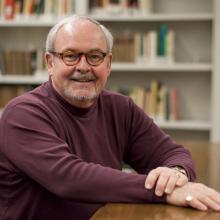
E. Michael Gerli
Research Summary
E. Michael Gerli received his Ph.D. in Hispanic Languages and Literatures from UCLA in 1972. His research interests include the social, intellectual and cultural history of the Western Mediterranean, including North Africa, from the Middle Ages through early modernity. Gerli is the author of some 200 publications on medieval and renaissance Romance literary and linguistic themes, serves on the editorial boards of numerous journals and presses in both the U.S. and abroad (Hispanic Review, Biblioteca Española del Siglo XV de la Universidad de Salamanca, University of North Carolina Studies in the Romance Languages and Literatures, Journal of Hispanic Philology, La Corónica, Medievalia, Anuario de Estudios Cervantinos, Convivencia, Cancionero General, Officina Ispanica, la Sapienza, Università di Roma, and others), and is the General Editor of Medieval Iberia: An Encyclopedia (New York: Routledge, 2003), which was selected as a Choice Academic Book for 2003.
His Celestina and the Ends of Desire, was published by the University of Toronto Press in 2011 and was awarded the Modern Language Association of America’s twenty-second annual Katherine Singer Kovacs Prize for an outstanding book published in English or Spanish in the field of Latin American and Spanish literatures and cultures. Professor Gerli’s Refiguring Authority: Reading, Writing, and Rewriting in Cervantes (Lexington: University Press of Kentucky, 1995) was chosen as an “Outstanding Academic Book” by the American Association of College and University Libraries in 1996.
The latest of his sixteen books, Cervantes: Displacements, Inflections and Transcendence was published in 2019. Gerli is also a recipient of the Hispanic Review’s Edwin B. Williams Prize (1981) and the Modern Language Association’s Division of Medieval Spanish Language and Literature’s John K. Walsh Prize (1997). In 2009 he was named Distinguished Alumnus by the University of California, Los Angeles, and in 2015 he received Sigma Delta Pi’s (the Spanish National Honorary Society’s) Order of Don Quijote, its highest award.
Professor Gerli has been Visiting Professor at the Catholic University of America (1976), UCLA (1980), the University of Maryland (1986, 1989, 2012), Johns Hopkins University (1990, 1991), the University of Virginia (1992), the University of Pennsylvania (1993), Emory University (2002), the Universidad Pontificia del Perú (2006), and Duke University (2007). He has also lectured at many universities in the United States, Europe and Latin America, served as a consultant to foundations, government agencies, and university presses, and his views on medieval and early modern Iberian intellectual history and culture have appeared in interviews with various media.
Finally, Professor Gerli has served as an elected representative to the Modern Language Association’s Delegate Assembly and twice been elected chair of the MLA’s Division of Medieval Hispanic Languages and Literatures. Prior to moving to the University of Virginia in the fall of 2000, he was Chair of the Department of Spanish and Portuguese at Georgetown University (1982-1989, and 1997-2000) and served as Andrew W. Mellon Distinguished Professor in Georgetown’s School of Languages and Linguistics.
Education
Ph.D., University of California, Los Angeles
M.A., Middlebury College
B.A., University of California, Los Angeles
Publications
Recent and Forthcoming Books
Celestina and the Ends of Desire (University of Toronto Press, 2011)
Reading, Performing, and Imagining the Libro del Arcipreste (University of North Carolina Press, 2016)
Cervantes: Displacements, Inflections, Transcendence (Juan de la Cuesta, 2019)
The Routledge Companion to the Iberian Middle Ages: Unity in Diversity (forthcoming, 2021)
Embajada a Tamorlán/Embassy to Tamburlaine: The Court of Timour at Samarcand. Attributed to Ruy González de Clavijo. An English translation and critical edition of MS 9218 of the Biblioteca Nacional, Madrid. Trans., ed., and introduction E. Michael Gerli. Dumbarton Oaks Medieval Library. Cambridge, MA. Harvard University Press, forthcoming 2022.
Selected Recent Articles
“Nuestro gozo en el pozo:’’ Pleberio and the Place without a Telos.” e-Humanistsa: The Journal of Medieval and Early Modern Iberian Studies 18 (2011) 23-37.
“Agora que voy sola”: Celestina, Magic, and the Disenchanted World.” e-Humanista: The Journal of Medieval and Early Modern Iberian Studies 19 (2011): 157-72.
"Melibea Feints." In Por s' entender bem a letra. Ed Manuel Calderón. Lisbon: Imprensa Nacional, 2011. Pp. 191-202
“The Destiny of Iberian Empire: Alfonso X and the Cultural and Political Significance of the Libro de Alexandre,” in Studies in Homage to John Esten Keller. Ed. Roger Tinnell. 93-109. Newark, DE: Juan de la Cuesta, 2011.
“From Babel to Paradise: Typologies of Speech and Language and the Quest for the Word in Cervantes’ Persiles.” e-Humanistsa: The Journal of Medieval and Early Modern Iberian Studies. Cervantes 1 (2012): 346-365.
“Cancionero/Cancioneiro.” In The Princeton Encyclopedia of Poetry and Poetics. 4th ed. Ed. Roland Greene, et al. Princeton: Princeton UP, 2012. Pp. 184-87.
“Reading Error, Finding Fault: On the Uses of Heresy in the Libro del Arcipreste.” In Two Spanish Masterpieces: Celestina and the Libro de buen amor. Ed. Ivy Corfis and Pablo Ancos. 245-273. New York: Hispanic Society of America, Seminary of Medieval Spanish Studies, 2013.
“La vida de Michael Gerli, y de sus fortunas y adversidades, escrita por su propia mano.” in ¿Por qué España? Memoria personal del hispanismo estadounidense. Ed Anna Caballé y Randolph Pope. Barcelona: Galaxia Gutenberg, 2014. 151-174.
“Translating Events, Glossing Experience: European Texts, Memory, and American Experiences.” Medievalia, Institut d’Estudis Medievales, Universitat de Barcelona, 17 (2015): 39-55.
“The Novel Before the Novel.” In The Oxford History of the Spanish Novel. Ed. J.A.G. Ardila. Oxford: Oxford UP, 2015. Pp. 56-78.
“Córdoba and Seville.” In Europe: A Literary History, 1348-1418. Ed. David Wallace. Oxford: Oxford UP, 2016. I, 138-154.
“‘As flies to wanton boys’: La ilustre fregona.” In “Los cielos se agotaron de prodigios”: Essays in Honor of Frederick A. de Armas. Ed. Kerry Wilks, Julio Vélez Sáinz, and Benjamin Nelson. Newark, DE: Juan de la Cuesta, 2016, 155-63.
“The Expulsion of the Moriscos: Seven Monumental Paintings from the Kingdom of Valencia.” In The Routledge Companion to Iberian Studies. New York, London: Routledge, 2016. Pp. 184-200.
“Sight, Scent, and Sense: Reading the Cancionero de Palacio.” In Sensory Worlds and Literature. Ed. Ryan D. Giles and Steven Wagschall. University of Toronto Press, 2017. 123-141.
“Xadraque Xarife’s Prophecy, Persiles III, 11: The Larger Setting and the Lasting Irony.” In ‘Si ya por atrevido no sale con las manos en la cabeza’: El legado del Persiles cuatrocientos años después. Ed. Mercedes Alcalá Galán, Antonio Cortijo Ocaña, Francisco Layna Ranz. Santa Barbara, CA: University of California Press. eHusmanista/Cervantes 5 (2017): 265-283.
“’Mester es sen pecado’: Libertas Inquiriendi/Vitium Curiositatis en el Libro de Alexandre.” Miriada Hispánica 16 (2018): 35-45
“A Seventeenth-Century Castilian Rendering of the Tale of Pitas Payas: Origins and Significance” La Corónica, 49.2 (2021): 322-44.
“Julian of Toledo, Don Yllán de Toledo and Exemplum XI of Juan Manuel’s Libro del Conde Lucanor.” Zeitschrift für romanische Philologie. 38 137:2 (2021): 362-82.
“En una gentil floresta: Discovery and Desire in a Fifteenth-Century Villancico.” Bulletin of Hispanic Studies 98 (2021): 453-469.
“Reflections of the Long Thirteenth Century: Curiosity, the Politics of Knowledge and Imperial Power in The Libro de Alexandre.” In The Routledge Companion to Medieval Iberia: Unity in Diversity. London, New York: Routledge, 2021. 390-407.
"In Toletum daemones: el deán de Santiago, don Yllán de Toledo, y la ética de la sapiencia." Hispanic Review 89.4 (2021): 375-95.
Plus numerous extended articles on various subjects for The Routledge Online Encyclopedia of the Middle Ages
Selected Grants & Awards
National Endowment for the Humanities (1986, 1992, 1994, 2002, 2009, 2011)
American Council of Learned Societies (1978, 1981, 1989)
Program for Cultural Cooperation between Spain’s Ministry of Culture and United States Universities (1981, 1988, 1993, 1994, 1996, 1997, 2004)
Spanish Ministry of Foreign Affairs (1998)
American Philosophical Society (1979)
Georgetown University (1977, 1983, 1984, 1986, 1987)
Programa Hispanex of Spain’s Ministry of Education, Culture, and Sport (2013, 2015, 2017)
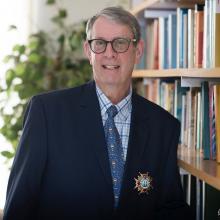
David T. Gies
Research Summary
David T. Gies is Commonwealth Professor of Spanish and former Chairman of the Department of Spanish, Italian and Portuguese. He holds a BA from Penn State University and an MA and PhD from the University of Pittsburgh. An expert on the literature of Enlightenment and Romantic Spain, and contemporary Spanish film, Professor Gies has published seventeen books and critical editions of Spanish literature. He has authored more than one hundred twenty-five articles and one hundred forty-five book reviews, and has lectured at universities in the US, Canada, England, Italy, Germany, France, Argentina and Spain. He edits Dieciocho, a journal dedicated to the study of the Spanish Enlightenment, and has been awarded numerous grants from agencies such as the Guggenheim Foundation, the National Endowment for the Humanities, the American Philosophical Society, and the Spanish Ministry of Culture. He created the website, "Cine con clase."
In 1992 he won the University of Virginia Outstanding Teaching Award. In 1999-2000 he served as Chair of the Faculty Senate, and in October 2000 he was awarded the highest recognition presented to a member of the University of Virginia community, the Thomas Jefferson Award. He is the editor of The Cambridge History of Spanish Literature (2004). Professor Gies served as Academic Dean for the maiden UVa voyage of Semester at Sea, summer 2007, again in the around-the-world voyage in fall 2010, and finally in summer 2014. In October, 2007, he was knighted (Encomienda de Número de la Orden de Isabel la Católica) by HM Juan Carlos, King of Spain. He served as President of the Asociación Internacional de Hispanistas (AIH) for the triennium 2013-2016, and was elected Presidente de Honor in 2016. Also in 2016 he was elected Honorary President of Sigma Delta Pi and Miembro Correspondiente de la Real Academia Española.
Education
Ph.D., University of Pittsburgh
M.A., University of Pittsburgh
B.A., Penn State University
Publications
Books
Eros y amistad. Estudios sobre literatura española (siglos XVIII y XIX) (Barcelona: Calambur, 2016)
José Zorrilla. Don Juan Tenorio (ed.) (Madrid: Castalia, 2016)
A History of Theater in Spain (Cambridge University Press, 2012)
The Cambridge History of Spanish Literature (Cambridge University Press, 2004)
The Cambridge Companion to Modern Spanish Culture (Cambridge University Press, 1999)
The Theatre in Nineteenth-Century Spain (Cambridge University Press, 1994)
Theatre and Politics in Nineteenth-Century Spain: Juan de Grimaldi as Impresario and Government Agent (Cambridge University Press, 1988)
Nicolás Fernández de Moratín (Boston: G.K. Hall, 1979)
Agustín Durán. A Biography and Literary Appreciation (London: Támesis, 1975)
Selected Articles
"La ilustración ilustrada: El XVIII en el cine español." Homenaje a Melchora Romanos (in press).
"María Rosa Gálvez de Cabrera, La familia a la moda (1805) and the Multiple Anxieties of Late Nineteenth-Century Spain." Anales de Literatura Española 41.4 (2016): 149-172.
"'Volvía Galdós triunfante'. Fortunata y Jacinta on Stage (1930)." Homage volume for Professor Harriet S. Turner (in press).
"Nipho y el teatro: Entre la teoría y la práctica." Francisco Mariano Nipho. El nacimiento de la prensa y de la crítica literaria periodística en la España del siglo XVIII. Madrid: CSIC, 2015. 99-109.
"Ese oscuro —y rico— objeto de deseo, o Hecho en América: El indiano romántico-teatral." In La tribu liberal. El romanticismo en las dos orillas del Atlántico. Eds. José María Ferri Coll y Enrique Rubio Cremades. Madrid/Frankfurt: Iberoamericana/Vervuert, 2015. 299-309.
"Carmen Martín Gaite in Virginia." Hispania 98.4 (2015): 670-671.
"Dionisio Solís, o el arte de escribir, traducir y refundir." Autores/traductores en la España del siglo XIX. Eds. F. Lafarga y L. Pegenaute. Kassel: Edition Reichenberger, 2016. 71-77.
"Hispanista por casualidad: Mi viaje por la literatura y la cultura españolas." In ¿Por qué España? Memorias del hispanismo estadounidense. Ed. Anna Caballé y Randolph Pope. Barcelona: Galaxia Gutenberg, 2014. 191-219.
"'Such is Glorious War': British Reflections on the Peninsular War in Spain." Bulletin of Spanish Studies 91 (2014): 1-12.
“Playing the Enlightenment. Eighteenth-Century Spain on the Nineteenth-Century Stage.” Bulletin of Spanish Studies 86.1-2 (2009): 225-237.
“Teatro y mujer en el siglo XIX.” Stichomythia 8 (2009): 3-5. (on-line). Please click here for access.
“Larra y la literatura europea de su tiempo.” Fígaro de vuelta (1809-2009). Catalogue exhibition at the Biblioteca Nacional. Madrid: SECC, 2010. 107-126.
“El ‘efecto Funes’: La historia literaria en el siglo XXI.” In Obra en marcha. Ensayos en honor de Richard A. Cardwell. Eds. Jean Andrews and Stephen Roberts. Nottingham: CCCP, 2009. 8-19.
“Don Juan Tenorio, estrella de cine: Zorrilla, Mercero, Barrera.” La Literatura Española del Siglo XIX y las artes. IV Coloquio de la Sociedad de Literatura Española del Siglo XIX. Barcelona: U de Barcelona, 2008. 163-174.
“El otro Larra: Luis Mariano de Larra y Wetoret, dramaturgo ‘desconocido’ de la segunda mitad del siglo XIX (con apéndice de títulos).” Anales de Literatura Española 20 (2008): 241-257.
“La reacción antifeminista en algunas obras teatrales del siglo XIX español.” In ‘Una de las dos Españas…’. Representaciones de un conflicto identitario en la historia y en las literaturas hispánicas. Estudios reunidos en homenaje a Manfred Tietz. Ed. Gero Arnscheidt and Pere Joan Tous. Madrid/Frankfurt: Iberoamericana/Vervuert, 2007. 499-515.
“Spanish Theater and the Discourse of Self-Definition.” Revista de Estudios Hispánicos 34 (2000): 433-442.
“Sensibilidad y sensualismo en la poesía dieciochesca.” Ideas en sus paisajes. Homenaje al profesor Russell P. Sebold. Eds. Guillermo Carnero, Ignacio Javier López y Enrique Rubio. Alicante: Universidad de Alicante, 1999. 215-225.
“Sobre el erotismo rococó en la poesía del siglo XVIII español.” Luz vital. Estudios en homenaje a Víctor Ouimette. Eds. Jesús Pérez Magallón y Ramón F. Llorens. Almería: Universidad de Almería, 1999. 85-95.
“Forner, la amistad y la patria: La escuela de la amistad, o el filósofo enamorado (1796).” Juan Pablo Forner y su época. Ed. Jesús Cañas y Miguel Ángel Lama. Cáceres: Editora Regional de Extremadura, 1998. 449-460.
“Todo ha de parar en bien: El teatro en España en 1898.” España fin de siglo. 1898. Ed. María del Carmen Iglesias. Barcelona: Fundación La Caixa, 1997. 185-190.
“Confessions of a Converted Chairman: My Life with Teacher Education.” ADFL Bulletin 28.2 (Winter 1997): 21-25.
“Spain Today: Is the Party Over?” Virginia Quarterly Review 72.3 (Summer 1996): 392-407.
Selected Grants & Awards
Encomienda de Número de la Orden de Isabel la Católica, by HM Juan Carlos, King of Spain
President of the Asociación Internacional de Hispanistas (AIH), 2013-2016
Thomas Jefferson Award (2000)
University of Virginia Outstanding Teaching Award (1992)
For a full list of awards and publications, please consult his C.V.
Esperanza Górriz Jarque
Education
M.A., Teaching Spanish as a Foreign Language, Menéndez Pelayo International University & Cervantes Institute (expected May 2022)
M.A., Spanish and Linguistics, West Virginia University (2013)
Certificate in University Teaching, West Virginia University (2013)
M.A., English as a Foreign Language, University of Murcia, Murcia (Spain) (2008)
B.A., Translation and Interpretation, University Jaume I, Castellón (Spain) (2007)
Areas of Interests in Teaching
Students’ Metacognition Pedagogy: Reflective Thinking, Development of Learning Strategies, Setting of Learning Goals, Awareness of Self and Target Culture
Contemplative Sciences Pedagogy: Uses in the Foreign Language Class to Reduce Stress and Anxiety, Improvement of Self-Efficacy Believes, Development of Gratitude and Compassion
Student Centered Pedagogy: Gamification, Universal Design, Collaborative Learning, Increasing Students’ Motivation, Creation of Meaningful Interpersonal Experiences, Equity in and outside the Classroom, Attention to Diversity, Inclusive Teaching, Connection with Personal and Interdisciplinary Interests, Integrated Performance Assessments, Multiple Intelligences, Cognitive Grammar
Teaching
University of Virginia (2013-current)
- Span 3010: Grammar and Composition I
- Span 2020: Advanced Intermediate Spanish
- Span 2010: Intermediate Spanish
- Span 1020: Elementary Spanish
- Span 1010: Initial Spanish
West Virginia University (2011-2013)
- Span 101: Beginner Spanish
- Span 203: Intermediate Spanish
- Span 204: Advanced Intermediate Spanish
Other Teaching Experience
Middle and High School Spanish Teacher, Youngstown City Schools (2008-2011)
- Span I: Spanish for Beginners I
- Span II: Spanish for Beginners II
English Instructor, English Summer School, Valencia, Spain (2008)
Language Courses Organizer: Academia Suárez Language House, Frankfurt, Germany (2007)
Selected Professional Development
- C3 Design, Center for Teaching Excellence, U. of Virginia, June 2020
- Virtual Teaching for Fall: Exploring Possibilities, Learning Design & Technology, U. of Virginia, May 2020
- Facilitated Experience: Creating Well-Paced, Socially Connected Summer Courses, Center for Teaching Excellence, U. of Virginia, May 2020
- VoiceThread and Flipgrid: Tools for Speaking Assignments in Virtual Courses, Learning Design & Technology, U. of Virginia, May 2020
- UVa Collab Tests and Quizzes Overview, Learning Design & Technology, U. of Virginia, May 2020
- Intro to Zoom for Interactive Class Sessions, Learning Design & Technology, U. of Virginia, May 2020
- Teaching Equitability in a Crisis, Center for Teaching Excellence, U. of Virginia, April 2020
- Teaching through a Pandemic: A Space for Reflection and Sharing, Center for Teaching Excellence, U. of Virginia, April 2020
- Development of Teaching Competences, Cervantes Institute, April-May 2020
- How to do Group and Pair Work in the Online Classroom?, Institute of World Languages - Online Teaching Series, U. of Virginia, April 2020
- Cultivating Compassionate Teaching during the Coronavirus, Contemplative Mind in Higher Education, April 2020
- How We are Teaching Online: Tips and Strategies for Effective Course (Re)design, Institute of World Languages - Online Teaching Series, U. of Virginia, April 2020
- Assessment in Virtual Language Teaching: An Open Sharing Session for UVA Language Instructors, Learning Design & Technology, U. of Virginia, March 2020
- Conversation about Embodied and Experiential in an Online Environment, Center for Teaching Excellence, U. of Virginia, March 2020
Selected presentations
- Incorporating Contemplative Practices in College Language Courses: A Common Approach with Different Pathways, presented at Contemplative Practices in Higher Education Conference, Roanoke, VA, March 2020
- Implementing Virtual Reality in Language Classrooms, presented at Institute of World Languages Roundtable, U. of Virginia, February 2020
- Uses of E-portfolio and Contemplative Pedagogy, Group Discussion, presented at Digi(cation) Con(ference), U. of Virginia, November 2019
- Virtual Reality: 3600 pictures and videos with Google Cardboard, presented at the U. of Virginia Teaching with Technology Summit, U. of Virginia, October 2019
- E-Portfolio Reflections: Meaning Making Tools to Enrich the Learning Experience, presented at AAEEBL SE Regional Conference, University of Virginia, November 2017.
- E-Portofolio: Usos y aplicaciones prácticas en la clase de ELE a la hora de dar retroalimentación, ProfedeEle Summit, Valencia, Spain, July 2017
- Mobilizing Peer Feedback and e-Portfolios for Powerful Collaborative Learning, presented at V Innovations in Pedagogy Summit, U. of Virginia, May 2017
- Table Games in the Classroom, presented at Immersion Weekend for Spanish High School Teachers, West Virginia University, April 2013
- The Madrid Scene, presented at Meetings of Instituto Cervantes in Academia Suárez Language School, Frankfurt, Germany, October 2007
Grants and Awards (at UVa)
- Grant from Institute of World Languages for Spanish Tertulia, University of Virginia (2017-present)
Involvement at UVa:
- General Faculty Council Faculty of Arts and Sciences, Fall 2020-2023
- Span 2010 Co-coordinator, Fall 2020-Spring 2023
- Contemplative Research & Scholarship Community, Fall 2019 - present
- Contemplative Teaching & Learning Faculty Community, Fall 2019 - present
- Co-organizer: XXXVIII Congreso y Asamblea de ALDEEU: Thomas Jefferson y el universo hispano.
- Co-organizer of the Spanish, Italian, & Portuguese (SIP) Film Festival
- Co-organizer of the Spanish Cultural Weekly Newsletter
- Co-organizer of the Spanish Tertulia
- Training from 'Safe Space'
- Training from 'DREAMers on Grounds: UndocuAlly'
- Implicit Bias Intervention Workshop.
- Diversity Dialogues Workshop
- Survivor Support Network Training
Professional Organizations
- Sigma Delta Pi
- ACTFL
- AATSP
Certifications
DELE Examiner: A1-A2, A2-B1 Scholar, B1-B2, C1-C2

David T. Haberly
From 1973 until May 2010, Profesor David T. Haberly taught courses in Brazilian literature and history, as well as 19th century literatures and cultures of the Americas.
A selection of his articles is available for download here; click here to access his monograph on the history of race and racial representations in Brazilian literature.
David Haberly remains an active presence at department events, especially the Tibor Wlassics Faculty Lecture series.
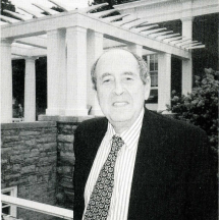
Javier Herrero
From 1979 until 2002, Professor Javier Herrero taught courses in Spanish literatures and cultures at the University of Virginia. He authored and co-authored some 25 books in his distinguished career as a scholar of the early modern era and the 18th-20th centuries.
Please find here an extensive biography, which glosses Professor Herrero's many accomplishments in research and teaching.
On April 2, 2023, Professor Herrero passed away in Charlottesville. He is remembered fondly by his students and colleagues.
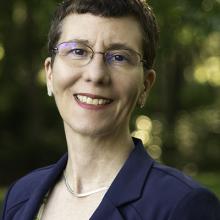
Jennifer Hogg
Book time with Hogg, Jennifer Lynn (jlh8m): Office hours
Jennifer Hogg brings more than two decades of experience in the fields of education and legal editing to UVA. She has training in translation and interpretation in community, medical, and legal settings. Her work in language pedagogy has included teaching in the secondary classroom, adult GED preparation classes in Spanish and in English for English language learners, as well as Spanish courses for medical professionals.
Ms. Hogg has provided editing and translation assistance to the Philip S. Hench Walter Reed Yellow Fever Online Collection maintained by UVA’s Claude Moore Health Sciences Library and for the Spanish translation of What Your Kindergartner Needs to Know by UVA professor emeritus E.D. Hirsch, Jr. In addition, she worked as a bilingual editor for the Code of Puerto Rico and the Opinions of the Supreme Court of Puerto Rico. Throughout her distinguished career, Hogg has received awards for outstanding teaching along with fellowships to pursue professional development in teaching.
After earning a bachelor’s degree in international relations from the College of William and Mary, Ms. Hogg pursued studies in literature at both the University of Guadalajara (Mexico) and the University of Virginia. She earned a M.Ed. in special education from the University of Virginia. She holds K-12 teaching endorsements in Spanish, social studies, special education, technology education, and business education.
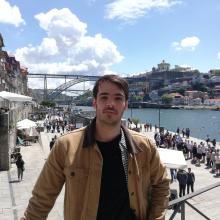
Jesús Játiva Fernández
Education
Ph.D., University of Virginia (Spanish, expected 2024)
M.A., Auburn University (Spanish, 2019)
M.A., Universidad de Valencia (English, 2016)
B.A., UNED (English, 2015)
Research Interests
- Comic books
- Gender Studies
- Cultural Studies
- Film
- Contemporary Spanish Novel
Teaching
FLSP 1010 (Fall 2018 & Spring 2019).
Publications
Játiva Fernández, Jesús. “GeorgeSaundersLand: parques temáticos como espacios hostiles” in Representaciones del espacio hostil en la literatura y en las artes. Editorial Andavira, 2017
Presentations
“George Saunders Land: parques temáticos como espacios hostiles,” Congreso Internacional «Representaciones del espacio hostil en la literatura y en las artes: imágenes y metáforas», Universidad Complutense de Madrid, Spain, May 2017.
“Surreal Theme Parks as Enhancers of World Building in George Saunders’ Fiction,” Northeast Modern Language Association, University at Buffalo, Pittsburgh, PA, April 2018.
"All of them are men: Ironic Masculinities in Luis Bustos and Santiago García’s ¡García!”, Northeast Modern Language Association, University at Buffalo, Washington DC, March 2019.
"Creando emoción: afecto y cuestionamiento de las masculinidades en ¡García, de Santiago García y Luis Bustos", South Atlantic Modern Language Association, Atlanta, GA, November 2019.
María J. Jorquera Hervás
Education
Ph.D., Literatures, Cultures and Languages, University of Valencia
M.A., Spanish Literature, The Pennsylvania State University (2015), magna cum laude
Teaching with Technology Certificate, The Pennsylvania State University (2014)
B.A., Translation and Interpretation, University of Valencia (2012)
M.Ed., Secondary Education, Universidad Católica de Valencia (2009)
Year Abroad, Latin American Studies and English Linguistics, University College London (2008)
B.A., English Philology, University of Valencia (2008)
Research Interests
- Second Language Acquisition
- Communicative and Proficiency-Based Pedagogy
- Instructional Technology
- Sociocultural Animation in Learning
- Education Abroad
- Creative Translation
- Institutional Translation and Interpreting
- 19th and 20th Century Peninsular Spanish Literature
- Women’s Studies
- The Avant-Garde
- Literary Theory
Teaching
United States
University of Virginia (2015-Present)
- SPAN 1010 Elementary Spanish I
- SPAN 1020 Elementary Spanish II
- SPAN 2010 Intermediate Spanish
- SPAN 2020 Advanced Intermediate Spanish
- SPAN 4040 Translation from Spanish to English
- Engaging Aesthetics (Fall 2022)
- Engaging Differences (Fall 2022)
The Pennsylvania State University (2013-2015)
- SPAN 002 Elementary Spanish
- SPAN 003 Intermediate Spanish
St. Bonaventure University (2012-2013)
- SPAN 101 Elementary Spanish
- SPAN 102 Intermediate Spanish
Study Abroad
University of Virginia – Hispanic Studies in Valencia (Summer 2015, 2016, 2017)
- SPAN 2020 Advanced Intermediate Spanish
- SPAN 3030 Cultural Conversations
- SPAN 3050 Spanish for Medical Professionals
Spain
- Españolé Instituto Cervantes Accredited Center, Valencia
- Elementary, Intermediate and Advanced Spanish courses (Summer 2014)
- Juan XXIII Middle and High School, Valencia
- Elementary, Intermediate and Advanced English courses (2011-2012)
- University of Valencia, Language Center
- Intermediate and Advanced English courses (Summer 2011)
- Gran Asociación Middle and High School, Valencia
- Elementary and Intermediate English courses (2009)
Freelance Translation
International Council on Social Welfare (ICSW) Global monthly Newsletters (2013-2017)
Presentations
“Madre-Tierra, Madre Cósmica en el pensamiento intelectual de Gabriela Mistral”, III International Conference "FEmale Creations in Literary and Intercultural Education" July 14th-16th, 2022 Universitat de València - Facultat de Magisteri Valencia (Spain)
“El camino identitario en la poesía de Concha Méndez: melancolía de la maternidad”, III International Conference "FEmale Creations in Literary and Intercultural Education" July 14th-16th, 2022 Universitat de València - Facultat de Magisteri Valencia, Spain
“Imagen especular como superación del lenguaje en La hora de la estrella”, XXX AEGS/AGSS Conference: “Redes trasatlánticas. Re-presentar y re-conocer: Cinco siglos de iniciativas y aportes por parte de las mujeres hispánicas”, Santo Domingo, Dominican Republic, 2020.
“María Eugenia contra sí misma: el intento frustrado de empoderamiento en Ifigenia de Teresa de la Parra”, XXIX AEGS/AGSS Conference: “CreadorAS en la Educación Literaria e Internacional”, Universitat de València - Facultat de Magisteri Valencia, Spain, 2019.
“Student Motivation and Meaningful Learning in the ePortfolio”, AAEEBL SE Regional Conference, University of Virginia, 2017.
“Madres a Hijas: Mujer y Memoria en la Poesía de Juana Castro”, Congreso Internacional de Literatura Española Contemporánea (CILEC XVIII), Universidade Fernando Pessoa, Oporto, Portugal, 2017.
“Women in Spain”, St. Bonaventure University, New York, 2013.
“Spanish Culture and History”, Allegany-Limestone Central School, New York, 2013.
“Sharing your culture”, Fulbright Foreign Language Teaching Assistants Conference, Washington, D.C. 2012.
Grants & Awards
Excellence in Teaching Award, The Pennsylvania State University, 2015
Translation and Interpretation Grant, Civil Society Forum, United Nations DESA and NGO Committee for Social Development, UNHQ, New York, 2013
Graduate Assistantship, Dept. of Spanish, Italian and Portuguese, The Pennsylvania State University, 2013
Fulbright Foreign Language Teaching Assistant Program, IIE and U.S. Department of State, 2012
Translation Grant, Unit DGT.C.ES.01 “Law, citizenship, administrations and external relations”, European Commission, Directorate-General for Translation, Brussels, Belgium, 2010
Erasmus Grant, University College London, UK, 2007
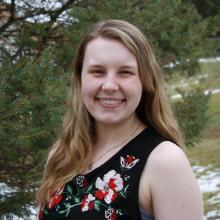
Amanda Krehbiel-Nadri
Education
- M.A., Spanish, University of Virginia (expected 2019)
- B.A., Spanish-Latin American, Caribbean, Latino Studies (with Departmental Honors), Gettysburg College (2017), magna cum laude
Research Interests
- Southern Cone Literature
- National Figures (especially Eva Perón) and Nationalism
- Islam in Latin America
- Arab and of-Arab-descent authors and characters in Latin American Literature
- Latin American Cinema
Teaching
- Intermediate Spanish (SPAN 2010): Fall 2017–Spring 2018
- Accelerated Elementary Spanish (SPAN 1060): Fall 2018
Presentations
El mito de Evita: entre la mujer y el mito argentino en Santa Evita de Tomás Eloy Martínez, y "La señora muerta" de David Viñas, "Evita vive" de Néstor Perlongher, y "Esa mujer" de Rodolfo Walsh. ILASSA 36, Austin, Texas, 5 March 2016.
Grants and Awards
- Charles Killian Woltz Summer Language Stipend, University of Virginia (Summer 2018)
- Phi Beta Kappa, Gettysburg College (2017)
- Miguel Cervantes Award for Spanish, Gettysburg College (Fall 2015)

María Inés Lagos
Research Summary
María Inés Lagos is Professor of Spanish at the University of Virginia. Born in Santiago, Chile, she did her undergraduate work in Hispanic Literatures and Classics at the Catholic University of Valparaíso, and her M.A. and Ph.D. at Columbia University in New York. She has taught at The City College (CUNY), Dartmouth College, several summers at the Spanish Summer School at Middlebury College in Vermont (between 1980 and 1986), was a visiting faculty at Vassar College (Fall 1983), and from 1980 to 1988 an Assistant Professor at the State University of New York at Binghamton where she directed CUSH (Center for the Study of US Hispanics), 1987-88. From 1988 to 2002 at the Department of Romance Languages and Literatures at Washington University in St. Louis, she also taught courses in the Women's Studies Program. In 1995 she started and then directed Washington University's Study Abroad Program in Santiago, Chile; was a member of the Women's Studies executive committee (1992-2002), and for ten years coordinated the Women's Studies reading group in feminist theory (1991-2001); was president elect (1996-97) and president (1997-98) of the Association of Women Faculty (AWF) in the Danforth Campus. She joined the faculty of the Department of Spanish, Italian and Portuguese at the University of Virginia in August 2002, serving as departmental chair (2007-2010). She is editorial board member for Revista de Estudios Hispánicos, Revista Nomadías (University of Chile), and reader for several journals and university presses. Her main fields of concentration are 20th and 21st century Latin American narrative, Latin American women’s fiction and autobiographical writing, and gender theory.
For a full list of Professor Lagos's publications, awards, and interests in research and teaching, please consult her C.V.
Education
Ph.D., Columbia University, New York
M.Ph., Columbia University, New York
M.A., Columbia University, New York
Publications
Books
Hechura y confección: escritura y subjetividad en narraciones de mujeres latinoamericanas. Santiago de Chile: Cuarto Propio, 2009.
En tono mayor: relatos de formación de protagonista femenina en Hispanoamérica. Santiago: Cuarto Propio, 1996. Manuscript was finalist in University of Miami’s “1995 Letras de Oro” competition.
H. A. Murena en sus ensayos y narraciones: de líder revisionista a marginado. Santiago: Ediciones del Maitén, 1989.
Edited Volumes
Contributing editor in charge of Latin American authors to Who’s Who in Contemporary Women’s Writing, Jane Elridge Miller, editor. New York: Routledge, 2001.
Creación y resistencia: la narrativa de Diamela Eltit, 1983-1998. Editor. Monographic Series of Revista Nomadías (Gender and Cultural Studies Journal, University of Chile). Editor. Santiago: CEGECAL / Editorial Cuarto Propio, 2000. It includes my presentation and an essay.
La palabra en vilo: narrativa de Luisa Valenzuela. Co-editor. It includes my presentation and an essay. Santiago: Cuarto Propio, 1996.
Exile in Literature, Editor. Lewisburg, PA: Bucknell UP, 1988. It includes my introduction and an article on exile in contemporary Latin American literature.
Selected Articles
Forthcoming: “Ana Mendieta’s Diasporic Life: Reflections on Nancy Morejón’s Elegy as Published in Ediciones Vigía.” Afro-Hispanic Review, 2017.
“Displaced Selves: Exile and Migration in Latin American Women’s Writing (1980-1995).” The Cambridge History of Latin American Women’s Literature. Eds. Ileana Rodríguez and Mónica Szurmuk. Cambridge: Cambridge U P, 2015. 326-340.
“Inés de Suárez: ¿Fundadora y madre de la nación?,” Cuadernos Hispanoamericanos (Madrid): 781-782 (2015): 52-65. Dossier on “Mujeres españolas en ultramar.”
“Dictadura y (des)madre: Mina cruel de Alicia Borinsky.” Confluencia, 28, 1 (November 2012): 2–13.
“Mujer y ciudad en narraciones de tres escritoras chilenas: Eltit, Maturana y Fernández.” Chile urbano: La ciudad en la literatura y el cine. Ed. Magda Sepúlveda Eriz. Santiago de Chile: Centro de Estudios de Literatura Chilena / Editorial Cuarto Propio, 2012. 263–77.
“Nancy Morejón ensayista: la ciudad letrada desde una perspectiva cubana.” Revista Iberoamericana, LXXVII, 235 (April-June 2011): 539–556. Special issue devoted to Nancy Morejón. Juanamaría Cordones-Cook and Keith Ellis, editors.
“Entre Cambios y simetrías: el síndrome de Penélope en dos cuentos de Luisa Valenzuela: ‘Ceremonias de rechazo’ y ‘Viaje’”. En buena compañía. Estudios en honor de Luciano García Lorenzo. Eds. Joaquín Álvarez Barrientos, et al. Madrid: Consejo Superior de Investigaciones Científicas, 2009. 1171–1179.
“Subjetividades corporalizadas: Maldito amor de Rosario Ferré y Jamás el fuego nunca de Diamela Eltit”. Nomadías. Centro de Estudios de Género y Cultura en América Latina. U de Chile. Noviembre 2009, 10: 87–110.
“Cortes, asimetrías, fisuras: Diamela Eltit y su poética de aparente (sólo aparente) caotización”. Hofstra Hispanic Review 2, 5 (Summer 2007): 139–52.
“Conversación con Diamela Eltit a propósito de Jamás el fuego nunca”. Hofstra Hispanic Review 2, 5 (Summer 2007): 109–116.
“Género y representación literaria en la construcción de Eva Perón: narraciones de Abel Posse, Alicia Dujovne Ortiz y Tomás Eloy Martínez.” Revista Chilena de Literatura 68 (2006): 73–103.
“Hechura y confección: autorreflexión, escritura y subjetividad en dos novelas de escritoras hispanoamericanas, En breve cárcel de Sylvia Molloy y Escenario de guerra de Andrea Jeftanovic”. Revista de Estudios Hispánicos 40, 2 (2006): 405–28.
“Exilio y subjetividad: textos de Sylvia Molloy, Tununa Mercado e Isabel Allende”. Revista Mal /Estar 5, 4 (Buenos Aires, December 2005): 129–35.
“Conflicting Body Signs in Rosario Ferré’s ‘La muñeca menor’.” Revista de Estudios Hispánicos 37 (2003): 167–87.
“Female Voices from The Borderlands: Isabel Allende’s Paula and Retrato en sepia”. Special Issue: Isabel Allende Today. Editors: Rosemary G. Feal and Yvette E. Miller. Latin American Literary Review 30, no.60 (2002): 112-127.
“Sujeto mujer y gobierno militar en Conversación al sur de Marta Traba.” Las grietas del proceso civilizatorio. Ana Pizarro, editor. Santiago: LOM, 2002. 53–68.
“Sujeto y representación: viaje al mundo del Otro en narraciones de Julio Cortázar, Luisa Valenzuela y Clarice Lispector.” Letras femeninas (2001) XXVII, No. 1. Special Issue devoted to Luisa Valenzuela. Edited by Juanamaría Cordones-Cook. 68–82.
“Lenguaje, género y poder en Los vigilantes de Diamela Eltit.” Creación y resistencia: la narrativa de Diamela Eltit, 1983-1998. M. I. Lagos, editor. Monographic Series of the Journal Nomadías. Santiago: CEGECAL / Editorial Cuarto Propio, 2000. 129–47.
“Deconstrucción del estereotipo hispánico en narraciones de Julia Alvarez, Cristina García y Esmeralda Santiago.” Studies in Honor of Myron Lichtblau, Fernando Burgos, editor. Newark: Editorial Juan de la Cuesta, 2000. 195–214.
“Balún-Canán: una novela de formación de protagonista femenina.” Revista Hispánica Moderna, Vol. L, No. 1 (June 1997): 159–79.
“Cuerpo y subjetividad en narraciones de Andrea Maturana, Ana María del Río y Diamela Eltit.” Revista Chilena de Literatura, No. 50 (1997): 97–109.
“Sujeto, sexualidad y literatura en ‘Cambio de armas’ y Novela negra con argentinos de Luisa Valenzuela.” La palabra en vilo: narrativa de Luisa Valenzuela. Gwendolyn Díaz and María Inés Lagos, eds. Santiago: Cuarto Propio, 1996. 131-61.
“Displaced Subjects: Valenzuela and the Metropolis.” World Literature Today 69, 4 (Fall 1995): 726–32.
“Confessing to the Father: Marks of Gender and Class in Ursula Suárez's (1666–1749) Relación.” MLN 110 (1995): 353–84. Reprinted in translation: “Cumplir con la obediencia al padre: género y clase en la Relación autobiográfica de Úrsula Suárez.” Memoria. Revista de Estudios Biográficos (Universitat de Barcelona, Spain), 3, (2006): 57–76.
“Relatos de formación de protagonista femenina en Hispanoamérica: desde Ifigenia (1924) hasta Hagiografia de Narcisa la bella (1985).” Chapter from En tono mayor, reprinted in Narrativa Femenina en América Latina: Prácticas y perspectivas teóricas. Sara Castro-Klarén, ed. Frankfurt (Germany): Iberoamericana / Vervuert, 2003. 237-57.
“Familia, sexualidad y dictadura en Oxido de Carmen de Ana María del Río,” Special Issue of Inti. Revista de Literatura Hispánica, The Configuration of Feminist Criticism and Theoretical Practices in Hispanic Literary Studies, 40 (Fall 1994): 207–17. Edited by Cynthia Duncan.
“Reflexiones sobre la representación del sujeto en dos textos de Diamela Eltit: Lumpérica y El cuarto mundo.” Una poética de literatura menor: la narrativa de Diamela Eltit. Juan Carlos Lértora, ed. Santiago: Ediciones Cuarto Propio, 1993. 127–40.
“Estructura dual y sociedad patriarcal en María,” Revista de Estudios Colombianos 8 (1990): 12–20. Reprinted in Estudios Colombianos. Asociación de colombianistas, Veinte años / 1983–2003. Edition and introduction by José Eduardo Jaramillo Zuluaga. Medellín: Fondo Editorial BPP, 2005. 217–34.
“El testimonio creativo de Hasta no verte, Jesús mío,” Revista Iberoamericana 150 (1990): 243–53.
“Mujer y política en Cambio de armas de Luisa Valenzuela,” Hispamérica 46–47 (1987): 71–83.
“En busca de una identidad: individuo y sociedad en Balún-Canán de Rosario Castellanos,” Texto crítico 12, 34–35 (1986): 138–59.
“Sumisión y rebeldía: el doble o la representación de la alienación femenina en narraciones de Marta Brunet y Rosario Ferré,” Revista Iberoamericana, 132-33 (July-Dec. 1985): 731–749.
“A Space of Her Own: The Second St. Poems by Chicana Poet Beverly Silva.” This essay is the book’s introduction. Ypsilanti, MI: The Bilingual Review Press, 1983. 9–32.
“Historia y escritura: Sarmiento y Gálvez,” Symposium 36, 4 (Winter 1982–83): 330–338.
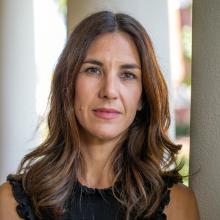
Alicia López Operé
Please email me for questions about SPAN 3000 level courses.
University of Virginia, 2014 – present
Director of Undergraduate Programs
University of Virginia in Valencia, advisor, promotion
Contemplative Faculty with the CSC
Education
Ph.D. in Spanish, University of Virginia, 2009
M.A. in Spanish, University of Virginia, 2004
Bachelor of Arts in Spanish Philology, Universidad Complutense de Madrid, Spain, 2001
Dissertation
“Poetas del siglo XXI. Los caminos de la poesía joven española”
Research Interests
- 20th-21th century Spanish poetry, theater and poetic performance
- Contemplative Pedagogies
- Language for the Professions
Teaches:
- SPAN 3300: Text and Interpretation
- SPAN 3050: Spanish for Medical Professionals
- SPAN 3410: Survey of Spanish Literature II (1800 to present)
- SPAN 3010: Grammar and Composition
- SPAN 3020: Advanced Grammar and Composition
Publications
“Mirada de mujer a mujer. Notas sobre El color de agosto, de Paloma Pedrero”, en Historia de un escenario. Cuarenta años de teatro en español en la Universidad de Virginia. Fernando Operé and Fernando Valverde eds. Valparaíso USA and Sonámbulos Ediciones, 2020.
“Anverso y Reverso de un Comienzo: Parelelos Temáticos y Simbólicos en Génesis de la luz y Biografía sola, de Jaime Siles” en La poesía de Jaime Siles: desvelo del lenguaje. Madrid: Siglo XXI, 2014.
Book reviews
Second Edition of Tornasol. Guía para la interpretación de textos literarios y cine. Antonio Sobejano-Morán. Wilkes Barrea, PA: Panda Publications, 2017.
Sixth Edition of Puentes. Spanish for Intensive and High-Beginners Courses. Patti J. Marinelli and Lizette Mujica Laughlin. Boston: Heinle Cengage Learning, 2014.
Rivero, Isel. Words Are Witnesses / Las Palabras Son Testigos. Madrid: Verbum, 2010. Reviewed in Cuadernos de Aldeeu, 24 (2012): 287-289.
Recent presentations and panel/conference organizer
“The Compassionate Reader. New Approach to Feedback and Peer Review” as part of the panel “New writing assignments for language, film, and composition courses.” Institute of World Languages round table, University of Virginia (speaker and organizer.) November, 2019.
“Prácticas pedagógicas contemplativas en la enseñanza de lengua extranjera”. Alicia López Operé, Esther Poveda Moreno y Zaida Villanueva García. Spanish Professionals in America. XXXIX Congreso Internacional de ALDEEU. Valencia, Spain, June 2019 (speaker and conference organizer).
“Movement practice” as part of “Contemplative Pedagogy in World Languages”. Institute of World Languages Annual Faculty Retreat. May, 2019.
“Final Project Presentation: a Student-Centered Symposium in Spanish for Medical Professionals”, as part of the panel “Languages in the Real World: A Showcase of Learning Projects in Language for Specific Purposes courses at UVA.” Institute of World Languages round table, University of Virginia. April, 2019.
"Jornada de relajación". Alicia López-Operé, Esther Poveda Moreno, Zaida Villanueva García. Language Commons students activity. University of Virginia, April 2019 (presenter and co-organizer).
“3D Printing for Medical Spanish. A collaborative project showcase.” Teaching with Technology Summit. University of Virginia. October, 2018. XXXVIII Congreso Internacional de ALDEEU. University of Virginia, June 2018 (conference organizer).
“De la poesía de la experiencia a la experiencia fragmentada: dos jóvenes poetas españoles del siglo XXI”. MIFLC Mountain Interstate Foreign Languages Conference, College of Charleston, October 2015.
“Síntesis dramática. Microteatro español en el siglo XXI”. Carolina Conference on Romance Languages. UNC – Chapel Hill, April 2015.
“Sexo 10.0, la parodia de la deshumanización y cibersexo en la era del chat”. Carolina Conference on Romance Languages. UNC – Chapel Hill, April 2014.

Anne Garland Mahler
Research Summary
Anne Garland Mahler is Associate Professor of Spanish and affiliated faculty in Latin American studies and in the Carter G. Woodson Institute for African American and African studies. She is an interdisciplinary scholar focused on South-South political and cultural movements, particularly among Latin American, Caribbean, African American, and U.S. Latinx artists, activists, and writers. Her research draws on the fields of cultural studies, history, and critical theory of racial capitalism and globalization. She holds a PhD from Emory University (2013), and her work has been supported by the American Council of Learned Societies, the Ford Foundation, and the Mellon Foundation. Mahler frequently gives lectures internationally and contributes to podcasts, magazines and periodicals, like Vogue Japan, The Washington Post, l'Humanité, New Books Network, Black Agenda Report, and Revista Común (Mexico City). Her work has inspired exhibits in Dresden, Germany, New York City, Chicago, Charlottesville, and Torrance, California.
Mahler is author of From the Tricontinental to the Global South: Race, Radicalism, and Transnational Solidarity (Duke, 2018), which has been reviewed more than twenty times in a wide range of interdisciplinary venues. She is also co-editor of The Comintern and the Global South: Global Designs/Local Encounters (Routledge, 2022). She has two books in progress: A Wide Net: Racial Capitalism and Political Community from the Americas to the Globe (under contract with Duke UP) and The Oxford Handbook of the History of the Global South (under contract).
Mahler has done significant work to support the foundation and growth of the interdisciplinary field of Global South studies. She is the creator and director of Global South Studies; author of "Global South" for Oxford Bibliographies in Literary and Critical Theory; guest editor, with Magalí Armillas-Tiseyra, of two special issues of CLS: Comparative Literature Studies on "New Critical Directions in Global South Studies"; and co-editor of a special issue of the journal The Global South. She was also a founding executive committee member of the Global South forum of the Modern Languages Association.
Mahler serves as co-coordinator of UVA's Interdisciplinary Doctoral Fellowship in Caribbean Literatures, Arts, and Cultures. She serves on the editorial boards of Latin American Literary Review, Modern Fiction Studies, Pacha: Revista de Estudios Contemporáneos del Sur Global, The Global Sixties: An Interdisciplinary Journal, and the Afro-Latin American Writers in Translation series.
For more on her publications, interviews, and public scholarship, visit: https://annegarlandmahler.com
Books

A Wide Net: Racial Capitalism and Political Community from the Americas to the Globe (under contract with Duke UP).
The Oxford Handbook of the History of the Global South, eds. Anne Garland Mahler, Christopher J. Lee, and Monica Popescu (under contract).
Edited Special Issues
Articles
"A Photography of Relation: Indigeneity, Anti-Imperialism, and Tina Modotti’s Visual Language of Liberation." Forthcoming in Cultural Critique.
“Todos los negros y todos los blancos tomamos café: Race and the Cuban Revolution in Nicolás Guillén Landrián’s Coffea arábiga.” Small Axe: A Caribbean Platform for Criticism (Duke UP) 46 (2015): 55-75.
–(Translation and reprint published in Nicolás Guillén o el desconcierto fílmico, eds. Julio Ramos and Dylon Robbins. Leiden, NL: Almenara Press, 2019.)
“The Writer as Superhero: Fighting the Colonial Curse in Junot Díaz’s The Brief Wondrous Life of Oscar Wao.” Journal of Latin American Cultural Studies 19.2 (2010): 119-40.
–(Reprinted in U.S. Latino/a Writing 4.10, ed. A. Robert Lee. London, UK: Routledge University Press, 2013.)

Stella Mattioli
Education
M.A., University of Virginia, Italian Studies; Department of Spanish, Italian and Portuguese (2015)
B.A., Università degli Studi di Firenze, Organizzazione e gestione di eventi e imprese dell’arte e dello spettacolo; Facoltà di Lettere e Filosofia (2005)
Research Interests
- Self assessment in the Italian classroom
- ePortfolios and their possibilities
- Social media and their use in the classroom
- Italian language pedagogy
- Sherlock Holmes and mystery novels
Teaching
Administration:
- Preceptor for ITAL 1000 and 2000 levels (2014-2020)
- Shea Houde Liaison
- Italian Honor Society "Gamma Kappa Alpha" advisor
Courses:
- Italian 1010
- Italian 1020
- Italian 2010
- Italian 2020
- Summer Language Institute, Italian culture section (2014)
- Summer Language Institute, Italian grammar section (2015)
Publications
Books
His everlasting bow – Italian studies in Sherlock Holmes, co-authored with Alessandra Calanchi, Stephen King, Valerio Viviani, Gabriele Mazzoni, Caterina Marrone, Enrico Solito, Enrico Petrella, Fabio Petrella, Marco Grassi, Luca Sartori. Aras Edizioni, Fano, 2016. Print.
Dulce est pro patria mori - I caduti di Carmignano e Poggio a Caiano nella grande guerra 1915 - 1918, co-authored with Riccardo Fortunato, Edizioni Medicea Firenze, 2013. Print.
Articles
“Giallo deduttivo e letteratura hard boiled. Differenze e similitudini fra tre detective: Sherlock Holmes, Guglielmo da Baskerville e Philip Marlowe,” www.urbinoir.it, 2013. Open access.
Presentations
“The ePortfolio in the Italian language classroom: uses and possibilities”, American Association for Italian Studies/Canadian Society for Italian Studies, Columbus, OH, April 20-22, 2017.
“The e-Portfolio in the Italian language classroom: uses and possibilities”, Northeast Modern Language Association, Baltimore, MD, March 2017.
"The ePortfolio in the foreign language classroom: uses and possibilities", The Association for Authentic, Experiential and Evidence-Based Learning, Virginia Tech, VA, November 7, 2016.
“Using e-Portfolios in the second language classroom: the UVA experience”, roundtable. Mountain Interstate Foreign Language Conference, Harrisonburg, VA, 14 October 2016.
“The importance of self-assessment in the foreign language classroom”, Kentucky Foreign Language Conference, Lexington, KY, 14-16 April 2016.
“Dictionary: The Universe in Alphabetical Order”, American Council of the Teaching of Foreign Languages, San Diego, CA, 20-22 November 2015.
“How can students be motivated in the use of L2 for speaking?”, American Council of the Teaching of Foreign Languages, San Antonio, TX, 21 November 2014.
Grants & Awards
Grant Team Member, Foreign Language Learning ePortfolios, led by Professor Emily Scida, 2016.
Lola Pelliccia Graduate Prize for outstanding graduate performance in Italian Studies, University of Virginia, 2015.
Projects and co-curricular activities
Creator and chapter advisor for the University of Virginia chapter of the National Italian Honor Society Gamma Kappa Alpha.
Co-editor of La Vendemmia, The Newsletter of the Italian Studies Program at The University of Virginia.
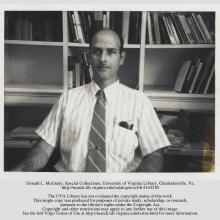
Donald McGrady
From September 1983 to May 1994, Professor Donald McGrady taught Spanish literatures and literary histories at UVa.
He authored some 14 monographs and edited works of early modern and 18th-19th century Peninsular literature, and he received numerous fellowships and awards during his distinguished career, including a Guggenheim Fellowship (1972).
A photo of Professor McGrady is preserved in the university's Special Collections library.
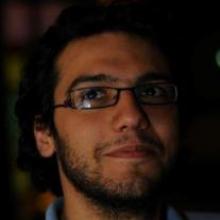
Nasser Meerkhan
Education
Dissertation
Between Granada's Fading Glory and Castile's Incipient Empire: Historiography and the Islamic Conquest in Medieval Iberia
The dissertation deals with the concepts of imagination, nostalgia and ephemerality in the shaping of Medieval Iberian Islamic historiography. I argue that contradictory prophecies regarding the destiny of Islam in Iberia reflect a nostalgic view towards the Umayyad Caliphate; one where not only its brief glory but also its inevitable fall are anticipated in Al-Andalus. I look at the works of three historians: two Muslims (Ibn Al-Qutiyya, 10 th c. and Ibn Al-Khatib, 14 th c.) and those of Alfonso the Wise, as well as one chapter in Cervantes’s Don Quixote Part II. The objective is to reach a better understanding of the role played by Al-Andalus in the pragmatics of history writing in Medieval and Early Modern Iberia. By resorting to Iberian authors from different historic and cultural backgrounds, I aim to emphasize the transcultural and trans-temporal significance of their contributions to this broader view of Medieval and Early Modern Iberian history.
Research Interests
- Medieval & Early Modern Iberia
- Historiography in Al-Ándalus
- Semitic maqamat
- Picaresque literature
- Medieval Islamic Philosophy
Teaching
- SPAN 3300 Texts and Interpretation (2016-17)
- Intermediate Spanish I & II (UVa 2013-2016, Villanova University 2011-2013)
- SPAN 4993 Language House - Casa Bolívar. (2013-14)
- Intensive summer courses at UVa and Valencia, Spain (Summer 2014, 2015)
- Introduction to Hispanic Cultural Studies in Cádiz, Spain (Summer 2012)
Publications
Translations (Spanish and English to Arabic, or viceversa)
Hajo, Gulnar. La aventura de Punto. Mixco, Guatemala: Amanuense, 2014. Print. ISBN: 9789929633186
Miró, Asha, and Anna Soler-Pont. Āthār Al-Ṣandal: Rastros De Sandalo: riwāyah. Bayrūt: al-Dār al-ʻArabīyah lil-ʻUlūm, 2011. Print. ISBN: 9786140101005.
Ayen, Xavi. Thawrat Nobel: Rebeldía De Nobel. UAE: Dar Al Thaqafa for Publishing & Distribution, 2011. Print. ISBN: 9789948446194.
Grisham, John. The Rainmaker. Aleppo, Syria: Ray Publishing & Science, 2010. Print.
Selected Presentations
“Failure of male-friendship in Celestina”, MIFLC: The 66th Annual Mountain Interstate Foreign Language Conference (October, 2016)
"A checker pattern woven of intellect: Misconceptions of the maqāmā genre in Iberian criticism", The 51st International Congress on Medieval Studies (May, 2016).
"A non-Arab's Journey to Colonial Spanish America: The Curious Case of Elias Al-Musili";, KFLC: The Languages, Literatures, and Cultures Conference. (April, 2016)
“For the Sake of Communication in Ḥayy Ibn Yaqzān: The Philosophus Autodidactus Revisited”, Dialogue and Difference in the Middle Ages, University of Bristol, UK (February, 2016)
"Dos marcos narrativos maestros y distintos: la maqāmā y la picaresca." Graduate Student Lecture Series, Department of Spanish, Italian & Portuguese, UVa (September, 2014).
“Genette, Arguedas y los zorros: una aproximación paratextual” in the conference “celebrating the centenary of José María Arguedas”, Villanova University (October 2011)
Grants & Awards
Buckner W. Clay award in the Humanities to research the influence of Islamic escatology in Dante’s Divine Commedy (2016-2017)
Admitted with subsidy to the summer school ”Reading Pleasure – Pleasure Reading. Medieval approaches to reading” in Istanbul, 23-28 May 2016.
Charles Gordon Reid, Jr Summer Travel Fellowship to take a course on El Greco in El Museo del Prado, organized by El Escorial (Summer 2014)
Summer Research Grant from Villanova University to work on the project: "The notion of cruelty in popular songs from Syria to Spain" (Summer 2012)
MAEC Scholar at Salamanca, Spanish Ministry of Foreign Affairs (allows foreign students to take summer courses at Spanish universities) (Summer 2008)
Youth Exchange and Study (YES) Scholar, US Department of State (allows Middle Eastern students to spend a school year in the US with a host family) (2005-2006)

Lauren Mehfoud
Education
Predoctoral Fellow, Jefferson Scholars Foundation, University of Virginia (2023-2024)
PhD, Spanish, University of Virginia (scheduled May 2024)
Dissertation: The Poetics of Prohibition: Drugs, Culture, and Racial Politics in Latin America studies the discursive relationship between drug prohibition and racial state formation in 20th-and 21st-century Mexico and Colombia. Each chapter zooms in on a key moment in the development of antidrug policy in these countries, ranging from opium prohibition and anti-Chinese campaigns in 1920s Mexico to the criminalization and displacement of Indigenous Wayuu communities during Colombia’s 1970s marijuana boom. Through the analysis of literature, film, television, visual art, and archival sources, I examine the rhetorical strategies employed to transform plants into “drugs” and racialized subjects into “traffickers” and “addicts,” as well as how activists, writers, and filmmakers have contested these discursive constructions. This critical analysis of the narrative foundations of the “war on drugs” makes an original contribution, illuminating how antidrug discourses have constructed national identities, produced racial difference, and facilitated environmental exploitation across Latin America.
MA, Spanish, University of Virginia (2019)
BA, Spanish, Virginia Tech, Summa Cum Laude (2016)
Research & Teaching Interests
20th- and 21st-Century Latin American Literary and Cultural Studies
Race and Ethnicity Studies
Environmental Humanities
Film Studies
Digital and Public Humanities
Peer-Reviewed Articles
“Unmasking the Narco: Irony in Juan Pablo Villalobos’ Fiesta en la madriguera.” Revista de literatura mexicana contemporánea, vol. 25, no.78, 2019, pp. 77-90.
Public Scholarship
“1940s Mexico Has a Lesson for How the U.S. Can Tackle Drug Addiction.” The Washington Post. 20 June 2023.
Fellowships, Grants, & Awards
Jefferson Predoctoral Fellowship (2023-2024)
Buckner W. Clay Research Grant (2022)
Del Greco Essay Prize (2022)
Charles Gordon Reid Fellowship (2022)
Arts, Humanities, and Social Sciences Summer Research Award (2020, 2021)
Nominee, Outstanding Graduate Teaching Award, University of Virginia (2019)
Professional Service
Editorial Assistant, Global South Studies: A Collective Publication with The Global South
Committee Member, SIP Graduate Diversity, Equity, and Inclusion Committee (2021-2023)
Teaching
Instructor of Record, University of Virginia (2017-2023)
SPAN 4040: Translation from Spanish to English
SPAN 2020: Advanced Intermediate Spanish
SPAN 2010: Intermediate Spanish
SPAN 1060: Accelerated Elementary Spanish
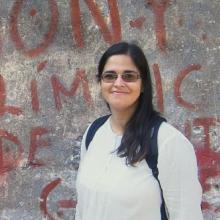
Elizabeth Mirabal
Education
Ph.D. Spanish, University of Virginia (in progress)
Bachelor of Arts, University of Havana, Cuba: Journalism
Research Interests
-
Diaspora, Displacement, Exile and Life-Writing in Latin American and the Caribbean
-
19th- and 20st- Century Caribbean, Latin American and Latinx Literatures
-
Nostalgia and Homelessness
-
Affective Theory
-
Cuban Studies
Selected publications:
Books
-
Juana Borrero, Poesía completa. (Selection and prologue.) Editorial Verbum, 2016.
-
Regreso de Ricardo Vigón. (Selection, prologue, and notes. Co-author with Carlos Velazco.) Editorial Oriente, 2015
-
La intimidad de la historia. (Selection.) Ediciones ICAIC, 2013.
-
Sobre los pasos del cronista. El quehacer intelectual de Guillermo Cabrera Infante en Cuba hasta 1965. (Co-author with Carlos Velazco.) Ediciones Unión, 2011.
Fiction and Poetry Books
-
Herbarium (Poetry). Ediciones Alacrán Azul, 2021.
-
La belleza de la inutilidad (Novel). Editorial Verbum, 2020.
-
La isla de las mujeres tristes (Novel). Editorial Verbum, 2014.
Academic Articles
-
“Conexiones imaginarias de La Habana esquiva (1968-2017).” Recial 14:23 (January-June 2023): 106-130.
-
“Miguel Hernández y Reinaldo Arenas o la historia de los poetas pastores que fueron presos.” Poéticas 15 (June 2022): 91-118.
-
“El simbólico siglo XIX en la literatura cubana posterior a 1959.” Cuban Studies 47 (March 2019): 57-68.
General public articles
-
“The Viscous Threads of a Permeable Web.” Beyond the Sugar Curtain (December 2016).
-
“Mapa dibujado por un espía. Guillermo Cabrera Infante.” Variopinto 27 (September 2014): 52-55.
-
“Algunas notas sobre Arístides Fernández.” Los pintores escriben. Ediciones Boloña, 2012, 109-123.
-
“VP vs. G. Caín.” República de las Letras 114 (October 2009): 160-169.
Book reviews
-
“Review of Adiós mi Habana.” About Anna Veltfort, Adiós mi Habana. Las memorias de una gringa y su tiempo en los años revolucionarios de la década de los 60 (Editorial Verbum, 2017). NACLA-Report on the Americas 50:1 (Spring, 2018): 101-102.
-
“Carpentier ante su diario.” About Alejo Carpentier, Diarios 1951-1957 (Editorial Letras Cubanas, 2013). Variopinto 20 (February 2014): 60-63.
Exhibition reviews
-
“Estrangement, Restlessness, and Rupture: Pablo Delano and the Rethinking of Puerto Rico” Intervenxions, The Latinx Project (New York: March, 2023)
Selected conference papers
-
“José Antonio Aponte, lector del Quijote”, Panel “Derecho, Tecnociencia y Afrolatinoamericanismo”, LASA/Africa 2023 Congress: África y América Latina: Diálogos y Conexiones, Accra, November 18, 2023.
-
“‘Soy una nao de China’: la espiritualizada ruta transpacífica de Catarina de San Juan”, Panel “Mexican and Latinx Cultural Production”, 13th Conference on East-West Cross-Cultural Relations: Voyages between the West and the East, Travellers, and New Realities, Università degli Studi di Verona, June 15, 2023.
-
“Nostalgia and Intimacy: Sentimental Longing and Epistolary Discourses in the Nineteenth-Century Spanish Caribbean”, Panel “Borderlands of Caribbean Islands”, 27th Carolina Conference for Romance Studies, University of North Carolina at Chapel Hill, March 25, 2023.
-
“Cuba-quo Vadis? Cuban Artist in Times of Change.” Academy Discussion. Akademie der Künste, Pariser Platz, Berlin, October 5, 2015.
-
“Carlos Victoria: el regreso que se repite.” Panel “Exclusiones, exilios y regresos en la literatura cubana y su diáspora.” XXXIII International Congress of the Latin American Association (LASA), San Juan, May 29, 2015.
-
“Vivir y escribir en la isla de las mujeres tristes.” Cycle “Voces de América.” Faculty of Philology, Universidad Complutense, Madrid, December 17, 2014.
Grants & Awards
-
Tibor Wlassics Dante Fellowship, 2024.
-
Arts, Humanities and Social Sciences (AHSS) Summer Research Fellowship, Graduate School of Arts and Sciences and Office of Graduate and Postdoctoral Affairs, University of Virginia, 2024.
-
Arts Fund, Student Council, University of Virginia, 2023.
-
Del Greco Annual Essay Prize for “Aventura de las hormigas de Esteban Borrero: una apasionada inmersión multiespecies,” Department of Spanish, Italian and Portuguese, University of Virginia, 2023.
-
Frederick W. Beinecke Fellowship, University of Yale, 2023.
-
Summer Research Fellowship, Department of Spanish, Italian, and Portuguese, University of Virginia, 2023.
-
Dean’s Doctoral Fellowship, University of Virginia, 2022-Present.
-
Graduate Global Research Grant, Center for Global Inquiry + Innovation, University of Virginia, 2022.
-
Graduate School of Arts and Sciences Research Grant, University of Virginia, 2022.
-
Verbum Spanish-American Novel Award, 2014.
-
Cuban Literary Critic’s Award, 2011.
-
“Enrique José Varona” Award for Artistic-Literary Essay by the Union of Writers and Artists of Cuba, 2009.
-
Golden Award for Academic Achievement, University of Havana, 2009.
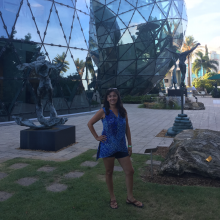
Paola Monteros-Freeman
Education
Ph.D., Spanish, University of Virginia (expected)
M.A., Hispanic Studies summa cum laude, Virginia Tech (August 2018)
B.A., Spanish summa cum laude, Mercy College, New York (May 2015)
Research Interests
- 20th and 21st Latin American literatures and cultures
- Latin American film
- Contemporary Latin American women writers
- Global South
Awards
Outstanding Master of Arts Student Award for Excellence in the Study of Foreign Language (2017–2018)
Member of the honor society Phi Kappa Phi (2017)
Member of the honor society Phi Sigma Iota (2015)
Presentations
Women’s and Gender Studies Conference Virginia Tech (April 2018)
“La Quintrala: chilean landowner, witch, serial killer and… woman. Gender and race influenced the history of the country”.
MIFLC 2017 University of North Carolina at Wilmington (October 2017)
“Lazarillo de los ciegos caminantes: la raza desde el punto de vista de un viajero colonial”.
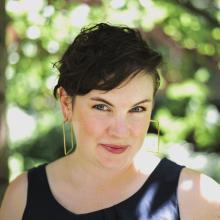
Kelly Moore
Kelly Moore is an Assistant Professor of Modern and Contemporary Spanish Literature and Culture. Kelly completed her PhD in the Department of Romance Studies at Cornell University and her undergraduate degree at the University of Wyoming. Kelly is currently completing her first book project, Family Sovereignty, which engages with secularism and social reproduction across a range of modern and contemporary Iberian literature and film. You can read Kelly’s latest work here.
Research and Teaching Interests:
Modern and Contemporary Iberian Literature & Film
Social Reproduction & Feminist/Queer Thought
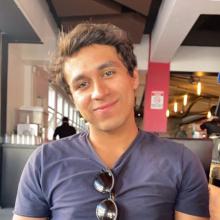
Josue Morales
Education
B.A. in Peace and Global Studies, Earlham College (2021)
P.h.D. in Spanish, University of Virginia (in progress)
Research Interests
Colonial Latin America and the Caribbean
Decolonial and Postcolonial Studies
20th Century Latin American Literature
Continental Philosophy and Film Theory
Teaching
Spanish Language and Literature. Lycee Taiba ICS, Mboro, Senegal. 2015-2016.
Grants and Fellowships
Li Po Chun United World College Scholarship Award 2013-2015
Global Citizen Year Fellowship 2015-2016
Earlham College Scholarship Award 2016-2020
Dean’s Doctoral Fellowship, University of Virginia (2021 – Present)

Kate Neff
Please email me for questions about SPAN 1010-2020 courses.
Education
M.A., Spanish, University of Virginia (2008)
B.A., English and Spanish, Grove City College (2006), summa cum laude
Research Interests
- Second Language Acquisition
- Communicative and Proficiency-Based Pedagogy
- Student Motivation
- Instructional Technology (E-Portfolios)
- Accessibility in the Language Classroom
Teaching
University of Virginia, 2014-2017
Administrative:
- Coordinator for SPAN 1010-1020 (2015-2020)
- Co-Coordinator for SPAN 2010 (2020-present)
Instructor of Record:
- SPAN 1010, Elementary Spanish
- SPAN 1020, Elementary Spanish
- SPAN 160, Elementary Spanish Online
- SPAN 2010, Intermediate Spanish
Longwood University, 2008-2010
- Elementary Spanish I
- Intensive Elementary Spanish I-II
- Intermediate Spanish I
- Intermediate Spanish II
University of Virginia, 2006-2008
- SPAN 106, Accelerated Elementary Spanish
- SPAN 2010, Intermediate Spanish
- SPAN 2020, Advanced Intermediate Spanish
Other Teaching Experience
- Middle School Spanish Teacher and Exchange Program Coordinator, Green Acres School, Rockville, MD (2010-2014)
Publications
Modules on Group Work, Inclusive Assessment, and Error Correction in Longwood University’s Project LINC (Learning in Inclusive Classrooms)
Presentations
“Collab Media in Elementary Spanish Online (SPAN 160).” With Matthew Street. UVA Collab Instructional Media Faculty Showcase, University of Virginia, 2021.
“Low-Stakes Activities in the E-Portfolio.” With Marina Escámez Ballesta and Julianna Beveridge. Institute of World Languages Roundtable Series, University of Virginia, 2019.
“Student Motivation and Meaningful Learning in the E-Portfolio.” With María Jorquera-Hervás and Julianna White. AAEEBL Southeast Regional Conference, University of Virginia, 2017.
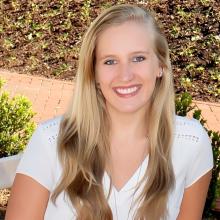
Cassandra O'Mahoney
Education
Ph.D., Spanish, University of Virginia (Projected 2021)
M.A., Spanish, Saint Louis University, Madrid (2016)
B.A., Secondary Education and Spanish, Marquette University (2014), cum laude
Research Interests
- 20th and 21st Century Spanish Peninsular Literature
- Post-Dictatorship Spanish Literature
- Contemporary Female Writers
Teaching
Intermediate-Advanced Spanish 2020, Summer 2017, Fall 2017, Spring 2018
Intermediate Spanish 2010, Spring 2017
Intermediate Spanish 2010, Fall 2016
Grants & Awards
Participant in The Summer School in Global Studies and Critical Theory, Bologna, Italy, Summer 2017
Member of Alpha Sigma Nu, the National Jesuit Honor Society, since 2016
Member of Sigma Delta Pi, the National Collegiate Spanish Honor Society, since 2012
Presentations
“Las mujeres de la capital: los personajes femeninos de Capital de la gloria de Juan Eduardo Zúñiga”, Kentucky Foreign Language Conference, April 2017
“Using Short Stories as Input in the Second Language Classroom: A Study on the Effects on Student Retention of Grammar and Cultural Knowledge”, Action Research Poster, November 2016'
“La elipsis, la fragmentación y lo enigmático en Eloy Tizón: la importancia de lo no contado y lo no entendido”, VI Simposio Graduado, Saint Louis University - Madrid, March 2016
Table Moderator for Homenaje a Juan Eduardo Zúñiga: La literatura como vida, Saint Louis University - Madrid, October 2015
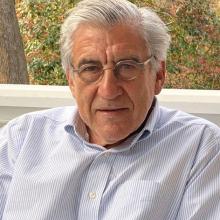
Fernando Operé
Research and Creative Summary
Fernando Operé is Professor of Spanish, and Director of the Latin American Studies Program. He is Licenciado in Filología y Letras from the University of Barcelona, and holds an MA and PhD from the University of Virginia. He is an expert on Colonial and 19th Century Latin American Literature, and Spanish and Latin American Poetry. Dr. Operé has published several books on cultural history, as well as numerous articles on romanticism, modernism, captivity literature, and the historical novel. Professor Operé is Director of the Hispanic Studies Program, the study abroad program that the University of Virginia has in Valencia, Spain. He is also Director of the Institute Literatura argentina en Argentina: Crítica y Creación, that is held every year in Chaco, Argentina, in conjunction with the Centro de Altos Estudios Literarios y Sociales, Chaco. Professor Operé has published ten books of poetry, and given readings and poetry workshops in the US, Spain, Mexico, and Argentina. He has directed more than thirty theatrical productions, an activity that he carries out every year. For more detailed information, please visit his web page.
Education
Ph.D., University of Virginia
M.A., University of Virginia
Publications
Books (critical)
Historia de un scenario. 40 años de teatro en español en la Universdad de Virginia. With Fernando Valverde (eds). Georgia: Valparaíso USA., 2020.
Relatos de cautivos en las Américas de Canadá a la Patagonia. Siglos XVI al XX. Buenos Aires: Corregidor, 2016.
Indian Captivity in Spanish America: Frontier Narratives (University of Virginia Press, 2007)
España y los españoles de hoy. Historia, Sociedad y Cultura (Prentice Hall , 2007)
Historias de la frontera. El cautiverio en la América hispánica (Fondo de Cultura Económica, 2001)
Cautivos (EIMFC, 1997)
Civilización y barbarie en la literatura argentina del siglo XIX. El Tirano Rosas (Ed Conorg, 1987)
Books (creative)
La imprudencia de vivir. Granada: Valparaíso, 2018.
Day Outwits the Clocks. Clayton, GA: Valparaíso, 2017.
Pureza demolida. Barcelona: Calambur, 2017.
Liturgia del atardecer. Puerto Rico: Isla Negra, 2016.
Ciudades de tiza. Paisajes de papel. Bilbao: Muelle de Uribarre, 2014
Refranero de ausencias. Sevilla: Renacimiento, 2014.
Around the World in 80 Poems/La vuelta al mundo en 80 poemas. Madrid: Biblioteca Nueva, 2013.
Cántico Segundo. Con Mempo Giardinelli. Resistencia, Argentina: FMG, 2009
Anotado al margen. Cuaderno de ruta. Madrid: Nosoyotros editores, 2007
Memorial del olvido. Resistencia: Librería de la Paz, 2005
Poesía a dos voces. con Mempo Giardinelli. Resistencia: FMG. 2004
Concierto de Música y Poesía. CD con Mempo Giardinelli. Resistencia, 2004
Alfabeto de ausencias. Madrid: Nosyotros Editores, 2002
Salmos de la materia. Madrid: Editorial Verbum, 2000
Amor a los cuerpos. Puerto Rico: Editorial Isla Negra, 1997
Acróbata de ternuras. Madrid: Ediciones Endymión, 1994
¿Quién eres tú Betty Blue? Valencia: Fundación Instituto Shakespeare, 1991
Despedidas. Sagunto, Valencia: Ardeas, 1987
Días de lluvia y otros soles. Madison, Wi: Martha Gómez, 1987
Anthologies
Humanismo Solidario. Poesía y compromiso en la sociedad contemporánea. Remedios Sánchez García ed. Madrid: Visor, 2014.
Poetas del Siglo XXI. Antología de Poesía. Fernando Sabido Sánchez ed.
Arquitectura de la palabra (Antología poética). María Teresa Espasa. ed. Valencia: Intitució Alfons El Magnanim, 2012.
Susurros, para disipar las sombras (Antología poética). Juan Goergen ed. Chicago: Erato, 2012.
Pegasos de dos siglos: Poesía en Kentucky 1977-2007. College Station, TX: Hispanic Poetry Review, 2007
Cauteloso engaño. Antología. Rei Berroa ed. Santo Domingo, R.D.: Colección Libros de la Luna, 2007.
Escritores españoles en los Estados Unidos. Antología. Gerardo Piña ed. New York: Academia Norteamericana de la Lengua Española, 2007.
Poetas sin fronteras. Ramiro Lagos ed. Madrid: Editorial Verbum, 2000.
Academic Articles
“Teatro testimonial argentino en la obra de Rubén Mosquera: Las putas de San Julián”. Exégesis 2 (2019): 84-90.
“La literatura comprometida y el compromiso en Mempo Giardinelli”. Miríada Hispánica 15 (2017): 55-66.
“Declamar, recitar, leer poesía”. La lectura como práctica social de emergencia. Fomento del libro y la lectura 16 (2016): 141-47.
“David T. Gies. Descubrir y disfrutar la cultura hispánica en todas sus maravillosas dimensiones”. Lean®Anle. Revista de la Academia Norteamericana de la Lengua Española 10 (2016): 389-401.
“El viaje a la frontera de Lucio V. Mansilla, un gaucho dandy”. Aportaciones Eruditas y Literarias en Homenaje a Gregorio C. Martín. Alshaln, Oh: BookMasters, 2016, pp. 171-180.
“Achicando fronteras: la obra de Edward Stanton”. This Spanish Thing. Essays in Honor of Edward F. Stanton. Michael J. McGrath, ed. Neward, Del.: Juan de la Cuesta, 2016, pp. 43-48.
“Los imaginarios de la Nación Española. Historia y mitos nacionales”. This Spanish Thing. Essays in Honor of Edward F. Stanton. Michael J. McGrath, ed. Neward, Del.: Juan de la Cuesta, 2016, 209-220.
“Exilio o peregrinaje: la intelectualidad española en USA”. Cuadernos de ALDEEU 30 (2016): 121-131
“142 años después de Julio Verne, La vuelta al mundo en 80 poemas.” La Nueva literatura hispánica 19 (2015): 99-112.
“El viaje a la guerra: Estanislao Zeballos y La conquista de quince mil leguas”. Miríada Hispánica 6 (2014): pp. 125-133.
“Los viajeros que no querían viajar”. Puente Atlántico. Siglo XXI (10/27/2014).
“Joaquín Sabina, entre la crónica y las más recientes tradiciones poéticas”. Anthropos, Cuadernos de Cultura Crítica y Conocimiento 238 (2013): pp. 225-239.
“Autobiografía o testimonio. El cautiverio de Helena Valero en el Orinoco”. Miríada Hispánica 5 (2012): 159-174.
“Del norte al sur, del centro a la periferia: la cultura política de la gastronomía española”. Comida y bebida en la lengua española, cultura y literaturas hispánicas. Pejović, Sekulić & Karanović (eds): FILUM, Kragujevac, 2012, pp. 157-172.
“Argentina 1810-2010, entre Independencia y post-colonialismo”. América latina, Globalidad e Integración III vol. Antonio Colomer ed. Madrid: Ediciones del Orto, 2012, pp. 1315-1322.
“Un académico en Nueva York: Las ventanas de Antonio Múñoz Molina”. El Español y su literatura en los Estados Unidos. Enrique Ruiz Fornells ed. Burgos: Instituto Castellano y Leonés de la Lengua, 2011.
“Miguel Hernández en las Américas.” Miguel Hernández desde América, edited by Elvia Ardalani. University of Texas Pan American Press, 2011. pp. 161-176
“José Luis Alonso de Santos: dramaturgo de la Transición española.” Miríada Hispánica 1 (2010): 69-74.
“Una España para ser narrada: los cronistas de la transición.” Hispanic Journal 31, 2 (2010): 39-52.
“Tango: Entre pureza y revolución.” Essays in Honor of Juan Cano Ballesta, edited by Candelas Gala and Anne E. Hardcastle, Newark, Juan de la Cuesta-Hispanic Monographs (2009).
“La frontera como argumento y articulación teórica en la cultura y la literatura argentina.” Brocar. Cuadernos de investigación histórica. 30 (2006): 173-92.
“Entre el tango y el bolero. la poesía que se baila.” En Erie. A orillas del lago. Juan Fernández Jiménez, ed. Erie, Pa: ALDEEU (2008).
“La María de Isaacs y la búsqueda de espacios idílicos.” En Cajón de los textos.Ensayos sobre literatura hispanomericana. Carmenza Kline, ed. Bogotá: Fundación General de la Universidad de Salamanca (2007).
“‘Lo quiero más al indio que a ti’. Relecturas de civilización y barbarie en los hermanos Mansilla.” En Cajón de los textos. Ensayos sobre literatura hispanomericana. Carmenza Kline, ed. Bogotá: Fundación General de la Universidad de Salamanca (2007).
“El teatro como literatura.” Fomento del libro y la lectura./ 8 Propuestas y reflexiones. Resistencia Chaco (2007).
“Diálogo entre dos mundos: la España de Pablo Neruda.” Cuadernos de literatura, X, 20 (2006): 53-66.
“De Cervantes a Ercilla, entre tradición y rupturas.” Exégesis, 18, 53 (2005): 13-19.
“De España en el corazón a Canto general: La gestación del gran mural de Neruda.” Sophia Austral, 9 (2004): 42-50.
“’Amor de ciudad grande’ y el transnacionalismo en José Martí.” Hispanic Poetry Review, 5,1 (2003)
“La cautiva de Echeverría, el trágico señuelo de la frontera.” Bulletin of Spanish Studies, 80- 5 (2003): 545-54.
“Fronteras y cautivos en Hispanoamérica.” Cuadrivium, 4 and 5 (2003): 56-62.
“Voces ignoradas de la frontera patagónica.” Explicación de textos literarios, 28- 1&2 (1999-2000): 31-39.
“Señas de identidad en la poesía de César Simón.” Quaderns de Filologia. Estudis Literaris, 5 (2000): 65-72.
“La importancia de la lectura de los textos coloniales.” Foro Internacional por el fomento del libro y la lectura. Resistencia: Universidad Nacional del Nordeste (1999): 87-92.
“Cumandá: la novela ecuatoriana entre la cruz y la espada.” Crítica Hispánica, 1&2, XX (1998): 77-87.
“Españoles cautivos en Norteamérica.” De la catedral al rascacielos. Eds. Corbalán, Piña, Toscano. New York: The Peconic Company, 1998, pp. 235-44.
“Cautivos de los indios, cautivos de la literatura en la América Hispánica: el caso del Río de la Plata.” Hispamérica, 76/77, XXVI (1997): 49-76.
“El discurso natural y moral en Hispanoamérica: De la colonia a la independencia.” Letras de Deusto, 70, 26 (1996): 145-167.
“Del teatro azteca al drama cristiano: un caso de mestizaje cultural.” Estudios de Lengua y Cultura Amerindias, ed. Julio Calvo Pérez. Valencia: Universidad de Valencia Press, 1994, pp. 309-323.
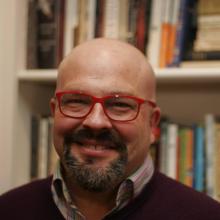
Ricardo Padrón
Ricardo Padrón is a Professor of Spanish who studies the literature and culture of the early modern Hispanic world, particularly questions of empire, space, and cartography. His recently published monograph, The Indies of the Setting Sun: How Early Modern Spain Mapped the Far East as the Transpacific West (Chicago 2020) examines the place of Pacific and Asia in the Spanish concept of “the Indies.” His research for this book has taken him to China, Japan, and the Philippines, and has been sponsored by U.Va.’s Center for Global Inquiry and Innovation, Arts & Sciences at U.Va., and the National Endowment for the Humanities. He has also published on early modern poetry and historiography, and on the mapping of imaginary worlds in modern times. Prof. Padrón is an active member of the Renaissance Society of America, and is currently serving as a member of its Board of Directors. He is also serving as Director of Graduate Studies in Spanish. During the Spring of 2022, Prof. Padrón spent part of his research leave as a visiting professor at the École des Hautes Études en Sciences Sociales in Paris.
Education
Ph.D., Harvard
M.A., Harvard
A.M., Chicago
B.A., University of Virginia
Publications
Books
The Indies of the Setting Sun: How Early Modern Spain Mapped the Far East as the Transpacific West (University of Chicago Press, 2020).
The Spanish Pacific, 1521-1815: A Reader of Primary Sources in English Translation, co-edited with Christinia Lee (Amsterdam University Press, 2020)
The Spacious Word: Cartography, Literature, and Empire in Early Modern Spain (University of Chicago Press, 2004)
Recent Articles
“Confusions of Identity: The Spanish Encounter with Japanese Religion and the Glass Ceiling of Eurocentrism,” Revista de estudios hispánicas. (Forthcoming). 28 pages; 8131 words.
“América, las Indias, y el Pacífico en el siglo XVI.” Miradas conectadas y renovadas. A propósito del X Congreso Internacional de Etnohistoria. Quito: Editorial FLACSO. (Forthcoming) 32 pages; 11,360 words.
“The Philippines and the Body Politic: The Transpacific Cartography of Vicente de Memije” in Transpacific Engagements: Exchange, Translation, and Visual Culture in Entangled Empires, 1565–1898, Edited by Florina H. Capistrano-Baker, et. al. Los Angeles: Getty Research Institute, 2020. 49-59. 4554 words.
“America y el espacio transmagellanico, siglo XVI,” Magallania (Chile): Volumen especial El viaje de Magallanes. 2020. 79-102. 11,615 words.
“Mundus Novus - China - Terra Australis: Successive New World Fantasies” Shores of Vespucci A historical Research of Amerigo Vespucci's Life and Contexts in Collaboration with Francisco Contente Domingues, edited by Angelo Cattaneo. Frankfurt: Peter Lang, 2018. 18 pages; 5837 words.
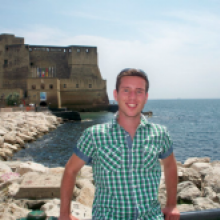
Joseph Paola
Joseph Paola is a Ph.D. student who received a Bachelor of Arts in Spanish and Global Studies from Providence College in Rhode Island in 2011. After graduating, he lived in Spain while completing his Master’s in Spanish at Middlebury College’s campus in Madrid. He has taught Spanish at both the high school and university levels.
His primary research interests include (among others) Renaissance and Baroque Peninsular literature, particularly poetry. More specifically, he is interested in the influence of Italian authors and literary styles on Early Modern Spanish literature, and the cultural exchange between the two nations.
In his spare time he enjoys running, reading, drinking coffee, and occasionally chain-watching Netflix.

Sara Park
Research Summary
Sara Park specializes in modern Latin American literature, with a focus on the Southern Cone region. In her dissertation—“(Re)configuración de memoria: Autoficción de las hijas de desaparecidos en Argentina”—, she analyzes a wide corpus of texts and movies to investigate the matter of memory and identity in the narrative of the daughters of those who disappeared during the last military dictatorship in Argentina (1976-1983). Her current research projects investigate the works of Chilean women writers such as Andrea Jeftanovic, Nona Fernández, and Lina Meruane. She is also interested in other contemporary women writers such as Samanta Schweblin (Argentina) and Fernanda Trías (Uruguay). With a WGS certificate, she holds a Ph.D. degree in Spanish from the University of Virginia.
Education
Ph.D., University of Virginia, 2022
M.A., Seoul National University, 2016
B.A., Seoul National University, 2013
Publications
“Soledad y solidaridad en la narrativa breve de José Revueltas.” Sincronía, vol. 69, 2016, pp. 388-405.
Conference Presentations
“La liberación del lenguaje falocéntrico para superar el orden patriarcal en Los vigilantes de Diamela Eltit.” Mountain Interstate Foreign Language Conference, University of Tennessee, Knoxville, Tennessee, October 5, 2018.
“La superación del patriarcado como una clave para escapar de la soledad: la lucha de los personajes femeninos en Cien años de soledad.” Asociación de Licenciados y Doctores Españoles en Estados Unidos, University of Virginia, Charlottesville, Virginia, June 12, 2018.
“La transformación de Carlos Wieder en Estrella distante de Roberto Bolaño: de un cuerpo sin órganos lleno a un cuerpo sin órganos vacío.” Mountain Interstate Foreign Language Conference, UNC Wilmington, Wilmington, North Carolina, October 5, 2017.
“Soledad frente a solidaridad social, en Dios en la tierra de José Revueltas.” Federación Internacional de Estudios sobre América Latina y el Caribe, Bexco, Busan, Korea, August 26, 2015.
“La reescritura de La divina comedia: “El Aleph” de Jorge Luis Borges.” Congreso de Invierno de la Asociación Coreana de Hispanistas, Seoul National University, Seoul, Korea, December 20, 2014.
“La voz social de Nicanor Parra en la ecopoesía.” Literatos latinoamericanos en centenario, University of Ottawa, Ottawa, Canada, October 4, 2014.
“Cómo La Madelón se transformó en una mujer: Una mala noche la tiene cualquiera de Eduardo Mendicutti.” Congreso de Verano de la Asociación Coreana de Hispanistas, Dankook University, Cheonan, Korea, June 14, 2014.
Teaching
University of Virginia, Assistant Professor of Spanish, General Faculty, 2022-present
Advanced Intermediate Spanish, SPAN 2020 (Fall 2022)
University of Virginia, Graduate Teaching Assistant, 2016-2022
Grammar and Composition I, SPAN 3010 (Fall 2019-Spring 2020)
Advanced Intermediate Spanish, SPAN 2020 (Summer 2018-Summer 2019, Summer 2020)
Advanced Elementary Spanish, SPAN 1060 (Fall 2017-Spring 2018)
Intermediate Spanish, SPAN 2010 (Fall 2016-Spring 2017, Fall 2021-Spring 2022)
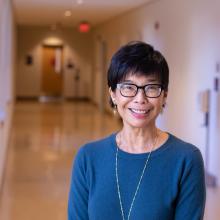
Deborah Parker
Research Summary
Deborah Parker is Professor of Italian at the University of Virginia. Her research expertise and teaching focus on Italian and Mediterranean visual and print cultures in the medieval and early modern eras. She is the author of numerous monographs, articles, and collaborative projects in print and digital platforms. Her work has been supported by fellowships from the National Endowment for the Humanities, Gladys Krieble Delmas Foundation, Villa I Tatti—the Harvard Center for Italian Studies, Folger Shakespeare Library—and numerous others.
Education
Ph.D., Harvard
M.A., University of British Columbia
B.A., University of Toronto
Publications
Books
Sucking Up: A Brief Consideration of Sycophancy. .
Inferno Revealed: From Dante to Dan Brown. Co-authored Mark Parker (Palgrave Macmillan , 2013).
The DVD and the Study of Film: The Attainable Text. Co-authored with Mark Parker (Palgrave McMillan, 2011).
Michelangelo and the Art of Letter Writing. (Cambridge University Press, 2010).
Bronzino: Renaissance Painter as Poet (Cambridge University Press, 2000).
Commentary and Ideology: Dante in the Renaissance (Duke University Press, 1993).
Film & Digital Work
Bronzino’s Erotic Imagination: The Lesson of ‘Del Pennello, Metropolitan Museum of Art, March 2011
A Hymn to Intellectual Beauty: Creative Minds and Fashion
Selected Articles
“Race and Foreign Languages,” Insdie Higher Ed, 21 June 2018.
"JFK's Dante," https://onlinelibrary.wiley.com/doi/10.1111/psq.12416
"Bronzino’s Dante", Dante Studies 135 (2017): 156-78.
The Function of Michelangelo in Vasari’s Lives, https://www.journals.uchicago.edu/doi/abs/10.1086/697048?journalCode=its
"Illuminating Botticelli's Chart of Hell," Modern Language Notes: Italian Issue 128 (2013):83-102.
"Better than Giotto?" Source: Notes in the History of Art 32 (2013):1-4.
“Vasari’s Portrait of Six Tuscan Poets: A Visible Literary History,” Modern Language Notes 127 (2012):204-215.
“Bronzino’s Erotic Imagination: The Lesson of ‘Del pennello,’” forthcoming in Renaissance Studies in Honor of Joseph Connors, to be published with Olschki.
“Guidelines for the Evaluation of Digital Humanities Projects,” ADFL Bulletin 41 (2009):41-75.
“The Role of Letters in Biographies of Michelangelo,” Renaissance Quarterly 58 (2005):91-126.
“Bronzino and the Diligence of Art, ” Artibus et Historiae 49 (2004):1-14.
“New Perspectives on Japanese Prints: “The Moon Has No Home.” Japanese Color Woodblock Prints from the Collection of the University of Virginia Art Museum,” Virginia Quarterly Review 80 (2004):195-206.
“Directors and DVD Commentary: The Specifics of Intention,” co-authored with Mark Parker Journal of Aesthetics and Art Criticism 62 (2004):13-22. Reprinted in The Philosophy of Film: Introductory Text and Readings (Blackwells: Oxford, 2005).
“Poetry of Patronage: Bronzino and the Medici,” Renaissance Studies 17 (2003):230-245.
“Italian Renaissance Art” Review article of Grove Encyclopedia of Italian Renaissance & Mannerist Art in Virginia Quarterly Review 78 (2002):175-77.
“Dante giocoso: Bronzino’s Burlesque Transformations of the Commedia,” Quaderni d’Italianistica 22 (2001):77-101.
“Edizioni e interpretazioni della Commedia nel Rinascimento,” in Pour Dante.
Dante et l’Apocalypse. Lectures Humanistes de Dante, ed. Bruno Pinchard (Paris, Honoré Champion, 2001), 295-303.
“The World of Dante: A Hypermedia Archive for the Study of the Inferno,” Literary and Linguistic Computing 16 (2001):287-297.
“Toward a Reading of Bronzino’s Poetry,” Renaissance Quarterly 50 (1997):1011-1044.
“Interpreting the Commentary Tradition to Dante’s Comedy” in Dante, Ed. Amilcare Iannucci (Toronto: University of Toronto Press, 1997).
“Women in the Book Trade in Italy, 1475-1620,” Renaissance Quarterly 49 (1996):509-541.
Selected Grants & Awards
Sorensen Research Fellowship, John F. Kennedy Library (2015)
NEH Seminar for high school teachers on Dante’s Inferno: Influence, Adaptation, Appropriation (2014)
Visiting Professor, Villa I Tatti: Harvard Center for Italian Renaissance Studies (2009)
NEH Daniels’ Family Distinguished Teaching Fellowship (2008-11)
Gladys Krieble Delmas Foundation (1993; 2006)
NEH Digital Humanities grant (2008-11)
University of Virginia Arts and Sciences Research Fellowship (2004, 2005, 2007, 2008)
Sesquicentennial Research Fellowship (1990, 1997, 2003)
Institute for Advanced Technology in the Humanities, University of Virginia (1996)
University of Rome/Univ. of Virginia Fellowship (1987, 1992)
Villa I Tatti Fellowship (1992)
Folger Shakespeare Library (1990)
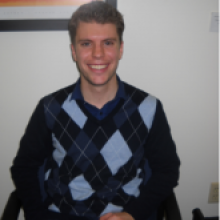
Anthony Pasero-O'Malley
Anthony Pasero-O’Malley is a first year Ph.D. student. He graduated from the Saint Louis University-Madrid campus with a B.A. in Spanish / International Relations followed by Masters in Spanish Literature & Linguistics from Marquette University. Research interests include the Spanish Civil War, Spanish Romanticism and 19 & 20th Century Peninsular Literature and Film.
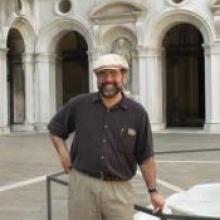
Gustavo Pellón
Research Summary
Professor Pellón’s major fields of teaching and research are the contemporary novel in Latin America, literary theory, and translation. He has published a book on the Cuban poet and novelist Lezama entitled: José Lezama Lima’s Joyful Vision, and many articles on leading Latin American writers including Gabriel García Márquez, Manuel Puig, Severo Sarduy, José Martí, and Julio Cortázar. Professor Pellón has contributed chapters to The Cambridge History of Latin American Literature, A History of Literature in the Caribbean, the Encyclopedia of Slavery and to the Encyclopedia of Cuba. Monte Ávila Editores in Caracas published the translation of his book on Lezama, La visión jubilosa de José Lezama Lima.
Pellón is the translator of short stories by Horacio Quiroga, Juan Bosch, Augusto Roa Bastos, and José Alcántara Almánzar among others. He also has translated Mariano Azuela’s Los de abajo published as The Underdogs: Pictures and Scenes from the Present Revolution ( Hackett Publishing Company, September 2006); The U.S.-Mexican War: A Binational Reader (Hackett Publishing Company, 2010); Mempo Giardinelli's novel An Impossible Balance, (Juan de la Cuesta, 2010). Most recently he has completed The Shadow of the Strongman, the first English translation of Martín Luis Guzmán’s novel La sombra del Caudillo (1929). He is currently working on the translation of José Martí’s novel Lucía Jerez.
Education
Ph.D., Comparative Literature, State University of New York at Binghamton (1981)
B.A., History and Comparative Literature, Brown University (1975)
Publications
Books
La visión jubilosa de José Lezama Lima: Un estudio sobre Paradiso y otras obras en prosa. Monte Ávila Editores Latinoamericana, 2005.
José Lezama Lima's Joyful Vision: A Study of Paradiso and Other Prose Works. U of Texas P, 1989.
Upstarts, Wanderers or Swindlers: Anatomy of the Picaro, A Critical Anthology. Edited and with an Introduction by Gustavo Pellón and Julio Rodríguez-Luis. Amsterdam: Rodopi, 1986.
Translations
Martín Luis Guzmán. The Shadow of the Strongman (La sombra del Caudillo), Hackett Publishing Company, forthcoming in September 2017. https://hackettpublishing.com/latin-american-studies/the-shadow-of-the-strongman
Mempo Giardinelli, An Impossible Balance [Imposible equilibrio]. Juan de la Cuesta, Hispanic Monographs. (January 2010).
The US-Mexican War: A Binational Reader. Christopher Conway, Editor. Hackett Publishing Company. (March 2010).
Fernando Operé. Indian Captivity in Spanish America. [Historias de la frontera: el cautiverio en la América hispánica]. University of Virginia Press (January 2008).
Mariano Azuela. The Underdogs : Pictures and Scenes from the Present Revolution with Related Texts [Los de abajo]. Hackett Publishing Company (September 2006). First printing of 6,000 copies sold out. Second printing of 3,000, April 2013. Plus ebook versions.
Antonio Skármeta. "The Infinite Brunette." Virginia Quarterly Review. (Winter 2005): 305-309.
José Alcántara Almánzar.“With Dad at Madame Sophie’s” (short story) Callaloo, 23,3. (Summer 2000): 936-944.
Mempo Giardinelli. The Dance of the Hippos. (Excerpt of translation of Imposible equilibrio) Bomb Magazine. December 1999 (Special issue on Latin American Literature).
Luis Sepúlveda, El mundo del fin del mundo. Translation commissioned by Paramount Pictures.(Unpublished).
Víctor Farías, foreword to the Spanish edition of Heidegger and Nazism. In The Heidegger Case: On Philosophy and Politics. Eds. Tom Rockmore and Joseph Margolis. Philadelphia: Temple UP, 1992.
In The Spanish American Short Story: A Critical Anthology. Ed. Seymour Menton. Berkeley: U of California P, 1980.
Humberto Arenal, "Mr. Charles."
Juan Bosch, "The Woman."
Ramón Ferreira, "A Date at Nine."
Horacio Quiroga, "The Dead Man."
José Revueltas, "God on Earth."
Augusto Roa Bastos, "The Prisoner."
Selected Grants & Awards (since 2010)
2016 Invited by Associate Dean for the Arts and Humanities, Francesca Fiorani and Robert Vaughn, President of the Virginia Foundation for the Humanities to teach the South Atlantic Humanities Seminar for Doctoral Candidates.
June 2014. Lacey and John Colligan create a fund to support my research in memory of their daughter Austin Colligan, who was my student and advisee for the Spanish Distinguished Major.
February 2014. The Development Office informed me that an alumna made a donation to the college in my honor.
2011 (Fall) Sesquicentennial Associate, University of Virginia.
2011 (Spring) All-University Teaching Award.
For a full list of Professor Pellón's publications and awards for research and teaching, please Consult his C.V.

Winnie E. Pérez Martínez
Education
PhD in Spanish, University of Virginia (in progress)
MA in Spanish, University of Virginia
BA in Comparative Literature, University of Puerto Rico—Río Piedras
Research Interests
- 20th–21st-century anglophone, francophone and hispanophone Caribbean
- Caribbean speculative and science fiction
- Digital humanities
- Digital cultures in the Caribbean and the U.S.
- Science and technology studies
- Infrastructure studies
Selected Peer-reviewed Publications
“Coasts in Crisis: Caribbean Arts and Cultures After the Hurricanes,” archipelagos journal. Co-written with Charlotte Rogers and Elise Foote. June 2023.
Book review. "Invisibility by Design: Women and Labor in Japan’s Digital Economy." Journal of Asia Pacific Pop Culture, vol. 7, no. 1, 2022, pp. 155-158.
“What the Doppelgänger Says About Female Characters in Murakami’s Fiction: Close Reading The Strange Library”. The Mellon Mays Undergraduate Fellowship Journal 2018, pp. 99-101.
Selected Presentations
Invited. “The Future of DH@UVA.” Round-table discussion. 30 Years of Digital Humanities at UVA. University of Virginia. Nov 12, 2022.
"Roads that Lead Nowhere: A Historiography of Urban Development in Puerto Rico." Latin American Studies Association Annual Conference (LASA). May 4-9, 2022.
"The Lived Experience of Blackness in Scientific Inquiry of the 19th Century." Mobility/Mutability Graduate Student Conference, organized by Boston University Romance Studies. April 17th, 2021.
“De manos que se levantan y voluntades voluntariosas: Wiso y Mishima.” Latin American Studies Annual Conference (LASA). May 23-26, 2018.
“Murakami’s Female Mediums: Cross-gender Doubling in The Strange Library and Colorless Tsukuru Tazaki and His Years of Pilgrimage”. 40 Years with Murakami Conference, organized by Newcastle University. March 6-9, 2018.
Grants and Fellowships
- Praxis Fellowship. Scholar's Lab. University of Virginia (2022-2023)
- Professional Development Award. School of Arts and Sciences, University of Virginia (2021)
- Dean's Doctoral Diversity Fellowship (2020-2025)
- Interdisciplinary Doctoral Fellowship in Caribbean Literatures, Arts, and Cultures (2020-2025)
- Dr. Piri Fernández de Lewis Award for our most distinguished Comparative Literature undergraduate student and best Comparative Literature undergraduate thesis in the class of 2018
- Mellon-Mays Undergraduate Fellowship. Spring 2016-Present.
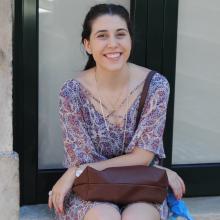
Ana Píriz Moguel
Education
Ph.D., Spanish, University of Virginia (expected 2023)
M.A., Spanish as a Second Language, Universidad de Extremadura (2017)
B.A., Spanish Philology, Universidad de Extremadura (2016)
Research Interests
- European Renaissance
- Romanticism
- Spanish evolution
- History of the Spanish Language
- Modern Latin American literature and culture
- Pedagogy
Teaching
Intermediate Spanish (SPAN 2010), Fall 2018
Presentations
"Conoce la Universidad de Extremadura." Go Global Event. East Central University, Oklahoma.
"La enseñanza en ELE." Oklahoma Foreign Language Teachers Association. East Central University, Oklahoma.
Grants & Awards
Erasmus Programme, Universitá degli Studi di Milano, Italy, 2014
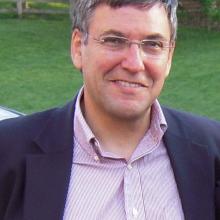
Randolph Pope
Research Summary
Randolph Pope is the Commonwealth Professor of Spanish and Comparative Literature at the University of Virginia, where he has served as Chair of Spanish, Italian and Portuguese (2004–2007) and Director of Comparative Literature (2008–2011). He has also been the Director of Graduate Studies in Spanish (2001–2004 and 2013–2016). Born in Chile, he studied Spanish Literature and Classics at the Universidad Católica de Valparaíso. He received an M.A. and Ph.D. in Spanish from Columbia University in New York. His field of specialization is the Peninsular novel and autobiography, but he has also written extensively on other topics, such as Latin American literature, cultural studies, literature and architecture, literature and the arts, and literature and philosophy.
He has taught at Barnard College, the University of Bonn in Germany, Dartmouth College, Vassar College, where he was Chair of Hispanic Studies, and Washington University in St. Louis, where he served as Chair of Comparative Literature for seven years. He has been Visiting Professor at the University of Colorado at Boulder and at the University of Tübingen in Germany. For four years, he directed the Middlebury College Spanish Summer School in Vermont.
He was one of the two founders and main editors of Ediciones del Norte and serves in several editorial boards. From 1991 to the Spring issue of 2002 he was Editor of the Revista de Estudios Hispánicos. He has published three books and over one hundred scholarly essays. He has directed twice an NEH Summer Seminar for College Teachers on “Spanish autobiography in the European context”. He has received grants from the Fulbright Foundation, the NEH, and the Kemper Foundation. He has lectured at many universities in the United States, Spain, Canada, Chile, Argentina, Mexico, Colombia, France, Holland, Sweden, and Germany.
Education
Ph. D., Columbia University, New York
M. A., Columbia University
Profesor de Castellano, Universidad Católica de Valparaíso, Chile
Publications
Books
“Borges y Skármeta en París”, Anales de Literatura Chilena 16 (2015): 125-39.
“El yo autobiográfico de Carmen Martín Gaite.” Hispania 98 (2015): 666–67.
“La recreación de la experiencia del instante en Viaje a la Alcarria de Cela”, Letras de Hoje 51 (2016): 211-216. Rio Grande do Sul, Brazil. https://revistaseletronicas.pucrs.br/ojs/index.php/fale/article/view/23940
“The Mute Testimony of Portraits in Calderón and Unamuno’ Work”, Studies in Honor of Robert Ter Horst, edited by Eleanor ter Horst, Edward Friedman, and Ali Shehzad Zaidi. Fair Lawn, NJ: Transformative Studies Institute Press, 2017. 99–110.
¿Por qué España? Memoria personal del hispanismo estadounidense, Co-Edited with Anna Caballé (University of Barcelona). Barcelona: Galaxia Gutenberg, 2015.
Generation X Rocks: Contemporary Peninsular Fiction, Film and Rock Culture, Vanderbilt UP, 2007. Co-edited with Christine Henseler.
Understanding Juan Goytisolo, Columbia, S.C.: University of South Carolina Press, 1995.
Novela de emergencia: España, 1939–1954. Madrid: SGEL, 1984.
La autobiografía española hasta Torres Villarroel. Bern: Lang Verlag, 1974.
Selected Essays
“Conclusión provisional: La vida vale la pena” [autobiographical essay] in ¿Por qué España? Barcelona: Galaxia Gutenberg, 2015. 521–49.
“Borges y Skármeta en París”, Anales de Literatura Chilena 16 (2015): 125-39.
“’Obras completas’ de Monterroso: La agonía del maestro y el discípulo,” Lejana, Revista Crítica de Narrativa Breve, Budapest 6 (2013): 1–8.
“Whereto Now? From mezzo to Messi, from Don Quixote to 2666,” in Capital Inscriptions: Essays on Hispanic Literature, Film and Urban Space in Honor of Malcolm Alan Compitello, edited by Benjamin Fraser. Newark, Delaware: Juan de la Cuesta, 2012. 93–104.
"Antonio Skármeta's Uniqueness," Contracorriente 10 (Fall 2012): 124–46. Reproduced with permission here.
"A Writer for a Globalized Age: Roberto Bolaño and 2666," in Old Margins and New Centers: The European Literary Heritage in an Age of Globalization, edited by Marc Maufort & Caroline De Wagter, Brussels: New Comparative Poetics, 2011. 157–66.
“La destrucción o el amor: Rescate del museo," in Olvidar es morir: Nuevos encuentros con Vicente Aleixandre, edited by Sergio Arlandis and Miguel Ángel García, Valencia: Universitat de Valencia, 2011. 81–91.
“A Hispanist’s View of Changing Institutions, or About Insects and Whales,” in New Spain, New Literatures, edited by Luis Martín-Estudillo and Nicholas Spadaccini. Nashville, TN: Vanderbilt UP, 2010. 99–115.
"Richard Rorty Questions All, Including Us," Comparative Critical Studies 7 (2010): 347–56.
“El recuerdo de la memoria en la autobiografía de Alberti,” Bulletin of Hispanic Studies 85 (2008): 61–68.
“Fighting the Long Battle of Memory: Autobiographical Writing about the Spanish Civil War,” in Teaching Representations of the Spanish Civil War, ed. Noël Valis. New York: Modern Language Association, 2007. 398–405.
“Contra la globalización: La importancia de lo nacional para una historia comparada de las literaturas ibéricas,” en Naciones literarias, ed. Dolores Romero López, Barcelona: Anthropos, 2006. 341–49.
“Constructing the Disappearing Self: Unamuno, Carmen Martín Gaite and the Quicksands of History,” Revista Canadiense de Estudios Hispánicos 30 (2005): 159–69.
“The Comparative Drive in the Latin American Essay,” in Literary Cultures of Latin America: A Comparative History, edited by Mario Valdés and Djelal Kadir, Oxford: Oxford University Press, 2004. Vol. II, 227–40.
“El Hispanismo dionisíaco,” Lateral: Revista de Cultura 106 (2003): 6. Reprinted in Olivar: Revista de Literatura y Cultura Españolas 9 (2008): 91–94.
"A Criticism of Our Own," Anales de la Literatura Española Contemporánea 28, 1 (2003): 21-27.
"Resisting the Global: The Importance of the National for a Comparative History of Iberian Literatures," Neohelicon 30, 2 (2003): 79-84. Translated into Hungarian and published as “A globális nézõpont ellenében—A nemzeti szemlélet fontossága a komparatív ibériai irodalomtörténetben,” Literatura (Budapest) 3 (2003): 253–58.
“Writing about Writing,” The Cambridge Companion to the Spanish Novel from 1600 to the Present, edited by Harriet Turner and Adelaida López de Martínez. Cambridge and New York: Cambridge UP, 2003. 264-82.
“La elusiva autobiografía de José Donoso,” José Donoso: La literatura como arte de la transfiguración, Revista Anthropos 184/185 (May-August 1999): 73–76.
“La ciudad que desaparece en Cuentos del Barrio del Refugio,” Aproximaciones críticas al mundo narrativo de José María Merino, eds. Ángeles Encinar and Kathleen M. Glenn, León: Edilesa, 2000. 159–68.
“La resistencia en El cuarto mundo de Diamela Eltit.” Special issue on Diamela Eltit, Creación y resistencia: la narrativa de Diamela Eltit, 1983–1998, edited by María-Inés Lagos, Monografías de Nomadías (Santiago, Chile) 2000. 35–53.
“Narrative in Culture, 1936–1975,” in the Cambridge Companion to Spanish Literature, edited by David Gies, Cambridge, UK: Cambridge University Press, 1999. 134–46.
“Contra Unamuno,” Nuevas perspectivas sobre el 98. Ed. John P. Gabriele. Madrid: Iberoamericana, 1999. 171–78.
“Intrusos en el templo: Profanando tumbas en las Noches lúgubres,” Dieciocho 21 (1998): 21–34.
“Autobiographical Selves as ‘Transpersonal Beings’: Gibbon, Kierkegaard, Goethe, and Luis Goytisolo among Others,” Intertextual Pursuits: Literary Mediations in Modern Spanish Narrative, eds. Jeanne P. Brownlow and John W. Kronik. Lewisburg, PA: Bucknell UP, 1998. 26–41.
“The Spanish American Novel, 1945–1975,” in The Cambridge History of Latin American Literature, vol. 2, The Twentieth Century, edited Roberto González Echevarría and Enrique Pupo-Walker, New York: Cambridge UP, 1996. 226–78. Translation in Historia de la literatura hispanoamericana. Volumen II: el siglo XX. Madrid: Gredos, 244–94.
“La astuta ciencia de Torres Villarroel,” Revista Hispánica Moderna 49 (1996): 407–18.
“Letters in the Post, or How Goytisolo Got to La Chanca,” in Fernando de Toro and Alfonso de Toro, eds., Borders and Margins: Post-Colonialism and Post-Modernism, Vervuert: Frankfurt am Main, 1995. 181–91. Also in World Literature Today 69 (Winter 1995): 22–28.
“Las sirenas de Vario y la visión de Clarín,” Revista Hispánica Moderna 48, 1 (1995): 106–13.
“La autobiografía y su tradición en España: Blanco White leyendo a Feijóo,” in Juan Orbe, ed., Autobiografía y escritura, Buenos Aires: Corregidor, 1994. 111–26.
“Theories and Models for the History of Spanish Autobiography: General Problems of Autobiography,” Siglo XX/20th Century 12 (1994): 207–17.
“Juan Goytisolo y la tradición autobiográfica española,” Revista Chilena de Literatura, 41 (1993): 25–32.
“La determinación genérica en la autobiografía española de postguerra,” Journal of Interdisciplinary Literary Studies 5, 1 (1993): 85–99.
“Theory and Contemporary Autobiographical Writing: The Case of Juan Goytisolo,” Siglo XX/20th Century 8 (1990–1991) : 87–101.
“Mercè Rodoreda's Subtle Greatness,” a chapter of Women Writers of Contemporary Spain: Exiles in the Homeland, edited by Joan L. Brown, Newark: University of Delaware Press, 1990. 116–35.
“Metamorphosis and Don Quixote,” Cervantes (Special Issue) (Winter 1988): 93–101.
“Unamuno in Exile: Cómo se hace una novela,” The Exile in Literature, edited by María- Inés Lagos, Bucknell University Press, 1988. 72–81.
“Historia y novela en la posguerra española,” Siglo XX/20th Century 5 (1987–88): 16–24.
“CGoarltdaozsar: el Galdós intercalado en Rayuela de Cortázar,” Los ochenta mundos de Cortázar: Ensayos, edited by Fernando Burgos, Madrid: Edi-6, 1987, pp. 121–28. Reprinted in Anales Galdosianos 21 (1986 [published in 1992]): 141–46.
“Transparency and Illusion in García Márquez’s Crónica de una muerte anunciada,” The Boom in Retrospect: A Reconsideration (special issue of the Latin American Literary Review), edited by Yvette Miller and Raymond Williams, 15 (1987): 183– 200.
“Benet, Faulkner, and Bergson’s Memory,” Critical Approaches to Juan Benet, edited by Herzberger, Manteiga et. al. Hanover and London: The University Press of New England, 1984, pp. 111–19. This article was also published, translated into Spanish, in an anthology of articles on Benet edited by Kathleen Vernon in the Taurus’ series “El escritor y la crítica,” Juan Benet, Madrid: Taurus, 1986. 243–53.
“Don Quijote, Segunda Parte, Capítulo 74 y final,” Homenaje a Horst Baader, edited by F. Gewecke, Frankfurt: Verlag K. Dieter Vervuert, 1984. 169–74.
“Las buenas conciencias de Carlos Fuentes y Las afueras de Luis Goytisolo: Correspondencia en la nostalgia,” Revista Canadiense de Estudios Hispánicos, 7 (1983): 273–89.
“Especulaciones sobre el ajedrez, Sansón Carrasco y don Quijote,” Anales Cervantinos 20 (1982): 29–47.
“La vorágine: autobiografía de un intelectual,” The Analysis of Literary Texts: Current Trends in Methodology, edited by Randolph Pope, vol. III, New York The Bilingual Press, 1980, pp. 256–67. This article was reprinted in La vorágine: Textos críticos, edited by Montserrat Ordóñez, Bogotá: Alianza Editorial, 1987, pp. 399–414, and in Vorágine 1 (May–June 1988): 5–12.
“Don Quijote y el Caballero del Verde Gabán: El encuentro a la luz de su contexto,” Hispanic Review 47 (1979): 207–18.
“Pascual Duarte, casi indiano, y su hermano el inocente,” Insula (Madrid), Nr. 396–397 (1979): 12–13.
“Precauciones para la lectura de Conversación en La Catedral,” Journal of Spanish Studies: Twentieth Century 6 (1978): 207–17.
“La apertura al futuro una categoría para el análisis de la novela hispanoamericana contemporánea,” Revista Iberoamericana 41 (1975): 15–28.
“The Autobiographical Form in the Persiles,” Anales Cervantinos 13–14 (1974–75): 93–106.
Grants & Awards
For a complete list of grants and awards, please download his C.V.
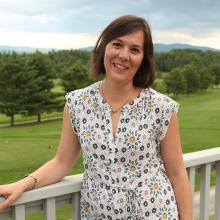
Esther Poveda Moreno
Research Summary
A native of Madrid (Spain) Esther Poveda’s love for languages, literature and traveling started at a young age, when she decided to complete a B.A. in English Philology at the Universidad Complutense in Madrid. Since then she has lived in Ireland, the United States, Spain and Guatemala, and she has travelled extensively in Europe and the Americas.
Ms. Poveda holds several higher education degrees: an M.A. in Spanish and a Graduate Certificate in Latin American Studies from the University of North Carolina at Chapel Hill, an M. A. in Amerindian Studies from Casa de América and the Universidad Complutense in Madrid. While in Guatemala, she conducted research for her dissertation on the literature of the Maya Movement.
Esther Poveda is interested in twentieth century Latin American narrative, specifically indigenista novels, testimonial writing and more recent indigenous literature.
Ms. Poveda’s teaching career started in 1994. Since then she has taught all levels of Spanish language and Spanish and Latin American literature and culture at UNC-Chapel Hill, Kalamazoo College, NYU in Madrid, Universidad Complutense de Madrid, Instituto de Empresa (Madrid), James Madison University, Easter Mennonite University, and the University of Virginia. She has loved every minute of it.
Education
A.B.D., Romance Languages. University of North Carolina at Chapel Hill (1999)
- Field Research in Guatemala on the literary productions of the Maya Movement.
- Graduate Certificate in Latin American Studies (1998), Duke-UNC Consortium in Latin American & Caribbean Studies
M.A., Estudios Amerindios. Departamento de Geografía e Historia, Universidad Complutense de Madrid, y Casa de América (Madrid, España) (2002)
M.A., Romance Languages. University of North Carolina at Chapel Hill (1996)
B.A., English. Universidad Complutense de Madrid. Spain (1992)
Research Interests
- 20 th -21 st century Latin American Literature
- Indigenous literature
- Indigenous movements and activism
- Social movements and activism
- Teaching Spanish as a Second Language
- Language for the Professiosn
- High-Impact Learning Practices
- Community engagement courses
Teaching
At UVa:
- SPAN 3040 (Business Spanish)
- SPAN 3030 (Cultural Conversations / Sí se puede: Community Engagement in Spanish Speaking Charlottesville)
- SPAN 3300 (Texts and Interpretation)
- SPAN 3010 (Grammar and Composition I)
- SPAN 3020 (Grammar and Composition II)
- SPAN-2020 (Intermediate Spanish II)
Summer Language Intensive Programs:
Middlebury College (Vermont) - Escuela Española (Summer 2015 and 2016)
- Communication, Levels 3 & 4
Monterey Institute of International Studies (California) - SILP (Summer IntensiveLanguage Program) (Summer 2013 and 2014)
- Advanced Intermediate Spanish
- Advanced Spanish
Study Abroad:
Instituto de Empresa (Madrid, Spain) (Fall 2003 and 2006)
- Curso intensivo de español avanzado para el MBA Internacional
New York University in Madrid (Spain) (2001-2003)
- One Hundred Years of Solitude and Magical Realism in Latin America
- Readings in Spanish American Literature
- Intermediate Spanish
- Intensive Introductory Spanish
Universidad Complutense de Madrid (Spain) (Spring 2002)
- Advanced Composition in Spanish
Universidad de Alcalá de Henares (Madrid, Spain) -- American Study Abroad Programs (Fall 2001)
- 19th and 20th Century Spanish Literature
Publications
“Luis Cardoza y Aragón”. Modern Spanish American Poets. Ed. María A. Salgado. Detroit: Gale, 2003.
“Otto Raúl González”. Modern Spanish American Poets. Ed. María A. Salgado. Detroit: Gale, 2003.
Academic translations
Mahler, Anne Garland. “’Todos los negros y todos los blancos y todos tomamos café’: Raza y desigualdad laboral en Coffea arábiga de Nicolás Guillen-Landrián,” trans. Esther Poveda. In Guillén Landrián: por un cine salvaje, eds. Julio Ramos and Dylon Robbins. Leiden, NL: Almenara Press, 2018.
Presentations
"Getting Real: The Role of e-Portfolios in Business Spanish Courses". The AAEEBL Southeast Conference: Eportfolio as a High Impact Practice: How Does Eportfolio Energize Liberal Education? Virginia Tech, October 2016.
“Using e-portfolios in the Second Language Classroom: The UVA Experience” (Roundtable). MIFLIC Mountain Interstate Foreign Languages Conference. James Madison University, Harrisonburg, October 2016.
“La literatura maya actual en Guatemala”. Seguir cantando: Voces de mujeres en indígenas en nuestras letras”. Spanish School at Middlebury College. June 2016.
“Electronic Portfolios for Learning and Assessment in Language Courses”. (Group Presentation). Institute of World Languages Spring Round Table Series. The University of Virginia, Charlottesville. March 2015
“From Sentence To Paragraph(s): Teaching Writing and Critical Thinking in the Foreign Language Classrooms”. (Group Presentation). Roundtable on Foreign Language Teaching and Learning. The University of Virginia, Charlottesville. October 2014.
“Turn up the Heat: The Creative Use of Games in the Classroom”. (Group Presentation). Roundtable on Foreign Language Teaching and Learning. The University of Virginia, Charlottesville. February 2014.
Grants & Awards
Learning Technology Incubator Grant. The University of Virginia, Charlottesville. September 2014 - June 2016.
Faculty Seminar on the Teaching of Writing. The University of Virginia, Charlottesville. May 2015.
Dissertation Completion Award, University of North Carolina, Chapel Hill, Graduate School, 2000-2001.
Off-Campus Dissertation Research Fellowship, University of North Carolina, Chapel Hill, Graduate School. 2000.
Tinker Field Research Grant, University of North Carolina, Chapel Hill, Institute of Latin American Studies. 1999.
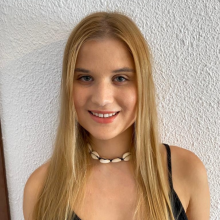
Ciara Raczyk
Education
Ph.D. Spanish, University of Virginia (in progress)
M.A. Linguistic, Literary, and Cultural Studies, Universidad de Sevilla (2023)
B.A. Modern Languages and Literatures (Spanish and English), Universitat de Barcelona (2022)
Research Interests
- 20th and 21st Century Latin American Literature and Culture
- Women, Gender and Sexuality Studies
- Latin American Women Authors
- Mexican Literature and Culture
- Border Studies
Grants & Awards
Erasmus +. University of Manchester, England, 2021.

Joel Rini
Research Summary
Joel Rini, Professor of Spanish Linguistics and Philology, has been teaching courses and conducting research on the internal history of the Spanish language at the University of Virginia since receiving his Ph.D. in Romance Linguistics in 1987 from the University of Michigan. To date, he has published two books and over thirty articles on various aspects of Spanish historical grammar. While he continues to focus on unresolved problems of Spanish historical morphology and syntax, he has recently turned some of his attention to diachronic and synchronic issues of gender in Spanish, from the earliest texts to the present day.
Education
Ph.D., University of Michigan
M.A., University of Michigan
B.S., Kent State University
Publications
Books
Exploring the Role of Morphology in the Evolution of Spanish Amsterdam: John Benjamins, Current Issues in Linguistic Theory 179, 1999.
Motives for Linguistic Change in the Formation of the Spanish Object Pronouns. Newark, Delaware: Juan de la Cuesta, 1992.
Selected Articles:
“A Reconsideration and Elaboration of a Previously Proposed Hypothesis for the Origin of the –y of Spanish soy, doy, voy, estoy.” Iberoromania 93 (2021): 137-155.
“Spanish quepo: The Untold Story.” Zeitschrift für romanische Philologie, 136 (2020): 730-748.
“A Morphological Factor in the History of the Irregular Future (and Conditional) of Spanish.” Studia Neophilologica 92 (2020): 111-123.
“Changing Genders: Linguistic Factors beyond Ambiguous Gender Marking and the Case of Spanish el arte vs. el ave and el hambre.” Bulletin of Spanish Studies 96:1 (2019): 1-16.
“The Paradoxical Survival of Spanish ¡Vamos! in the Face of Old Spanish ¡Vayamos! and the Loss of Old Spanish imos.” Iberoromania 88 (2018): 218-236.
“Are Some Spanish Nouns Truly Grammatical Hermaphrodites?” Zeitschrift für romanische Philologie 132 (2016): 731-754.
“The Enigmatic Morphology of Spanish azúcar ‘sugar’ and the ‘New Feminine el.’” Iberoromania 80 (2014): 244-260.
"Un nuevo análisis de la evolución de los imperativos singulares irregulares di, haz, ve, sé, ven, ten, pon, sal, (val).” Zeitschrift für romanische Philologie 130 (2014): 430-451.
“When Spanish h- Went Silent. How Do We Know?” Bulletin of Spanish Studies 87 (2010): 431-446.
“On the Formation of the Present Indicative Paradigm of Spanish ir and the Origin of vamos and vais.” Studies on Ibero-Romance Linguistics Dedicated to Ralph Penny. Eds. Roger Wright/Peter Ricketts. Delaware: Juan de la Cuesta (2005): 59-73.
“The Origin of Spanish entre tú y yo, ‘between you and me’: A Typological Parallel to English ‘between you and I’?” Diachronica 20 (2003): 139-165.
“The Extraordinary Survival of Spanish veía: Another Facet of Analogy Revealed.” Hispanic Review 69 (2001): 501-525.
“The Rise and Fall of Old Spanish 'Y’all': vos todos vs. vos otros.” Essays in Hispanic Linguistics Dedicated to Paul M. Lloyd. Eds. Blake, Robert J., Diana L. Ranson, and Roger Wright. Delaware: Juan de la Cuesta (1999): 209-221.
“The Formation of Old Spanish buey(s), bueyes, grey(s), greyes, ley(s), leyes, rey(s), reyes: A Morphophonological Analysis.” Hispanic Review 66 (1998): 1-19.
“The Origin of Spanish ser: A Phonosyntactic Analysis.” Romance Philology 50 (1997): 295-307.
“The Vocalic Formation of the Spanish Verbal Suffixes -áis/-ás, -éis/-és, -ois/-os, and -ís: A Case of Phonological or Morphological Change?” Iberoromania 44 (1996): 1-16.
“The Evolution of the Nature and Position of the Spanish Clitic Pronoun.” La corónica 24 (1995): 173-195.
“On the Evolution of Spanish cigüeña and the Blending of Multiple Variants.” Hispanic Review 61 (1993): 519-529.
“Metathesis of Yod and the Palatalization of Latin Medial /k’l/, /g’l/, /t’l/; /ks/, /ssj/, /sj/; /kt/, /ult/ in Hispano- and Luso-Romance.” Linguistic Studies in Medieval Spanish. Eds. Harris-Northall, Ray and Thomas D. Cravens. Hispanic Seminary for Medieval Studies, University of Wisconsin, Madison (1991): 109-133.
“Dating the Grammaticalization of the Spanish Clitic Pronoun.” Zeitschrift für romanische Philologie 106 (1990): 354-370.
“On the Chronology of Spanish conmigo, contigo, consigo, and the Interaction of Phonological, Syntactic, and Morphological Processes.” Hispanic Review 58 (1990): 503-512.
“A New Perspective on the Origin of le for les.” Journal of Hispanic Philology 12 (1988): 207-219.

Fernando Riva
Education
PhD, Yale (2017)
Research Summary
My research investigates the process of appropriation and absorption of Arabic and Jewish knowledge in vernacular Iberian literatures in the Middle Ages. This process of appropriation and absorption has two distinct aspects. The first type appears as a tense reaction against the social and intellectual changes of the twelve and thirteenth centuries as portrayed in several cuaderna vía poems. The second type emerges as a conscious reinterpretation which seeks to support an imperial project such as that of King Alfonso the Wise. My first book, published in May of 2019 in Spain, which has been reviewed in top-tier international journals, concerns the first type of appropriation and absorption: it analyzes the concept of knowledge in the thirteenth-century Spanish work known as Libro de Alexandre (c. 1220-1235), where I study the role played by intellectual curiosity and its relation with the deep cultural changes that began in the twelfth century throughout the Mediterranean. My current research project, which is under contract with the University of Toronto Press, is derived from my first book and deals with the second type of appropriation and absorption, i.e., the fruitful reinterpretation of magic, astrology, natural philosophy, the discourse of secrets, and their relation to a political project in the medieval Iberian Peninsula. As part of a solid continuity in my research, this second book will be a complement to the first one and an attempt to offer a whole analysis of the literary and cultural phenomena in thirteenth-century Christian Iberia. These dynamics of appropriation, in turn, will lay the foundation for the Renaissance and the Early Modern Period. In that sense, my research is relevant to debates on medieval intellectual history, religious studies, history of science, translation studies, and the growing field of Mediterranean studies.
Books
Nunca mayor sobervia comidió Luçifer’. Límites del conocimiento y cultura claustral en el Libro de Alexandre. Madrid: Iberoamericana Editorial Vervuert, 2019.
Reviewed in Bulletin of Spanish Studies 97.9 (2020) (Cossío); La corónica 49.1 (2020) (Giles); Speculum 96.3 (2021) (Pinet); Bulletin of Hispanic Studies 98.10 (Gerli) (2021); Mirabilia (Cortijo Ocaña) (2021-2022); Incipit 41 (Funes) (2021); Bulletin Hispanique (Navarro) (2021); Hispanófila 195 (Bower) (2022); Symposium 76.4 (Ancos) (2022); Lexis 47.1 (Wiesse) (2023).
Books of Secret Wisdom: The Development of Magic in the Iberian Peninsula (Castile and Aragon, 1106-1428) (under contract with University of Toronto Press, expected completion date, Spring 2024)
Articles in peer-reviewed journals
"Reclusión femenina, escatología y fenómenos sobrenaturales en Planeta de Diego García de Campos". Poéticas. Revista de Estudios Literarios 18 (2024): 5-25.
"Nigromancia ilusoria y ruptura del secreto en el Exemplo XI del Conde Lucanor". Zeitschrift für romanische Philologie 139.4 (2023): 1131-1160.
“Ca con la uest antigua avié su cofradría: Some Demonological Aspects in Berceo’s “El Milagro de Teófilo”. Romanische Forschungen 134.4 (2022): 506-524.
“Eschatological Afterlife and the Immortality of the Soul in Berceo’s ‘El prior y el sacristán’”. Zeitschrift für romanische Philologie 138.3 (2022): 709-739.
“Demonic Jews and Christian Redemption in Berceo's ‘Milagro de Teófilo’”. Romance Quarterly 68.4 (2021): 240-256.
“‘Cinco somos los qe aqí moramos’: Exorcism and Apocalyptic Piety in Berceo’s Vida de San Millán.” Ehumanista 49 (2021): 333-350.
‘Est iste liber maximi secreti’: Alfonso X’s Liber Razielis and the Secrets of Kingship.” Neophilologus 104.4 (2020): 485-502.
“De morte anime: Solomonic Magic in Alfonso X's Cantiga 125". Romance Notes 60.2 (2020): 253-263.
“‘La carne es la tierra’: Microcosmic Adam, Cartographic Christ in the Libro de Alexandre”. Journal of Iberian Medieval 12.1 (2020): 44-69.
“Los primeros profetas esto profetyzaron: función de la cautividad babilónica y las profecías del fin en el Libro de Fernán Gonçález. Hispanic Review 87.4 (2019): 387-410.
“El täu en las puertas de sagne del añel: la pascua apocalítiptica y el encierro de las diez tribus en el Libro de Alexandre”. La corónica 48.1 (2019):
“Mas querìa ir perdersse o la uentura mudar: curiosidad intelectual y peregrinaje en el Libro de Apolonio”. La corónica 47.1 (2018): 29-50. Best Article vol. 47 (Fall 2018-Spring 2019). Awarded John K. Walsh Prize by the Executive Committee of the MLA Forum, LLC Medieval Iberian.
“De obscura materia obscurament’ dictadas: interpretación y profecía en dos pasajes del Libro de Alexandre”. La corónica 46.2 (2018): 79-100.
“Monarquía babilónica y soberbia luciferina en el Libro de Alexandre”. Bulletin of Hispanic Studies 95.10 (2018): 1031-51.
“Sapiencialismo, espiritualidad claustral y heterodoxias en el Libro de Alexandre”. Bulletin of Spanish Studies 95.4 (2018): 187-217“La imagen ante los ojos: enfermedad de amor y castidad celeste en ‘La fuerza de la sangre’ de Miguel de Cervantes”. Bulletin of Hispanic Studies 93.2 (2016): 113-29.
“San Jerónimo en el eje de la polémica en torno de la Carta Atenagórica de Sor Juana Inés de la Cruz”. Hispanic Review 82.1 (2014):1-20.
“El último Garcilaso: la Égloga III y la incorporación de la literatura”. Boletín de la Academia Peruana de la Lengua 52 (2011): 139-57.
"Vuestra vertud me vala, gloriosa, en mi exida: función del culto mariano e ideología de cruzada en el Poema de Mio Cid”. Lexis 35.2 (2011): 119-39.
“Traductología renacentista y literalidad: un análisis paratextual de la traducción del Inca Garcilaso de la Vega de Los Diálogos de amor de León Hebreo”. Escritura y Pensamiento 18 (2006): 7-36

Cole Rizki
Research Summary
Cole Rizki is a Latin Americanist and transgender studies scholar whose research examines the entanglements of transgender cultural production and activisms with histories of state violence and terror throughout the Américas. Rizki’s current book project, tentatively titled “Transfeminist Tide: Trans Politics Beyond Liberalism", examines Argentine travesti and trans politics and aesthetics to bring the study of democracy and its illiberal correlates to the forefront of trans studies. Moving across trans photographic archives of resistance, state intelligence and police archives, trans literary and cultural production, and activist practices that respond to state terror, his monograph establishes a new historical and cultural interpretation of trans politics as a response to illiberal state violence and its forms. Rizki is at work on a second monograph, tentatively titled “Hemispheric Trans Studies: American Transcultural Encounters and Practices.” This monograph will develop a distinct hemispheric orientation within the field of transgender studies by centering south-south exchanges to engage the work of theorists, political agents, and cultural producers working across Latin America and the US Global South. This project theorizes a travesti-trans of color analytic to track the geopolitics of repair and the reparative premises of both trans of color and travesti theory in the wake of multiple forms of state violence. He is invited guest editor of a special issue of NACLA: Report on the Americas on queer and trans resistance to violence (expected December 2024); co-editor of "Trans Studies en las Américas," a special issue of TSQ: Transgender Studies Quarterly on Latin American, Caribbean, and Latinx Trans Studies (May 2019); and TSQ’s current Translation Section Editor (2020-present). His recent article “Familiar Grammars of Loss and Belonging: Curating Trans Kinship in Post-Dictatorship Argentina” was short-listed for the International Association for Visual Culture and the Journal of Visual Culture Early Career Researcher Essay Prize. His work appears in or is forthcoming with journals such as TSQ, Journal of Visual Culture, Balam, Journal of Latin American Cultural Studies, and Radical History Review.
Affiliate Faculty, Department of Women, Gender & Sexuality
Links
Education
Publications
Peer-Reviewed Articles
“Gore Aesthetics: Chilean Necroliberalism and Travesti Resistance,” Journal of Latin American Cultural Studies special issue “Sexual Obscenity and Libidinal Politics in Latin America” (accepted, expected publication date December 2023)
-
Finalist for the International Association for Visual Culture and the Journal of Visual Culture Early Career Researcher Essay Prize (2020)
Essays & Roundtables
“Estéticas de sobrevivencia. Arte de reparación” exhibition catalogue essay in ¿Cómo retratar a una sobreviviente? Germán Menna (ed.) (accepted, expected publication Spring 2024).
“Visualizing (trans)masculinities” Balam, no. 9, special issue “Nuevas masculinidades” (August 2023): 31-32, 250, 257. *Introduction to special issue of Balam, contemporary Latin American photography journal in Spanish/English/Portuguese.
Edited Volumes
Invited guest editor of NACLA: Report on the Americas special issue on queer and trans resistance to violence. Volume in preparation, details and call forthcoming. (Expected publication date December 2024).
Editorial Positions
Translation Section Editor of TSQ: Transgender Studies Quarterly, (2020-present)
Work that appears under Rizki’s editorship:
- Cole Rizki, “Trans-, Translation, Transnational,” section introduction, vol 8, no. 4 (2021): 532-536.
- Cynthia Citlallin Delgado Huitrón, “Transtocar, Three Fragments” in vol. 9, no. 1 (2022): 119-125.
- Francisco Fernández and Andrés Mendieta, “Toward a Trans* Masculine Genealogy in South America” in vol. 9, no. 3 (2022): 524-534.
- Liz Rose, “Trans* Poetics in Translation: Desire and Capacity in the Work of Susy Shock” in vol. 10, no. 1 (2023): 59-70.
- Marlene Wayar, “In My Mind There is a Cemetery / Hay un cementerio en mi cabeza” translated by Tania Balderas (forthcoming 2023)
- Eugenia Azar and Pilar Cabrera, “To Exist and Resist: A Photographic Essay / Existir y resistir: un ensayo fotográfico,” translated by Tania Balderas (forthcoming 2023)
Book Reviews
Selected Grants & Awards
Versatile Humanists Summer Internship Program, Duke University, Equality North Carolina, Summer 2019
Kenan Institute for Ethics Graduate Fellow, Duke University, 2018-2019
Courses
Undergraduate
Transgender Studies in the Americas
Queer Theory and Cultural Production in the Americas
Survey of Latin American Literature II
Graduate
Transgender Studies in the Americas

Charlotte Rogers
Charlotte Rogers' Office Hours on Zoom:
Link: https://virginia.zoom.us/j/97192686806?pwd=cDhUV29tSXkwdlBvQWNRbGdCRzVWUT09
Meeting ID: 971 9268 6806
Passcode: charla
Research Summary
Charlotte Rogers specializes in twentieth- and twenty-first-century Latin America and the Caribbean, with a comparative focus on representations of the tropics in literature and culture. She is the author of Jungle Fever: Exploring Madness and Medicine in Twentieth-Century Tropical Narratives (Vanderbilt University Press, 2012) and Mourning El Dorado: Literature and Extractivism in the American Tropics (University of Virginia Press, 2019). Mourning El Dorado received Honorable Mention in the Latin American Studies Association Amazonia section Best Book Prize competition in 2020. Her articles appear in journals including PMLA, ISLE: Interdisciplinary Studies in Literature and the Environment, Revista de Estudios Hispánicos, Bulletin of Hispanic Studies, Hispania, MLN and the Revista Canadiense de Estudios Hispánicos. She serves on the Peer Advisory Board for PMLA (2020-2023) and on the Editorial Board of the Revista de Estudios Hispánicos. Her new research project takes an ecocritical approach in examining the twenty-first-century Caribbean literature and art. At UVa, Professor Rogers is a core faculty member in the Environmental Humanities, a founding member of the Interdisciplinary Doctoral Fellowship in Caribbean Literatures, Arts, and Cultures, and Director of Graduate Admissions for the Ph.D. program in Spanish.
Education
Ph.D., Yale University
M.A., Yale University
B.A., Barnard College, Columbia University
Selected Publications
Books
Mourning El Dorado: Literature and Extractivism in the American Tropics. University of Virginia Press, 2019.
Jungle Fever: Exploring Madness and Medicine in Twentieth-Century Tropical Narratives. Vanderbilt University Press, 2012.
Articles:
“Art and Debt in the Oldest Colony: Creative Resistance in Contemporary Puerto Rican Culture.” The Routledge Companion to Twentieth and Twenty-First Century Latin American Literary and Cultural Forms. Edited by Mariano Siskind and Guillermina de Ferrari. Routledge, publication mid-2021.
“Eco-Magical Realism: An Eco-critical Interpretation of the Hurricane in Gabriel García Márquez’s The Autumn of the Patriarch.” ISLE: Interdisciplinary Studies in Literature and the Environment. October 2020, https://doi-org.proxy01.its.virginia.edu/10.1093/isle/isaa111
“Rita Indiana’s Queer Interspecies Caribbean and the Hispanic Literary Tradition,” Small Axe Salon, (Duke UP). July 30, 2020, http://smallaxe.net/sxsalon/discussions/rita-indianas-queer-interspecies....
“Notas del viaje a la Gran Sabana (Notes of the Trip to the Great Savannah) by Alejo Carpentier.” Translation and Introduction for “Little Known Documents,” PMLA, volume 134, number 5, October 2019, 1104-1108.
“‘El ágora entre manglares:’ la arquitectura griega en El siglo de las luces de Alejo Carpentier.” Revista de Estudios Hispánicos, volume 53, number 1, May 2019, 283-303.
“The Environmentalism of Poor Women of Color in Mayra Santos Febres’s Nuestra Señora de la Noche.” Ecofictions, Ecorealities and Slow Violence in Latin America and the Latinx World. Routledge, 2019.
“Nostalgia and Mourning in Milton Hatoum’s Órfãos do Eldorado.” In Intimate Frontiers: A Literary Geography of the Amazon. Edited by Javiar Uriarte and Felipe Martínez Pinzón. Liverpool University Press, 2019, 248-266.
“Los pasos encontrados en la Fundación Alejo Carpentier.” Cuadernos hispanoamericanos. 792. (June 2016) 105-108
“Mario Vargas Llosa and the novela de la selva.” The Bulletin of Spanish Studies. 93 (July 2016) 1043-1060.
“‘La selva no tiene nada de inesperado:’ Amazonian Disillusionment in La Nieve del Almirante by Alvaro Mutis.” Orillas. 4 (2015). Online.
“Guillotina y fiesta en El siglo de las luces.” MLN. 128.2 (March 2013) 335-351.
“El órfico ensalmador: Ethnography and Shamanism in Alejo Carpentier’s Los pasos perdidos.” Revista Canadiense de Estudios Hispánicos. 35.2 (September 2011). 351-372.
“Carpentier, Collecting, and lo barroco americano.” Hispania. 94:2 (June 2011). 240-251.
“Medicine, Madness, and Writing in La vorágine.” Bulletin of Hispanic Studies (Liverpool). 87.2 (January 2010): 89-108.
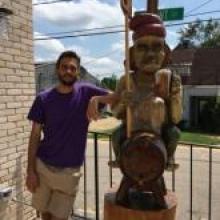
Erick Romig
Education
Research Interests
- Medieval literature
- Philosophy
- Pre-council of Trent Christianity
Teaching
SPAN 2010
SPTR 3402 (Don Quixote)
Presentations
"Women and the Worlds of Business in the Work of Joaquina Vera." Women as Creators and Distributors of Wealth, MLA, 05 January 2017, Philadelphia, PA.
Grants & Awards
GSAS Arts, Humanities and Social Sciences Summer Research Award (2016)
SIP Summer Language Study Fellowship, Latin (2015)
Jefferson Fellowship (2015-Present)
Fulbright (2012-2013)
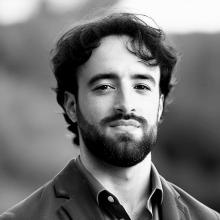
Robert Sanchis-Álvarez
Education
Ph.D. Spanish, University of Virginia (in progress)
Urban Design Program Certificate (Urban History track). University of Virginia School of Architecture (in progress)
M.A. in Advanced Studies in Spanish and Latin American Literature. University of Barcelona (2019)
B.A. Hispanic Studies & Linguistics. University of Barcelona (2017)
Research Interests:
- 19th Century and Modern Transpacific Cultural Production
- Architectural History
- Urban History and Design
- Catalan Studies
- Philippine Literature in Spanish
- Historical Memory
- Digital Humanities
Presentations:
“Intertextualidades y encuentros en Barcelona, y de vuelta a Manila. Estudio comparativo de La Solidaridad.” Forthcoming presentation at Congreso Internacional de literatura hispanofilipina. Universidad de Málaga, 2023.
“Geocultural Readings of a Colonial Metropolis: Exploring Representations of Space in 19th Century Barcelona’s Expansion.” Presentation at Urban Narratives Panel: 18th International Colloquium of the North American Catalan Society. University of Massachusetts Amherst, April 2022.
“Urban F(r)ictions in the Modern City. Contributions from a Global Hispanophone Perspective. “ Center for Global Inquiry and Innovation - Graduate Student Brown Bag Lunch, University of Virginia, April 2022.
“Idiom’s instruction: Assessing Cultural Value in the Classroom.” Presentation at International World Languages Roundtable series. University of Virginia, November 2021.
“Spatial Poetics in Roberto Bolaño’s Los detectives salvajes”, Presentation at LALISA: Latin American Latino/a & Iberian Studies Association of the Pacific Northwest, April 2019.
Fellowships, Grants and Awards:
Dean’s PhD-Architecture Fellowship in Urban Design. University of Virginia (2022-2024)
Summer Research Fellowship, Dept of Spanish Italian and Portuguese, University of Virginia (2023)
Nelson Scholar Fellow in East Asian Studies, East Asia Center, University of Virginia (2022)
UVA Arts, Humanities and Social Sciences Research Fellowship (2022)
Graduate Global Research Grant. Center for Global Inquiry and Innovation (2022)
Spanish Language Scholar Fellowship, Reed College (2019)
Erasmus + Grant, University of Catania (2018)
Book Reviews:
“Guinea: El delirio colonial de España”, by Iñaki Tofiño in Transmodernity: Journal of Peripheral Cultural Production of the Luso-Hispanic World, forthcoming 2024.
Teaching:
SPAN3300: Spanish Texts and Interpretation
SPAN3040: Business Spanish
SPAN2010: Intermediate Spanish Language and Culture
SPAN1060: Intensive Elementary Spanish Language & Culture
Specialized Training:
The Margins of Global Hispanophone Literature. Summer School. University of Antwerp, 2023.
Summer Design Institute. University of Virginia School of Architecture, 2022.
Current Perspectives on Memory, European Observatory on Memories of the University of Barcelona, Citizens, Equality, Rights and Values program of the European Union, 2021-2022.
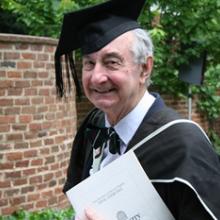
Donald L. Shaw
From 1986 until 2012, Donald L. Shaw taught courses in Latin American literature, history, and culture. His many publications in Latin American and transatlantic Iberian studies include Historia de la literatura española: Siglo XIX and La generación del 98.
On January 30, 2017, Professor Shaw passed away in Bologna, Italy. He is remembered fondly by his students and colleagues.

Sergio Manuel Silva Ardila
Education
Ph.D., Spanish, University of Virginia (in progress)
M.A., Spanish, University of Virginia (2021)
B.A., Literary Studies, Universidad Nacional de Colombia (2017)
Research Interests
-
Early Modern Iberian Literature
-
Poetry and Poetics
-
Material Culture
-
Queer Studies
-
Contemporary Colombian Narrative
Publications
Afterlives in Stone. Religion, Race & Democracy Lab, University of Virginia (2021).
"Viernes Santo," La caída literary magazine (March 2018).
Review, "Cuesta Hernández, Luis Javier. Ut architectura poesis: Relaciones entre arquitectura y literatura en la Nueva España durante el siglo XVII". Literatura: teoría, historia, crítica 18, 2 (2016).
Teaching
University of Virginia
• SPAN 3020, Grammar and Composition II (Fall 2022, Spring 2023)
• SPAN 2020, Advanced Intermediate Spanish (Summer 2022)
• SPAN 3010, Grammar and Composition (Spring 2022)
• SPAN 3300, Text and Interpretation (Fall 2021)
• SPAN 2010, Intermediate Spanish (Fall 2020, Spring 2021, Summer 2021)
Presentations
“Lectura es más laberinto (y no menos lisonja).” Presentation given at the panel Sor Juana Inés de la Cruz, Society for Renaissance and Baroque Hispanic Poetry, University of Illinois, Chicago, September 2023.
“Sor Juana y la lectura lisonjera.” Presentation given at the Graduate Student Lecture Series, Department of Spanish, Italian and Portuguese, University of Virginia, May 04, 2023.
“Hallowed Stones, Stones that Move: A Guaca in Seventeenth Century Nueva Granada.” Presentation given at the CGII Graduate Student Brown Bag Lunch, University of Virginia, April 12, 2023.
“The Winter’s Tale: Narrators, Witnesses, and the Crafting of Compassion.” Presentation given at the panel Shakespeare and Empathy, Northeastern Modern Language Association, Niagara Falls, New York, March 2023.
“Speaking with This Flattering Portrait.” Presentation given at the panel Inhuman Voices: Writing and the Non-Human, Association of Comparative Literature of America, Chicago, March 2023.
“La ceiba de la memoria: una re-escritura de la esclavitud en la Cartagena del siglo XVII por quienes han sido silenciados,” II Congress of Poscolonial Studies and III Sessions of Poscolonial Feminism “Genealogías críticas de la colonialidad,” CLACSO – UNSAM, Buenos Aires, December 2014.
Grants and Awards
Charles Gordon Reid Summer Travel Fellowship. Department of Spanish, Italian and Portuguese, University of Virginia (Summer 2023)
Summer Language Fellowship. Department of Spanish, Italian and Portuguese, University of Virginia (Summer 2023)
Graduate Global Research Grant. Center for Global Inquiry and Innovation, University of Virginia (Fall 2022)
Student Research Collaborator. Religion, Race & Democracy Lab, University of Virginia (Fall 2020–Spring 2021)
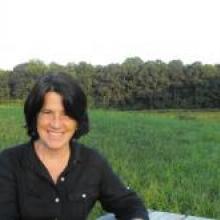
Paula Sprague
Research Summary
Please download Dr. Sprague's current C.V. for a full list of her publications, awards, and interests in research and teaching.
Education
Ph.D., Modern Peninsular Spanish Literature; University of Wisconsin-Madison (2002)
M.A., Hispanic language and literatures; University of Wisconsin-Madison
B,A., Spanish; Knox College
Dissertation
Research Interests
- Hispanic poetry
- Media and film
- Periodicals in social change
- Catalan studies
- Bilingualism
- Composition pedagogy
- Language teaching
Teaching
UVA Department of Spanish, Italian and Portuguese (2012-present):
- SPAN 2020 – Advanced Intermediate Spanish
- SPAN 3010 – Grammar & Composition I
- SPAN 3020 – Grammar & Composition II
- SPAN 3040 – Business Spanish
- SPAN 3300 – Texts and Interpretation
Previous experience (Trinity College and Dartmouth College):
- Beginning and Intermediate language
- Iberian and Latin American Music & Conversation
- Iberian and Latin American Film & Conversation
- Studying in the Hispanic World (Post study-abroad seminar)
- From Romantics to Moderns: The Nineteenth Century
- Hispanic Literature II: Survey of Eighteenth and Nineteenth Centuries
- Hispanic Literature III: Surey of Twentieth and Twenty-First Centuries
- Poetics and Politics of Love in Contemporary Spanish Poetry
- Turn-of-the-Century Literature in Spain
- Avant-garde Movements and Social Poetry in Spain
- Exile, Repression and Writing in Post-Civil War Spain
- Recent Spanish Poetry: The Re-conquest of Subjectivity
Other teaching:
- Study-abroad - Dartmouth College
- Directed and taught in 3 study-abroad programs in Spain.
Selected Publications
El Europeo (Barcelona, 1823-1824): Prensa, modernidad y universalismo (Madrid: Editorial Iberoamericana/Vervuert, 2009).
“Lecciones de geografía: Escenarios poéticos/políticos del fin-de-siglo”. En buena compañía. Ensayos en honor de Luciano García Lorenzo (Madrid: CSIC, 2009), pp. 995-1004.
“Parodia y paradoja en el primer Pitarra: La estética fundacional de Frederic Soler contra la Renaixença”. Estrenado con gran aplauso: Teatro español, 1844-1936. Collected essays (Madrid: Iberoamericana/Vervuert 2008), pp. 99-114.
Book Reviews
Barcelona: An Urban History of Science and Modernity, 1888-1929, by Oliver Hochadel and Agustí Nieto-Galan, eds. Routledge, 2016. Forthcoming in Catalan Review (2017).
Letters to a Young Poet, by Joan Margarit; translation by Christopher Maurer. In Catalan Review, XXVI (2012).
Trafficking Knowledge in Early Twentieth-Century Spain. Centres of Exchange and Cultural Imaginaries, by Alison Sinclair. In Journal of Spanish Cultural Studies (12.3): 2012.
Tecnología, espectáculo, literatura. Dispositivos ópticos en las letras españolas de los siglos XVIII & XIX, by Luis Miguel Fernández. In The Eighteenth Century: a Current Bibliography (32): 2010.
Presentations
“Necessary Rust: A poetics of Joan Margarit”. XVI International Colloquium of the North American Catalan Society (NACS); University of Indiana. 2017.
“A Mobile Romanticism: Fiorenzo Galli and El Europeo”. Mountain Interstate Foreign Language Conference; James Madison University. 2016.
“Pedagogies for teaching 20th & 21st Century Literature from Spain”. Two-day workshop for high school and college instructors. El Foro Internacional por la lectura, Argentina. 2016.
"Reading the Newspaper: What 19th-Century Periodicals Can tell us About Linguistic and Cultural Diversity in Spain". UVA Institue of World Languages Roundtable on Foreign Language Teaching & Learning Grant Exhibition. 2016.
“A Positivist-Romantic Project: El Propagador de la Libertat y El poeta y el banquero”. XV International Colloquium of the North American Catalan Society (NACS); Institut d’Estudis Catalans, Barcelona, Spain. 2015.
Round Table on Foreign Language Teaching & Learning (RTFL). “From Sentence to Paragraph(s): Teaching Writing and Critical Thinking in Foreign Language Classrooms” with Dr. James Seitz, Director of the Academic and Professional Writing Program, and Esther Poveda, SIP Lecturer. UVA. 2014.
Round Table on Foreign Language Teaching & Learning (RTFL). “Turn Up the Heat, Creative use of Games in the Classroom” with Carrie Bramlet, Eperanza Gorriz, Esther Poveda, and Matthew Street. UVA. 2014.
“Humor and Politics in Sexenio Periodicals (Barcelona and Madrid)”. Kentucky Foreign Language Conference (KFLC); Lexington, KY. 2012.
Panel: "Joan Maragall: A Legacy of Engagement". Organized and chaired panel, Modern Language Association Annual Convention (MLA); Seattle, WA. 2012.
"After Study-abroad: Pedagogies for Coming Home". Conference of the New England Council of Latin American Studies (NECLAS); Hanover, NH. 2011.
Grants & Awards (at UVa)
Facutly Initiated Project Grant, Institute of World Languages, UVA. 2016-2017.
Pilot of Spanish Language Writing Tutoring. 2016-2017.
UVA Institute for World Languages Faculty Development Grant; conference travel. 2015.
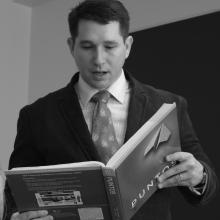
Matthew Street
Education
M.A., Spanish Language and Literature, University of South Carolina (2013)
TEFL/TESL Certificate, International TEFL Academy & INTESOL Worldwide, Heredia, Costa Rica (2013)
B.A., Spanish, University of Louisiana at Monroe (2011)
Research Interests
- Second Language Acquisition
- Applied Linguistics
- Active Learning pedagogy
- E-Portfolios in the foreign language classroom
Teaching
Accelerated Beginning Spanish (2013-Present)
Preceptor for Accelerated Beginning Spanish (2014-Present)
- Accelerated Beginning Spanish Course Digication
- Accelerated Beginning Spanish Course WordPress Site
- Active Learning Spaces Student Perspectives
- Learning Design & Technology Faculty Story
Presentations
“Intensifying Student Participation and Engagement Using an Active Learning Space.” Institute of World Languages Roundtable. The University of Virginia. (2016)
“Facilitating Language Learning Through an E-Portfolio in Accelerated Beginning Spanish at University of Virginia.” The AAEEBL (The Association for Authentic, Experiential and Evidence-Based Learning) regional conference at Virginia Tech.
“Collecting and Reflecting: Deeper Learning through a Word Press E-portfolio Project in Accelerated Beginning Spanish at the University of Virginia.” Kentucky Foreign Language Conference, the University of Kentucky. (2016)
“Implementation and Integration of the e-Portfolio in the Foreign Language Classroom.” (Group Presentation) Institute or World Language Faculty Retreat (2016)
“Turn up the Heat: The Creative Use of Games in the Classroom.” (Group Presentation) Roundtable Teaching and Learning. The University of Virginia, Charlottesville. October 2014.
Grants & Awards
Foreign Language Learning e-Portfolio (team member) (2015-2017)
Professional Organizations
Zeta Zeta Chapter of Sigma Delta Pi (Chapter Advisor) (2013- Present)

Fernando Valverde
Fernando Valverde has been voted the most relevant Spanish-language poet born since 1970 by nearly two hundred critics and researchers from more than one hundred internationally recognized universities (Harvard, Oxford, Columbia, Princeton, Bologna, Salamanca, UNAM and the Sorbonne). His books have been published in different countries in Europe and America and translated into several languages. He has received some of the most significant awards for poetry in Spanish, among them the Federico García Lorca, the Emilio Alarcos del Principado de Asturias and the Antonio Machado. His last book, The Insistence of Harm, has been the most-sold book of poetry in Spain for months and has received the Book of the Year award from the Latino American Writers Institute of the City University of New York. For his collaboration in a work of fusion between poetry and flamenco he was nominated for a Latin Grammy in 2014. For ten years he has worked as a journalist for the Spanish newspaper El País. He founded and directed the International Festival of Poetry in Granada, one of the most important literary events in Europe, that has received more than 300 authors, including several Nobel Prize laureates.
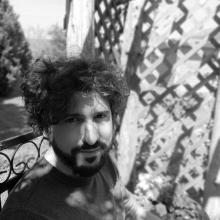
Carlos Velazco Fernández
Education
Ph.D. Spanish, University of Virginia (in progress)
M.A., Spanish, University of Virginia
B.A. Journalism, University of Havana
Research Interests
Caribbean cultures, Migration and Diaspora, Memory studies, Relationship of literature and art with cultural history, Cuban Archive.
Selected publications
Books
Leonardo Jaime Soriano, Cuba no existe. (Selection, prologue, and notes.) Editorial Silueta, 2018.
Desnudo de una actriz. Ingrid González: la viuda de Reinaldo Arenas. Editorial Hypermedia, 2016.
René Jordán, La angustia del sábado. (Selection and prologue.) Editorial Silueta, 2015.
Hablar de Guillermo Rosales. (Co-author with Elizabeth Mirabal.) Editorial Silueta, 2013.
Buscando a Caín. (Co-author with Elizabeth Mirabal.) Ediciones ICAIC, 2012.
Articles
“Reinaldo Arenas, viral.” In Reinaldo Arenas. La escritura como destino. Edited by Rita Molinero and Yolanda Izquierdo. Isla Negra Editores, 2021, 95-102.
“Cinco recuerdos del porvenir.” Cuban Studies 47, March 2019: 69-79.
“Invitación a Carlos Victoria.” Revista Surco Sur 9, 2016: 44-45.
“Esteban Luis Cárdenas, patakí.” Unión 78, 2013: 86-89.
“Viaje al final del Lunes.” In Lunes de Revolución 1959-1961 [Digital edition]. Biblioteca Nacional José Martí, 2012
Selected presentations
“Masters of Lydia Cabrera,” Panel “Colonialidad/Decolonialidad y Raza,” LASA/Africa 2023 Congress: África y América Latina: Diálogos y Conexiones, Accra, November 15, 2023
“Una obra compartida: la itinerante casa cuir de Lydia Cabrera y María Teresa de Rojas,” Panel “Queering Space and Time Across Geographies,” El Monte: Narratives, Aesthetics, and Afrodiasporic Spirituality in the Contemporary Caribbean, Rutgers University, New Brunswick, November 10, 2023.
“‘Todo lo que es santo sirve’: La sociedad Abakuá y la mujer cubana en el cine de Sara Gómez,” Second International Conference of Hispanic Women Filmmakers, Clark University, Worcester, October 20, 2023.
“Lydia Cabrera’s Stories: Pioneering Caribbean Science Sci-Fi and Fantasy from Another Small Place,” Panel “Cultural Creatives/Sacred Traditions,” 47th Caribbean Studies Association Annual Conference, University of the Virgin Islands, Saint Croix, June 7, 2023.
“Lydia Cabrera y el itinerario afrocubano del espacio colonial”, Panel “Cuba: From the Afro-Colonial Imaginary to the Special Period to the Moon,” The Languages, Literatures, and Cultures Conference, University of Kentucky, Lexington, April 23, 2022.
“Reescrituras y apropiaciones del Lazarillo de Tormes por Reinaldo Arenas”, Panel “Caos, violencia y muerte en España y América Latina”, Eleventh Romance Language and Literatures Graduate Conference, University at Buffalo, April 9, 2022.
“Los Orichas en la Otra Cuba, según Lydia Cabrera”, Panel “Literatura, religión y política en Cuba,” Thirteenth Conference on Cuban and Cuban-American Studies, Florida International University, February 3, 2022.
“El intelectual cubano y el debate social,” Panel “The Place of Culture: Canon, Counter-Canon, and the Politics of Memory,” Cuban Transitions: What’s Left Out?, Brown University, May 6, 2016.
“Si nos llamáramos Guillermo Rosales (una obra frente a la intemperie insular),” Panel “Exclusiones, exilios y regresos en la literatura cubana y su diáspora,” XXXIII International Congress of the Latin American Association (LASA), San Juan, May 29, 2015.
Grants & Awards
Arts, Humanities, and Social Sciences Summer Research Fellowship, Graduate School of Arts and Sciences and Office of Graduate and Postdoctoral Affairs, University of Virginia, 2023
Summer Research Fellowship, Department of Spanish, Italian, and Portuguese, University of Virginia, 2023
Americas Center/Centro de las Américas Research Grant, University of Virginia, 2022
Goizueta Graduate Pre-Prospectus Fellowship, Cuban Heritage Collection, University of Miami, 2022-2023
Professional Development Award, Office of Graduate and Postdoctoral Affairs-Diversity Programs, University of Virginia, 2022
Graduate Global Research Grant, Center for Global Inquiry + Innovation, University of Virginia, 2022
Charles Gordon Reid Fellowship, Department of Spanish, Italian and Portuguese, University of Virginia, 2022
Public Humanities Fellowship in South Atlantic Studies, University of Virginia, 2022
Graduate School of Arts and Sciences Research Grant, University of Virginia, 2021-present
Interdisciplinary Doctoral Fellowship in Caribbean Literatures, Arts, and Cultures, University of Virginia, 2021-present
Omar Velázquez-Mendoza
Research Summary
Omar Velázquez-Mendoza is Associate Professor of Hispanic Linguistics. He specializes in the history of Iberian Romance and the acquisition of advanced literacy in first and second languages. Professor Velázquez-Mendoza is assistant researcher for Madrid's Consejo Superior de Investigaciones Científicas, as well as for the bi-national (US-Mexico) project entitled Corpus del Lenguaje Académico en Español (CLAE).
His most recent publications center upon linguistic variation in Late Latin and Early Romance (Leonese, Castilian, Navarro-Aragonese, and Portuguese), the consolidation of verb-object in Hispano-Romance, the role of analogy in language change, and the sociolinguistic milieu pertaining to the writing practices of the Iberian notaries of the High Middle Ages (eighth to thirteenth century).
Professor Velázquez-Mendoza's books explore: (a) Word order patterns and correlations of eighth-century Luso-Hispano-Romance; and (b) The historical development of (in)animate direct object marking in Luso-Ibero-Romance.
Education
Ph.D., Hispanic Linguistics (University of California, Davis)
Graduate Certificate, Second Language Acquisition (University of California, Davis)
M.A., Hispanic Linguistics (University of California, Davis)
B.A., Spanish; French Minor (California State University, Stanislaus)
Publications
Books
El siglo VIII luso-hispanorrománico y su tipología sintáctica. Correlatos clausales y extraclausales (Prosopopeya Monograph Collection). Valencia: Tirant Humanidades (2023).
Estudio de morfosintaxis histórica. Orígenes primitivos y desarrollo del complemento directo preposicional en iberorromance centronorteño y lusitano (Université de Neuchâtel's Diachronica Hispanica Series). Valencia: Tirant Humanidades (2019).
Articles
«Flexión sustantival y reasignación sintáctica: enraizamiento del orden románico de la estructura transitiva en el dominio ibérico altomedieval (Portugal, Asturias, Castilla)». Forthcoming in Zeitschrift für romanische Philologie.
«De DĔDĒRŬNT a dieron: en torno a la fase inicial de un cambio a la postre fonético-morfológico». Bulletin of Spanish Studies 100(6), pp. 781-798 (2024).
«Más sobre el enigmático origen de dieron». Zeitschrift für romanische Philologie 139(1), pp. 75-87 (2023).
«Evidence for an Underlying Ibero-Romance Vernacular: The Nodicia de kesos vis-à-vis Its Corresponding Notarial Act». In Gerli, M. & Giles, R. (edd.), The Routledge Hispanic Studies Companion to Medieval Iberia: Unity in Diversity. London/New York: Routledge, pp. 527-545 (2021).
«Spanish-Language Advancedness: Grammatical Metaphor and the Oral-Written Continuum». In Menke, M. & Malovrh, P. (edd.), Advancedness in Second Language Spanish: Definitions, Challenges, and Possibilities (Issues in Hispanic and Lusophone Linguistics Series). Amsterdam/Philadelphia: John Benjamins, pp. 299-321 (2021).
«Tipología sintáctica y expresión de la posesión sustantival en los textos luso-hispanorrománicos del siglo VIII». Bulletin of Hispanic Studies 97(3), pp. 227–249 (2020).
«A Rrapun e Sango páscanlos: la consolidación definitiva del cambio OV > VO en hispanorromance». Zeitschrift für romanische Philologie 134(3), pp. 688-709 (2018).
«A propósito de los patrones VO y OV en los documentos notariales emilianenses del siglo VIII y el Diploma del rey Silo». Aemilianense 4, pp. 557-590 (2016).
«Oralidad, latinización textual y convivencia de variantes ortográficas en iberorromance». Bulletin of Spanish Studies 93(5), pp. 739-765 (2016).
«The Role of Grammatical Metaphor in the Development of Advanced Literacy in Spanish as a First, Second, and Heritage Language». Functional Linguistics 2(7), pp. 1-13 (2015).
«La disciplina de la lingüística y el carácter coloquial del género pregunta-respuesta según el Corpus del Lenguaje Académico en Español (CLAE)». In Ignatieva, N. & Colombi, M. C. (edd.), CLAE: El lenguaje académico en México y los Estados Unidos: un análisis sistémico funcional. México, DF: Universidad Nacional Autónoma de México, pp. 221-237 (2014).
«La España altomedieval y su continuo sociolingüístico: ¿sociedad diglósica o monolingüe?». Bulletin of Hispanic Studies 90(6), pp. 627-648 (2013).
«Latín y romance en la Iberia del Medievo tardío y el complemento directo preposicional». Zeitschrift für romanische Philologie 129(1), pp. 115-127 (2013).
«Seruire a: orígenes primitivos de la a personal» (with Robert J. Blake). In Montero Cartelle, E. (ed.), Actas del VIII Congreso Internacional de Historia de la Lengua Española. Santiago de Compostela: Meubook, pp. 683-694 (2012).
«Temprana marcación acusativa en el hispanorromance» (with Robert J. Blake). Romance Philology 64(2), pp. 285-294 (2010).
«Spanish Personal a and the Antidative» (with Raúl Aranovich). In Leow, R., Campos, H. & Lardiere, D. (edd.), Little Words: Their History, Phonology, Syntax, Semantics, Pragmatics, and Acquisition. Washington, DC: Georgetown University Press, pp. 109-118 (2009).
Reviews
Lexicogénesis del léxico filosófico español en el Siglo de las Luces, by Elena Carpi. Dieciocho 41(1), 173 (2018).
Ramón Menéndez Pidal: The Practice and Politics of Philology in Twentieth-Century Spain, by Steven Hess. La corónica 44(2), 139-140 (2016).
Grants & Awards
Research Support in the Arts, Humanities and Social Sciences—Buckner W. Clay Dean of Arts and Sciences & Vice President for Research, University of Virginia (2024).
Research Support in the Arts, Humanities and Social Sciences—Buckner W. Clay Dean of Arts and Sciences & Vice President for Research, University of Virginia (2023).
Research Support in the Arts, Humanities and Social Sciences—Buckner W. Clay Dean of Arts and Sciences & Vice President for Research, University of Virginia (2022).
Summer Research Stipend—College of Arts and Sciences, University of Virginia (2021).
Research Support in the Arts, Humanities and Social Sciences—Buckner W. Clay Dean of Arts and Sciences & Vice President for Research, University of Virginia (2018).
Summer Research Stipend—College of Arts and Sciences, University of Virginia (2017).
Research Support in the Arts, Humanities and Social Sciences—Buckner W. Clay Dean of the College of Arts and Sciences & Vice President for Research and Graduate Studies, University of Virginia (2015).
Research Support in the Arts, Humanities and Social Sciences—Buckner W. Clay Dean of the College of Arts and Sciences & Vice President for Research and Graduate Studies, University of Virginia (2013).
Excellence in Teaching—Department of Spanish & Portuguese, University of California (Davis) (2010).
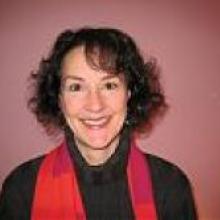
Adrienne Ward
Research Summary
Adrienne Ward received her Ph.D. in Italian from the University of Wisconsin-Madison. Her area of specialty is 17th- and 18th-century Italian literature, with a focus on theater production and culture. Her first book, Pagodas in Play: Representations of China in 18th-Century Italian Opera, was published by Bucknell University Press in 2010.
Prof. Ward has published several articles on Carlo Goldoni, as well as on Luisa Bergalli, and Fulvio Testi. She teaches courses on Italian theater, Italian comic traditions across genres and historical periods, Italian travel literature, and early modern gender and marriage culture. Her current research and teaching interests include the role and treatment of gender in Italian literary works of the early modern period, specifically intersections between matrimony and theater.
Education
Ph.D., University of Wisconsin-Madison
M.A., University of Wisconsin-Madison
B.A., University of Notre Dame
Publications
Books
Pagodas in Play: China on the Eighteenth-Century Italian Opera Stage (Bucknell University Press, 2010)
Selected Articles
"The Drama of Marriage in 18th-Century Venice: Carlo Goldoni's La locandiera." The Eighteenth Centuries (U.Va. Press, forthcoming).
"Il matrimonio segreto: Marriage Options in Venetian Comic Opera." Opera Libretti of the Eighteenth Century: Essays on the Libretto as Enlightenment Text, ed. Pamela Gay-White. Lewiston, NY: Mellen, 2015. 149-174.
“Le donne appassionte ed il genere della passione ne La sposa Persiana di Goldoni.” Problemi di critica goldoniana 16 (2009): 39-57.
“Goldoni and Cicisbeism.” Esperienze letterarie. Special issue on Carlo Goldoni. Eds. Franco Fido and Marco Santoro. XXXII: 3-4 (2007): 315-332.
Translation of letters from Philip Mazzei to Thomas Jefferson, others. The Papers of Thomas Jefferson: Retirement Series (Princeton: Princeton University Press), vol. 3 (2006), vols. 7, 9, forthcoming.
“Eastern Others on Western Pages: 18th-Century Literary Orientalism.” Blackwell Literature Compass (2004).
“The Price of Sonnets and Bonnets: How Gender Works in Luisa Bergalli’s Le avventure del poeta.” Italica 79 (2002): 168-188.
“‘Imaginary Imperialism:’ Goldoni Stages China in 18th-Century Italy.” Theatre Journal 54 (2002): 203-221.
Grants & Awards

Alison Weber
Research Summary
Alison Weber is Professor of Spanish, and she holds affiliate appointments in the Corcoran Department of History and the Program in Jewish Studies. Her expertise in Golden Age literatures, religious discourse, and women's writing in early modern Spain been widely recognized by colleagues and students. Her recent work examines eucharistic discourse and literary representations of the sacrament after transubstantiation, including polemics about what it meant to consume the divine in flesh and blood. She is especially interested in the relationship between early modern religious writing and sociocultural notions of religious and gender differences that are reflected in -- and produced by -- writers in the sixteenth centuries. She is the author of numerous monographs, including Teresa de Avila and the Rhetoric of Femininity (Princeton UP, 1990; reprinted in paperback in 1996 and translated into Italian in 1993); a critical edition of the Book for the Hour of Recreation: María de San José Salazar (trans. Amanda Powell, Chicago UP, 2002); Approaches to Teaching Teresa of Ávila and the Spanish Mystics (MLA, 2009); Devout Laywomen in the Early Modern World (Ashgate, 2016).
Education
Ph.D., University of Illinois, Urbana-Champaign (1975)
M.A., University of California, Berkeley (1970)
A.B., University of California, Berkeley (1969)
Selected Publications
Books
Devout Laywomen in the Early Modern World (Ashgate, 2016)
Approaches to Teaching Teresa of Ávila and the Spanish Mystics (MLA, 2009)
Book for the Hour of Recreation: María de San José Salazar (trans. Amanda Powell, Chicago UP, 2002)
Teresa de Avila and the Rhetoric of Femininity (Princeton UP, 1990; reprinted in paperback in 1996 and translated into Italian in 1993)
Articles
“Gender and Mysticism,” Cambridge Companion to Christian Mysticism, ed. Amy Hollywood and Patricia Beckman (Cambridge: Cambridge University Press, forthcoming).
The Literature of Women Religious in Early Modern Catholic Europe and the New World,” Ashgate Research Companion to Women and Gender in Early Modern Europe, ed. Allyson Poska and Jane Couchman (Hants: Ashgate, forthcoming).
“Los Jesuitas y las Carmelitas Descalzas: amistad, rivalidad, y recelos,” Francisco de Borja y su tiempo: Política, religión, y cultura en la edad moderna (Valencia-Rome: Institutum Historicum Societatis Iesu, 2011), 103-113.
“‘Golden Age’ or ‘Early Modern’”: What’s in a Name? Publications of the Modern Language Association of America 126:1 (2011): 225-232.
“Could Women Write Mystical Poetry?: The Literary Daughters of San Juan de la Cruz,” Tras el espejo la musa escribe. Studies on Women's Poetry of the Golden Age, ed. Julián Olivares (London: Tamesis, 2009), 185-201.
“Thomas Jefferson’s Quixotes.” Studies in Spanish Literature in Honor of Daniel Eisenberg, ed. Tom Lathrop (Newark: Juan de la Cuesta, 2009), 351-372
“El cervantismo norteamericano: liberalismo, posmodernismo, y pragmatismo,” U.S.A. Cervantes, ed. Georgina Dopico-Black and Francisco Layna (Madrid: Polifemo, 2009), 61-85.
“‘Little Angels’: Young Girls in the Discalced Carmelite Reform,” Female Monasticism in Early Modern Europe: An Interdisciplinary View, ed. Cordula van Wyhe (Hants: Ashgate, 2008), 211-225.
“Teresa di Jesu e i rapporti con i confessori,” Storia della direzione spirituale, III, L'età moderna, ed. Gabriella Zarri (Brescia: Morcelliana, 2008), 289-309.
“‘Mute Tongues Beget Understanding’: Recovering the Voice of María de San José.” Teaching Other Voices: Women and Religion in Early Modern Europe, ed. Margaret L. King and Albert Rabil, Jr. (Chicago: University of Chicago Press, 2007), 167-175.;
“El feminismo parcial de Ana de San Bartolomé,” El feminismo reivindicado: 1450-hoy, ed. Lisa Vollendorf (Madrid: Icaria, 2006), 77-94.
“Locating Holiness in Early Modern Spain: Convents, Caves, and Houses,” Attending to Early Modern Women: Structures and Subjectivities, ed. Joan Hartman and Adele Seeff (Newark: University of Delaware Press, 2007), 50-74.
“María de San José: Saint Teresa’s Difficult Daughter,” The Heirs of St. Teresa of Avila: Defenders and Disseminators of the Founding Mother’s Legacy, ed. Christopher Wilson (Washington, D.C.: ICS, 2006), 1-20.
“Teresa de Avila. La mística femenina,” Historia de las mujeres en España y América Latina, ed. Isabel Morant (Madrid: Cátedra, 2005), 2: 107-129.
“Dear Daughter: Reform and Persuasion in Saint Teresa’s Letters to her Prioresses.” Form and Persuasion in Women’s Informal Letters. 1500-1700, ed. Ann Crabb and Jane Couchman (Hants: Ashgate, 2005): 241-261.
“The Inquisitor, the Flesh, and the Devil: Alumbradismo and Demon Possession,” Dämonische Besessenheit. Zur Interpretation eines kulturhistorischen Phänomens, ed. Hans de Waardt et al. (Bielefeld: Verlag für Regionalgeschichte, 2005), 117-191.
“Autobiografías por mandato: ¿Ego-documents o textos sociales?” Cultura escrita y sociedad 1 (2005): 116-119.
“Lope de Vega’s Rimas sacras: Conversion, Clientage, and the Performance of Masculinity,” Publications of the Modern Language Association of America 120 (2005): 404-421.
“Religious Writing in Early Modern Spain,” The Cambridge History of Spanish Literature, ed. David T. Gies (Cambridge: Cambridge UP, 2004), 149-15.
“The Three Lives of the Vida: The Uses of Convent Autobiography,” Women and Texts and Authority in Early Modern Spain, ed. Marta Vicente (Hants: Ashgate, 2003), 107-125.
"Spiritual Administration: Gender and Discernment in the Carmelite Reform," Sixteenth Century Journal 31.1 (2000): 127-50.
Selected Grants & Awards
National Endowment for the Humanities Fellowship, Spring, 2005
Rome-University of Virginia Summer Fellowship (2002)
Research Associate in Women’s Studies in Religion, Harvard Divinity School (1998-99)
Member, Virginia Society of Fellows (1999-present)
Committee for Cultural Cooperation between Spain and United States Universities (1997)
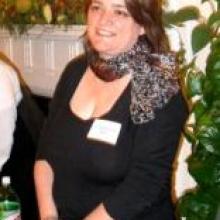
Liz Wellbeloved
Liz Wellbeloved-Stone has worked as the Assistant Director of the Hispanic Studies Program (UVa Valencia Program) since May 2000.
She moved from California to Charlottesville in 1980. Liz graduated from Charlottesville High School in 1983 and from UVA in December 1987 with a BA in Spanish.
Liz studied in Valencia with the Hispanic Studies Program for the academic year 1985-86. She married Rick Wellbeloved-Stone in October of 1987. They have two children, James and Claire.
To make an appointment with Ms. Wellbeloved-Stone, please contact her at the email address or phone number above, or visit her in the International Studies Office at:
208 Minor Hall (main ISO office)
Charlottesville, VA 22904
PO Box 400165
Charlottesville, VA 22904
Direct line: +1-434-924-7155
ISO Phone: +1-434-982-3010
ISO Fax: +1-434-982-3011
Location: See Map
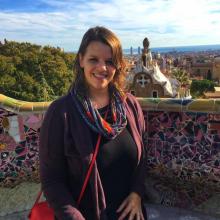
Rachel West
Rachel graduated from the University of South Florida with a Master's degree in Spanish. During her time at USF, she had the opportunity to study abroad in Buenos Aires, Argentina and Seville, Spain. After graduating, she spent a year living in Santiago de Compostela, Spain, where she worked as an English teacher. After spending time in both Argentina and Spain, she grew to appreciate both countries' cultures and ways of life, which has greatly influenced her research interests. Her research currently focuses on Jorge Luis Borges and his use of religion and metaphysics, although she is hoping to expand her research on metaphysics to authors from Spain and other countries. In her free time, she enjoys spending time with her dogs, Bella and Zanna, and her cat, Luci, as well as traveling as much as she can, especially to Spanish-speaking countries.
Education
Ph.D., Spanish, University of Virginia (expected 2024)
Dissertation Project: "Global Borges: Patrimony, Identity, and the World in Contemporary Hispanic Literature"
M.A., Spanish, University of South Florida, 2017
Master's Thesis: "'Ocurrió la unión con la divinidad, con el universo': La representación de la religión en los cuentos de Jorge Luis Borges."
B.A., Spanish, University of South Florida, 2015, summa cum laude
B.A., Psychology, with Honors, University of South Florida, 2015
Minor: Religious Studies
Research Interests
- Globalization, Identity, and Patrimony in 21st century Hispanic literatures
- The interesection between metaphysics and religion in Jorge Luis Borges' short stories
- Philosophical and metaphysical considerations in Latin American and Spanish fiction
- Politics, Aesthetics, and Literature
- Historical Memory
Publications
Peer-Reviewed Articles
West, Rachel. "As terras enfeitizadas: Silence, Landscape, and the Recuperation of Galician Historical Memory in Eloy Enciso's Longa noite". Hispanófila, 196, Fall 2022, pp. 185 - 203.
Book Reviews
Review of Una entrevista a Borges / An Interview with Borges, by Fabian Spagnoli. Translated by Jillian Tomm. Chasqui, forthcoming.
Teaching Experience
SPAN 3440, Survey of Latin American Literature (1900 - Present) (Fall 2023)
SPAN 3300, Texts and Interpretation (Spring 2022)
SPAN 3040, Business Spanish (Spring 2024)
SPAN 3010, Grammar and Composition I (Fall 2021)
SPAN 2010 & 2020, UVA in Valencia (Summer 2022)
SPAN 2020, Advanced Intermediate Spanish, University of Virginia (Spring 2019 - Spring 2020, Fall 2020 - Summer 2021)
SPAN 2010, Intermediate Spanish, University of Virginia (Fall 2018, Summer 2020)
SPAN 1060, Advanced Beginning Spanish (Summer 2023)
SPN 1120 and 1121, Spanish I and Spanish II, University of South Florida (Fall 2015 - Spring 2017)
Presentations
“An Infinite Return: The Borgesian Archive in Contemporary Hispanic Literature.” Modern Language Association Annual Convention. Philadelphia, PA, January 2024.
“Global Borges: The Borgesian Archive and Global Identity in Carlos Fonseca’s Coronel Lágrimas.” American Association of Teachers of Spanish and Portuguese Conference. Universidad de Salamanca, Salamanca, Spain, June 2023.
“Group Work and Learning Outcomes: Are Familiar Partners or Different Partners More Effective?”. Institute of World Languages Roundtable. University of Virginia, Charlottesville, VA, December 2018.
“‘Ocurrió la unión con la divinidad, con el universo’: La representación de la religión en los cuentos de Jorge Luis Borges”. WLE Research Colloquium. University of South Florida. Tampa, Florida, April 2017.
“Opresión, desaparición y asesinato: El gobierno totalitario en el cuento latinoamericano”. WLE Research Colloquium. University of South Florida. Tampa, Florida, April 2016.
“El concepto de la (des)humanización en Los pazos de Ulloa y ‘Mecanópolis’”. XVI Coloquio anual de literatura, lingüística y cultura hispanoamericanas y peninsulares. University of Central Florida, Orlando, Florida, March 2016.
Panels Organized
Chair and Organizer, “¿Es nuestro patrimonio el mundo? Borges in Contemporary Hispanic, Global Literature.” Modern Language Association Annual Convention, Philadelphia, PA, January 2024.
Awards
Honorable Mention, Graduate Student Day Competition, American Association of Teachers of Spanish and Portuguese Conference. Universidad de Salamanca, Salamanca, Spain, June 2023.
All-University Graduate Teaching Award, University of Virginia, April 2020.
Service
Del Greco Librarian, 2021 - present
Graduate Student Representative, 2020 - 2021
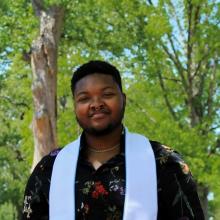
Kazara Xavier Williams
Education
Ph.D. Spanish, University of Virginia (in progress)
B.A. Hispanic Linguistics & Global Studies, UNC Chapel Hill (2022)
Research Interests
Latin American Literature & Culture
Literary Translation Studies
Gender & Sexuality Studies
Queer Literatur
Honors & Awards
Dean’s Doctoral Fellowship, University of Virginia (2020-2025)
Sara Young
Education
M.A., Foreign Languages, Cultures, and Literatures, concentration in Hispanic Studies, Virginia Polytechnic Institute and State University (2013)
M.A.T., concentration in Secondary Education (6-12), James Madison University (2009)
B.A., Modern Foreign Language, concentration in Spanish, minors in Pre-Professional Secondary Education and Teaching English as a Second Language, James Madison University (2008)
Teaching
University of Virginia (2016-Present)
- SPAN 2010: Intermediate Spanish
- SPAN 1060: Accelerated Elementary Spanish
- SPAN 1020: Elementary Spanish
Elon University (2014-2016)
- SPAN 122: Elementary Spanish II
- SPAN 124: Intensive Elementary Spanish I and II
- SPAN 121: Elementary Spanish I
Virginia Tech Language and Culture Institute (2014, 2016)
- RW 450: Reading and Writing 450
- GLS 350: Grammar, Listening, and Speaking 350
- GLS 150: Grammar, Listening, and Speaking 150
- Beginning Conversation Spanish (online)
Other Teaching Experience (2009-2011)
- High School Spanish Teacher: Spanish 1-AP
Service
Co-Creator, Club de corredores y caminantes, University of Virginia, 2023-Present
Faculty Advisor, College of Arts & Sciences, University of Virginia, 2023-Present
Creator, Free Spanish Tutoring Program (SPAN 1060-2020), University of Virginia, 2017-2023
https://uva.digication.com/spanish_tutoring_program
Faculty Advisor, Spanish Major Program, 2021-2023
Co-Organizer, ePortfolio Peer Consultant Program, University of Virginia, 2021-2022
Member, Search Committee for a Chinese Language Lecturer, University of Virginia, 2021
Member, Fall 2020 Planning Committee, University of Virginia, 2020
Faculty Advisor, Summer Orientation, University of Virginia, 2019
Selected Grants & Awards
Learning Technology Incubator Grant: “Volunteer Tutoring Program for Lower-Level Language Learning,” University of Virginia, 2018-2019

